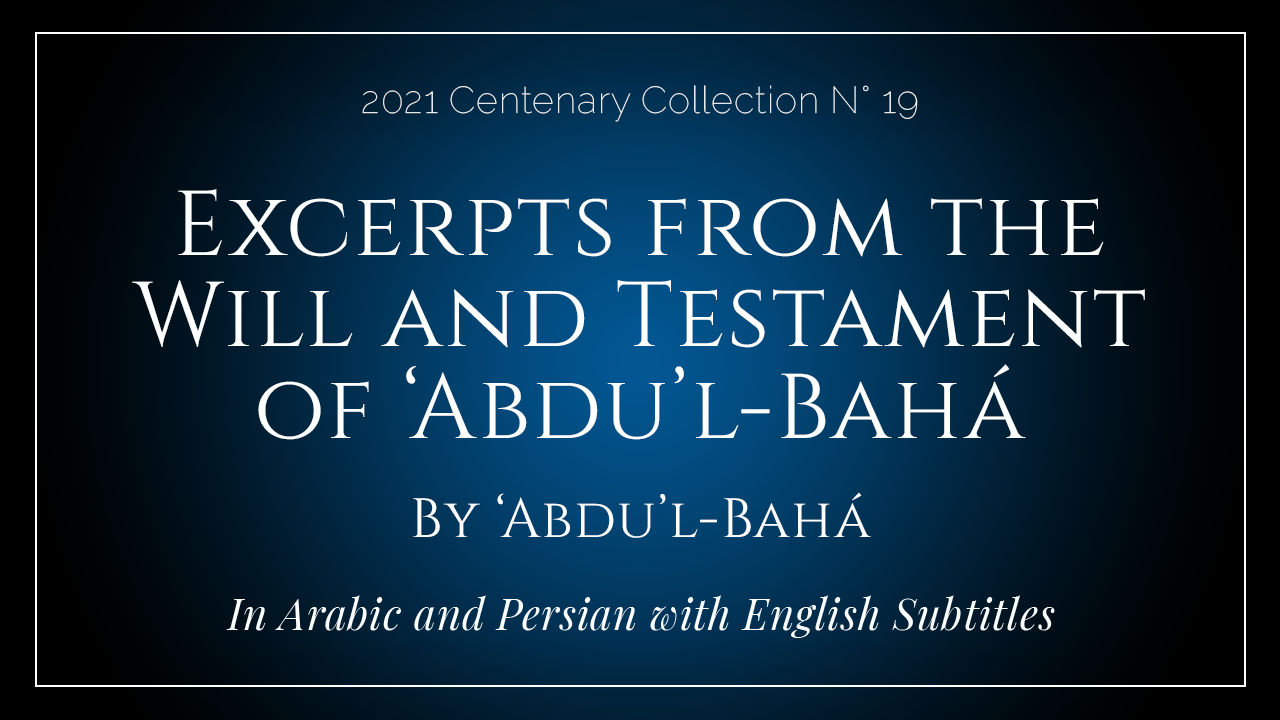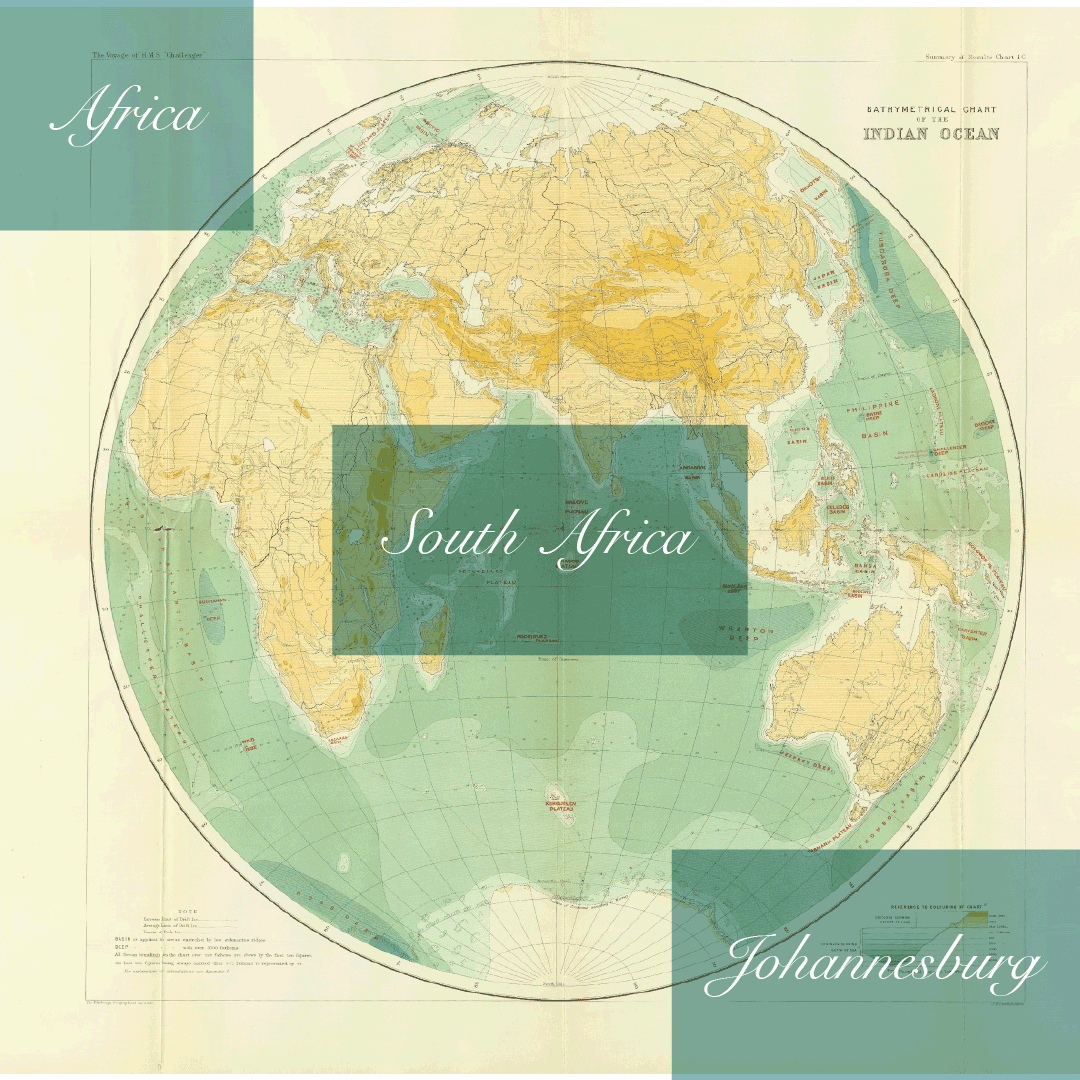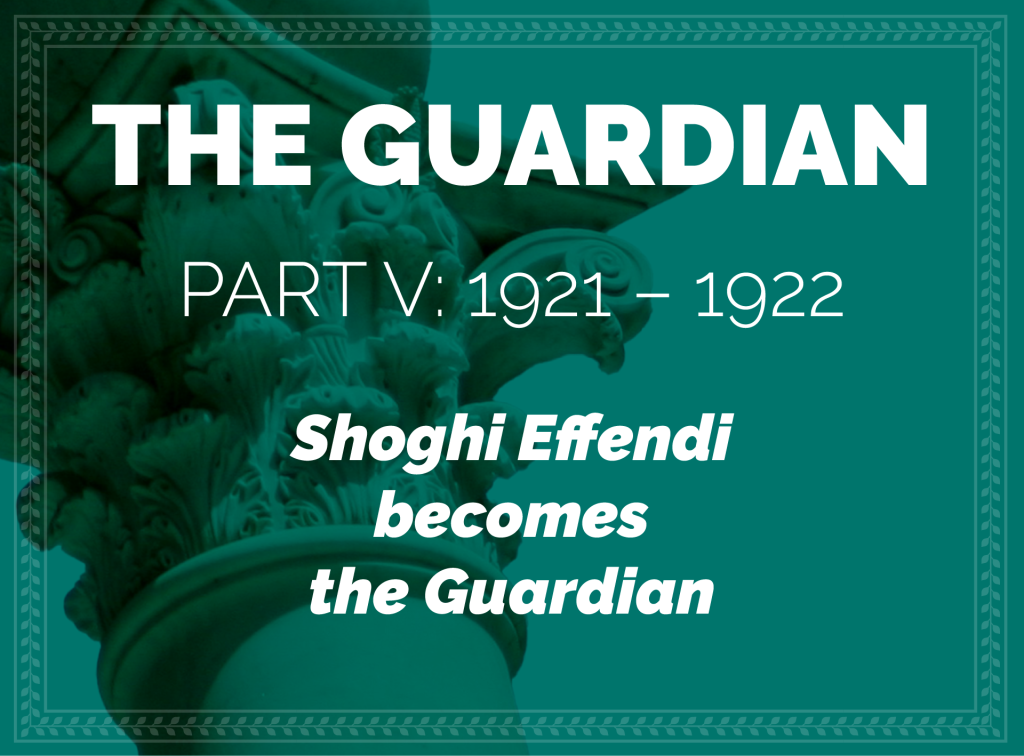
Written and illustrated by Violetta Zein
This part covers the life of Shoghi Effendi from the age of 24 in 1921 to the age of 25 in 1922.
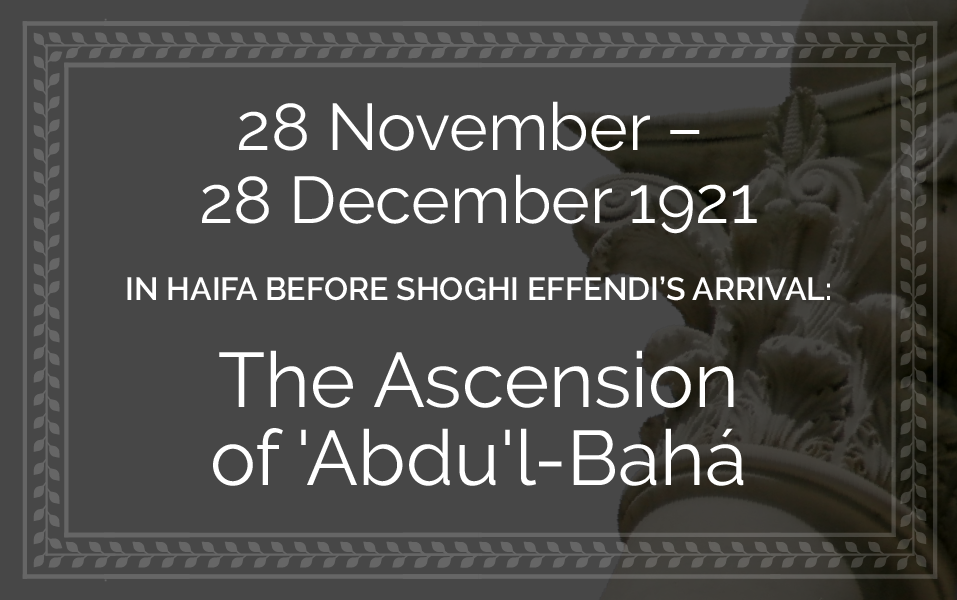
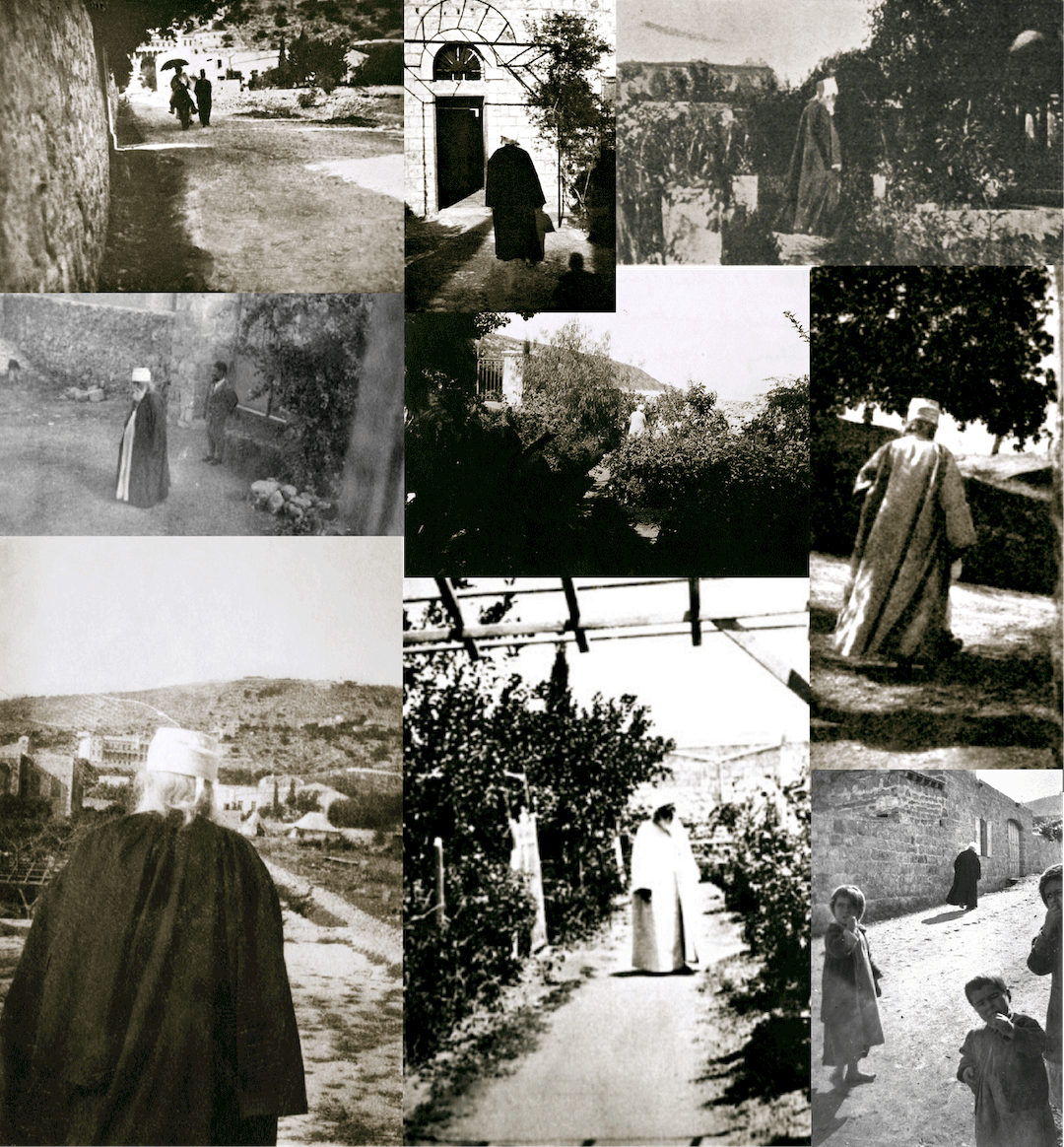
Collage of photographs of 'Abdu'l-Bahá shortly before His Ascension, showing the Master from a distance, in His gardens or walking away. Source: Violetta Zein, The Extraordinary Life of 'Abdu'l-Bahá: The illustrated chronology of the life of 'Abdu'l-Bahá Part 9: The Ascension of 'Abdu'l-Bahá.
For several years before His passing, and with increasing frequency as the end of His earthly life approached, ‘Abdu'l-Bahá made passing comments about His death, sometimes clear allusion, and at times more subtle references. Here are the most striking.
This story is the first one we were able to find where 'Abdu'l-Bahá alludes to His Passing 8 years prior in Haifa and quoted by Shoghi Effendi in God Passes By:
Remember, whether or not I be on earth, My presence will be with you always.
Recounting His premonitory dreams about His passing was one of the more subtlest ways 'Abdu'l-Bahá would speak about his passing, so subtle it raised absolutely no concern among the friends, it raised no suspicion that 'Abdu'l-Bahá was being serious. This is an example of a dream 'Abdu'l-Bahá recounted around the end of September 1921, two months before His Ascension, also found in God Passes By:
I seemed to be standing within a great mosque, in the inmost shrine, facing the Qiblih, in the place of the Imám himself. I became aware that a large number of people were flocking into the mosque…As I stood I raised loudly the call to prayer. Suddenly the thought came to Me to go forth from the mosque. When I found Myself outside I said within Myself: ‘For what reason came I forth, not having led the prayer? But it matters not; now that I have uttered the Call to prayer, the vast multitude will of themselves chant the prayer.’
It seems alarming that the Bahá'ís would not react when 'Abdu'l-Bahá uttered extremely clear warning signs that He knew He would soon die. In some cases the dreams He recounted were violent, in other cases, he literally said He was going to die. Around 1919, turned to a distinguished visitor of His, seated by Him in His garden, suddenly breaking the silence and said:
My work is now done upon this plane; it is time for me to pass on to the other world.
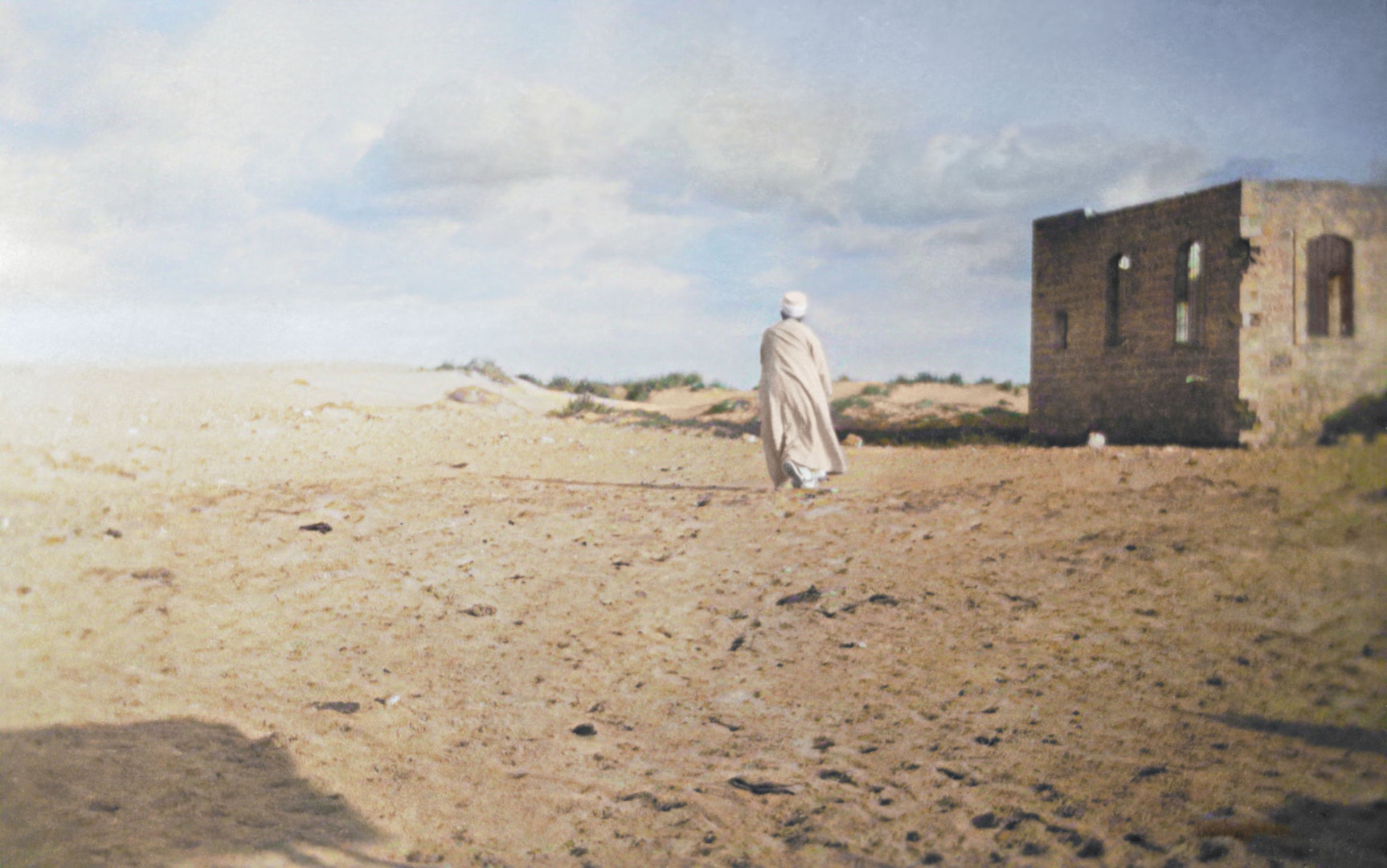
'Abdu'l-Bahá in the Holy Land, in the year or two prior to His Ascension. Source: Bahá'í Media Bank, © Bahá'í International Community 2023.
A few weeks before His passing, ‘Abdu’l-Bahá suddenly entered the room where Shoghi Effendi’s father was and said:
Cable Shoghi Effendi to return at once.
Shoghi Effendi’s mother, Ḍíyá‘íyyih Khánum, consulted with his grandmother, Munírih Khánum, and after consultation, the family decided that to send a cable would risk shocking Shoghi Effendi unnecessarily. They opted instead to write a letter conveying this message, to soften the blow.
When 'Abdu'l-Bahá had asked them to cable Shoghi Effendi, he was in perfect health. The family second-guessed 'Abdu'l-Bahá because they never dreamed He had only a few weeks left to live, and they all lost sight for a critical moment that 'Abdu'l-Bahá was always right and should always be categorically obeyed.
That letter arrived after ‘Abdu’l-Bahá had passed away.
Shoghi Effendi had been deprived of the bounty of seeing His beloved grandfather alive one last time. For the rest of his life, Shoghi Effendi would say, repeatedly, that he felt that if he had been able to see 'Abdu'l-Bahá before His Ascension, he was sure that the Mater would have given him special words of advice, given him instructions and provided him with comfort. But beyond this, he would have been able to gaze one last time upon the beloved face of the single most important person in his life.
Unwittingly, by not strictly obeying ‘Abdu'l-Bahá's directive, they caused Shoghi Effendi a lifelong pain.
This story goes a long way in explaining what Amatu’l-Bahá Rúḥíyyih Khánum calls “the sense of abandonment, of unworthiness, of passionate longing for his grandfather that assailed Shoghi Effendi so strongly during the early years of his Guardianship.”

This photograph of ‘Abdu'l-Bahá as one of the pallbearers of Mírzá Ḥasan Afnán, is one of the last photographs ever taken of the Master. a very grainy, and cropped version of this photograph was published in Star of the West Volume XII, number 18 on page 281. This copy was provided for the chronology courtesy of the National Bahá'í Archives of the United States, uncropped and in high-definition. The caption on the back of the photo reads: "The Master carrying the coffin of Mírzá Abu’l-Ḥasan Afnán on His shoulders. Photo taken by L.S.H. [Luṭfu’lláh Ḥakím, future member of the Universal House of Justice] ten days before the Master's Ascension.”
Ḥájí Mírzá ‘Abu’l Afnán was an eminent Bahá'í and a direct relative of the Báb. He was the son of Ḥájí Mírzá Abú'l-Qásim, the older brother of Khadíjih Bagum, the Báb’s wife. He had lived for a long time in Haifa, and on 19 November 1921, sensing 'Abdu'l-Bahá was about to die and not able to bear that pain, he committed suicide. He was buried the next day, 20 November 1921, after his body washed up on the shore of the Mediterranean and 'Abdu'l-Bahá was one of his pallbearers and walked, carrying his coffin aloft.
'Abdu'l-Bahá implored the friends not to harm themselves:
Should anyone at any time encounter hard and perplexing times, he must say to himself: This will soon pass. Then he will be calm and quiet.
Friday 25 November 1921 was a very busy day for the Master. 'Abdu'l-Bahá attended the last noonday prayer of His life at a Haifa Mosque, then had lunch with the pilgrims, and the last photograph of 'Abdu'l-Bahá was taken on this day. The last Tablet he dictated was to His beloved Bahá'ís of Stuttgart. 'Abdu'l-Bahá insisted on officiating the marriage of and he performed the marriage of Áqá Khusraw, the Burmese servant who had been at his side since he had been freed from slavery at the age of 6 and brought to the Holy Land by a Persian pilgrim. 'Abdu'l-Bahá had adopted him into His family.
On Saturday 26 November, 'Abdu'l-Bahá caught a fever which disappeared the next day, Sunday 27 November. The last visitor of the day was the head of the police, an Englishman, and 'Abdu'l-Bahá offered him a silk hand-woken handkerchiefs, then retired to bed at around 8:30 PM. 'Abdu'l-Bahá’s very last concern, five hours before His passing was for the friends: He asked about the health of every member of the Holy Family, all the pilgrims and the Bahá’í friends in Haifa, and when he was informed they were all in good health, the Master said:
Very good, very good.
Two of His daughters, Rúḥá and Munavvar Khánum, stayed with Him as 'Abdu'l-Bahá fell asleep very calmly, free of fever.
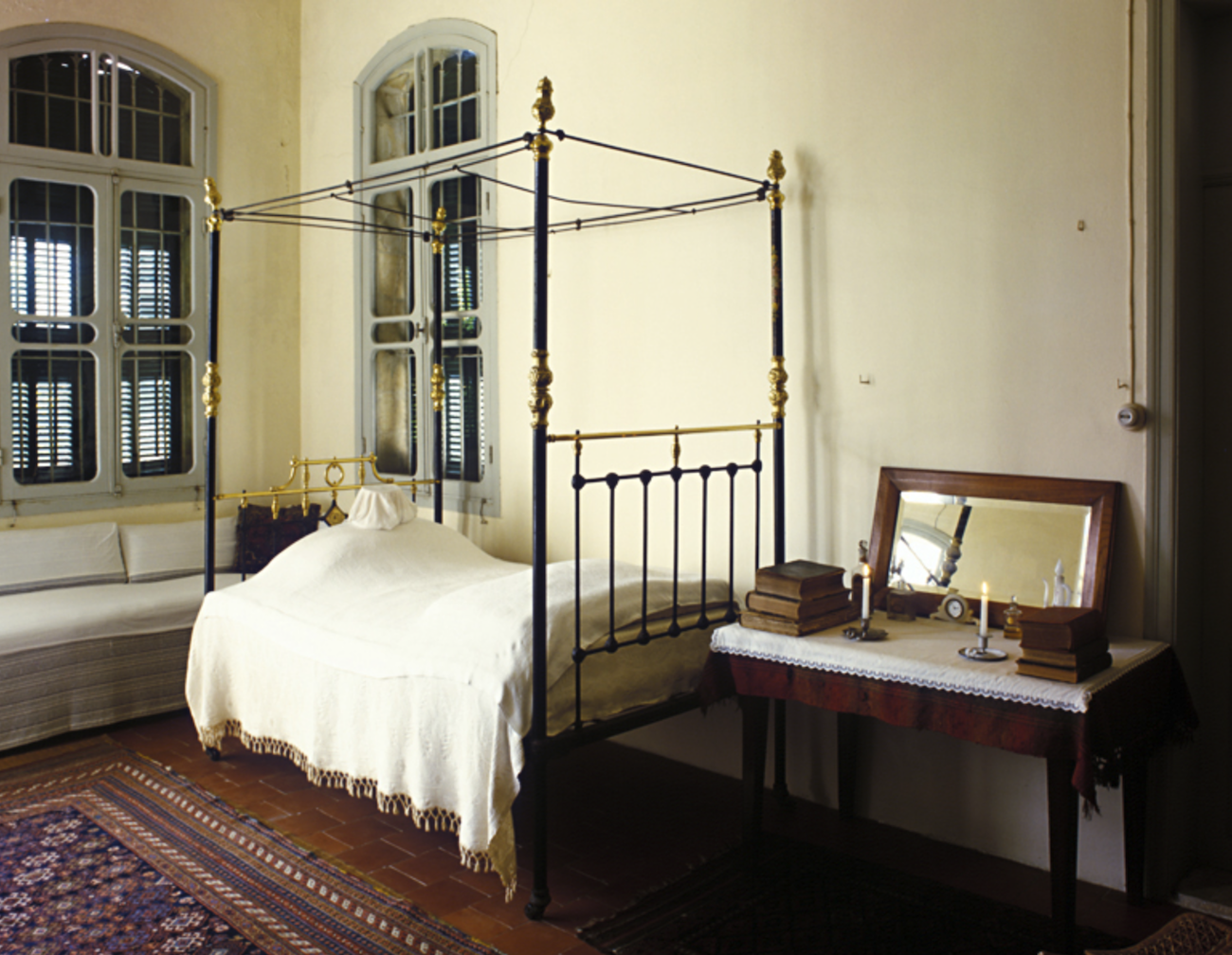
The bedroom of 'Abdu'l-Bahá in His house at 7 Haparsim in Haifa, where He passed away. Source: Baha'i Points of Interest.
'Abdu'l-Bahá awoke at 1.15 AM on Monday 28 November 1921, rose from his bed, walked across His room to a table and drank some water. He was too warm and removed an out layer of clothing, and returned to bed, then asked His daughter, Rúḥá Khánum to lift up the mosquito net, telling her:
I have difficulty in breathing, give me more air.
'Abdu'l-Bahá drank a little, and when his daughters offered Him food, He responded in a clear voice, and giving them a beautiful look:
You wish me to take some food, and I am going?
Less than a minute later, 'Abdu'l-Bahá had passed away peacefully. His face was so beautiful, so calm and serene that, for a moment, His daughters thought He had just simply fallen asleep.
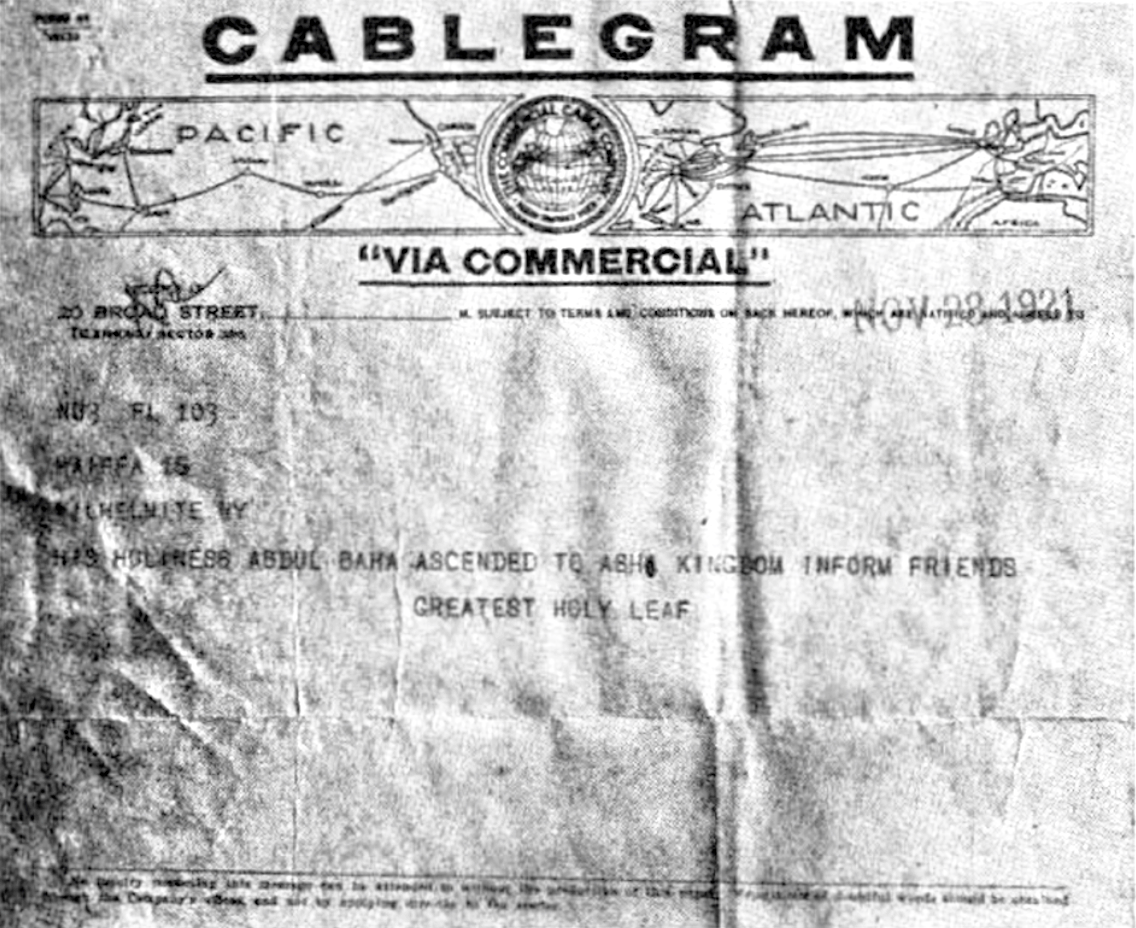
The cablegram sent by the Greatest Holy Leaf to the Bahá'ís of the world on 28 November 1921, reproduced in facsimile in Star of the West’s Special Ascension Edition, Volume 12, Number 15.
Everything now rested on the Greatest Holy Leaf’s shoulders. She was Head of the Faith until Shoghi Effendi arrived, and she had to make all the decisions. She had to, keep the Bahá'í Faith safe until the arrival of Shoghi Effendi, and make all the decisions for the funeral, burial, burial place.
But first thing she had to do was to announce 'Abdu'l-Bahá’s Ascension to the entire Bahá'í World.
The cable every Bahá'í community in the West received from Bahíyyih Khánum, the Greatest Holy Leaf on 29 December 1921 read simply:
His Holiness Abdul-Baha ascended to Abhá Kingdom.
This was the cable Shoghi Effendi saw in Major Tudor Pole’s office which caused him to faint. He had learned of his own Grandfather’s passing after most Bahá'ís, and in the exact same unceremonious manner.
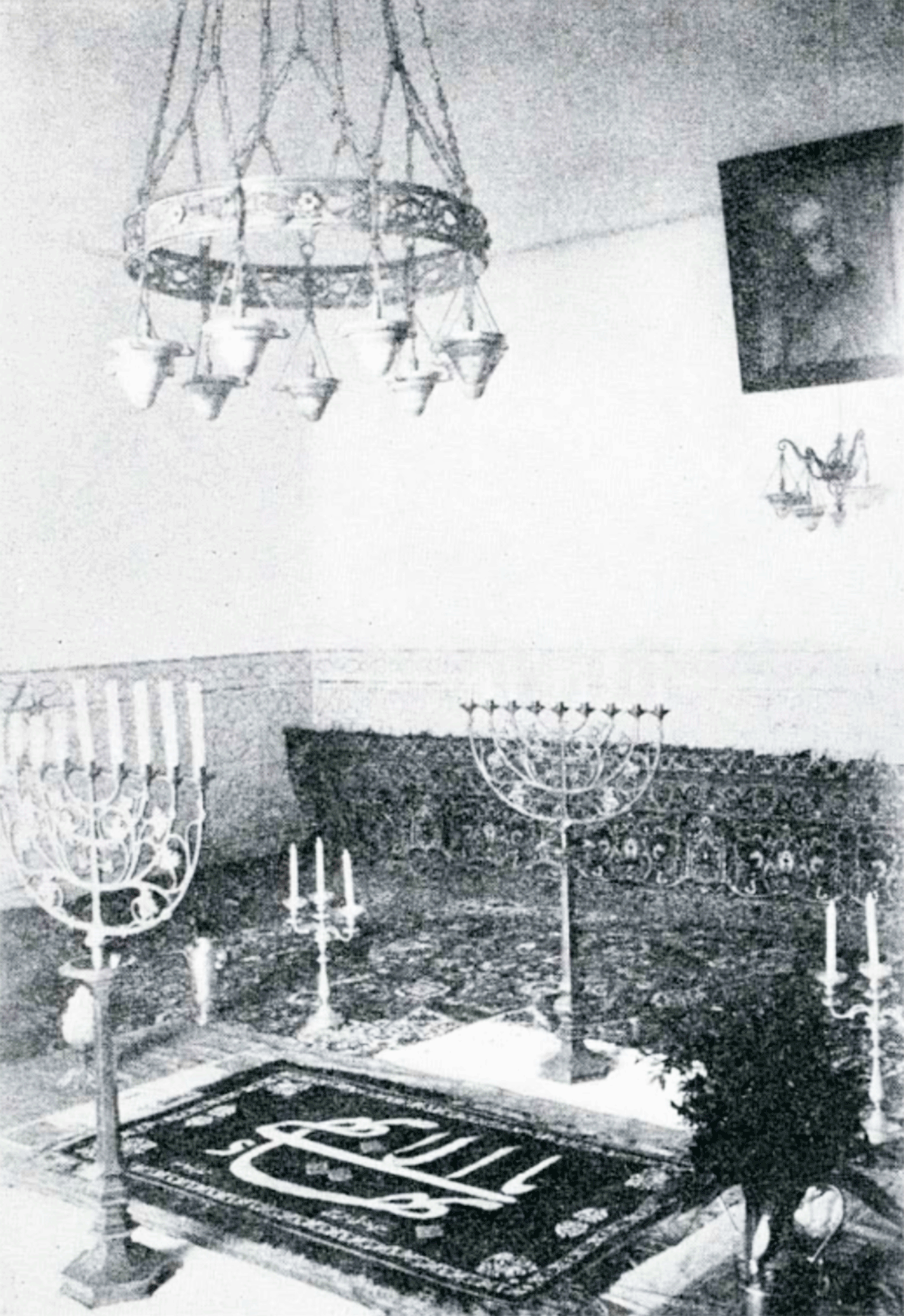
The interior of the Shrine of ‘Abdu’l-Bahá on Mount Carmel. Source: The Bahá’í World. Vol 3, page 22.
When the Greatest Holy Leaf was looking for the most befitting place to inter 'Abdu'l-Bahá, ‘Abbás-Qulí, the custodian of the Shrine of the Báb approached her and told her a 12-year-old story, dating back to 21 March 1909, when he had been alone with 'Abdu'l-Bahá after the Master had finally interred the remains of the Báb in the vault beneath the Shrine.
After 'Abdu'l-Bahá had accomplishes His historic task, He stepped from the vault into a passageway, ordered the door to the vault with the sarcophagus containing the remains of the Báb to be closed, and told ‘Abbás-Qulí, pointing to the passageway leading to an empty vault immediately next to Báb’s:
And this should be a place for Us.
The Greatest Holy Leaf had found the place to inter her beloved saintly Brother. She told ‘Abbás-Qulí before blessing him for his help:
Very well. This is where it will be.
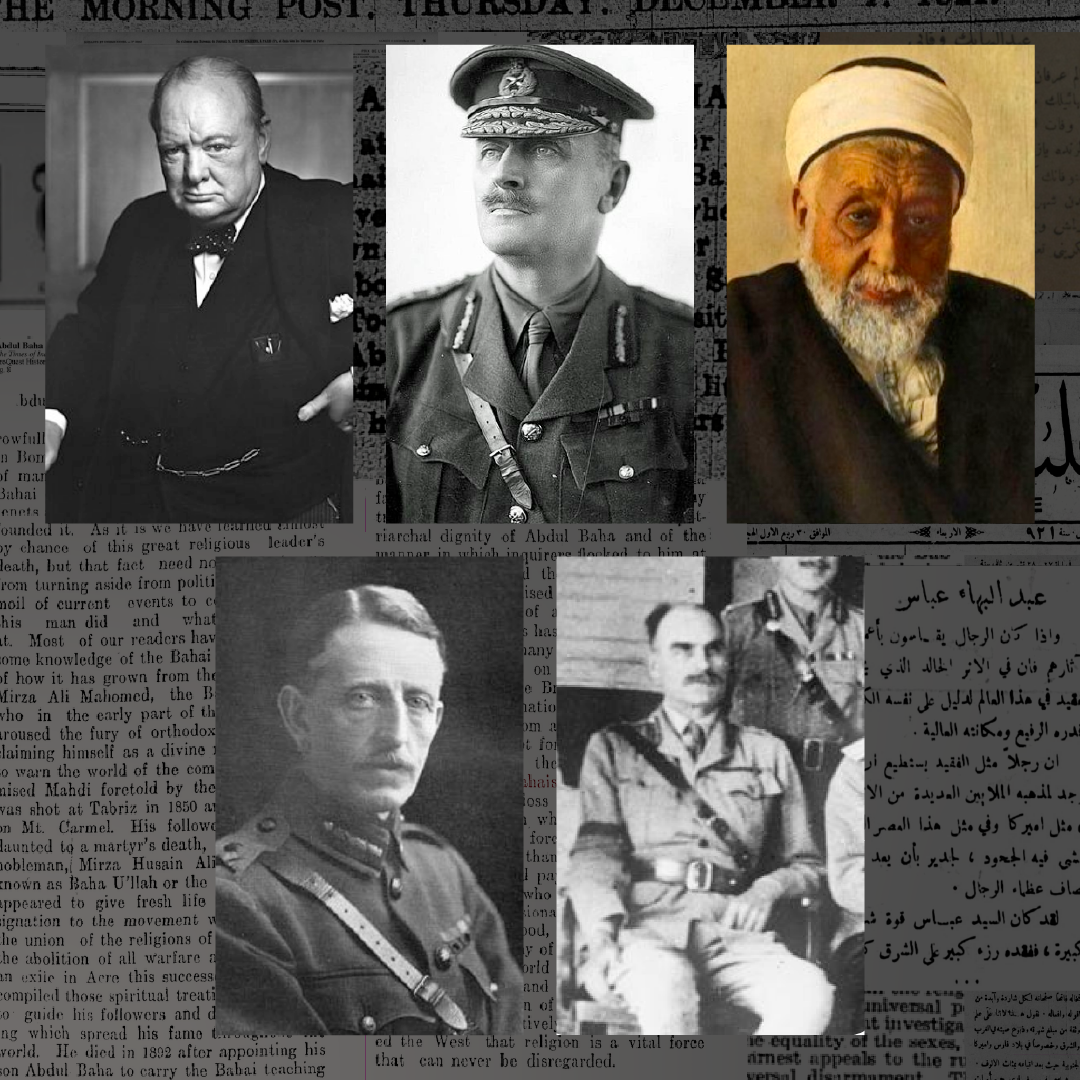
Photomontage of eminent personalities who sent condolence messages for the passing of 'Abdu'l-Bahá. Top row, left to right: Sir Winston Churchill ( Wikimedia Commons), Viscount Edmund Allenby (Wikimedia Commons), and Abd Al-Rahman Al Gailani (Wikimedia Commons). Bottom row: General Sir Walter Norris Congreve (Royal Green Jackets Museum) and Sir Arthur Money (The Imperial War Museums).
Hundreds of condolence messages poured in from the entire world, not just the Bahá'í community.
Sir Winston Churchill, the British Secretary of State for the Colonies immediately telegraphed Sir Herbert Samuel, the High Commissioner for Palestine, Sir Herbert Samuel, and instructed him to “convey to the Bahá’í Community, on behalf of His Majesty’s Government, their sympathy and condolence.”
Viscount Allenby, the High Commissioner for Egypt also wired Sir Herbert Samuel asking him to “convey to the relatives of the late Sir ‘Abdu’l‑Bahá ‘Abbás Effendi and to the Bahá’í Community...sincere sympathy in the loss of their revered leader.”
Others who expressed condolences were General Sir Walter Norris Congreve, the Commander-in-Chief of the Egyptian Expeditionary Force, and General Sir Arthur Money, former Chief Administrator of Palestine.
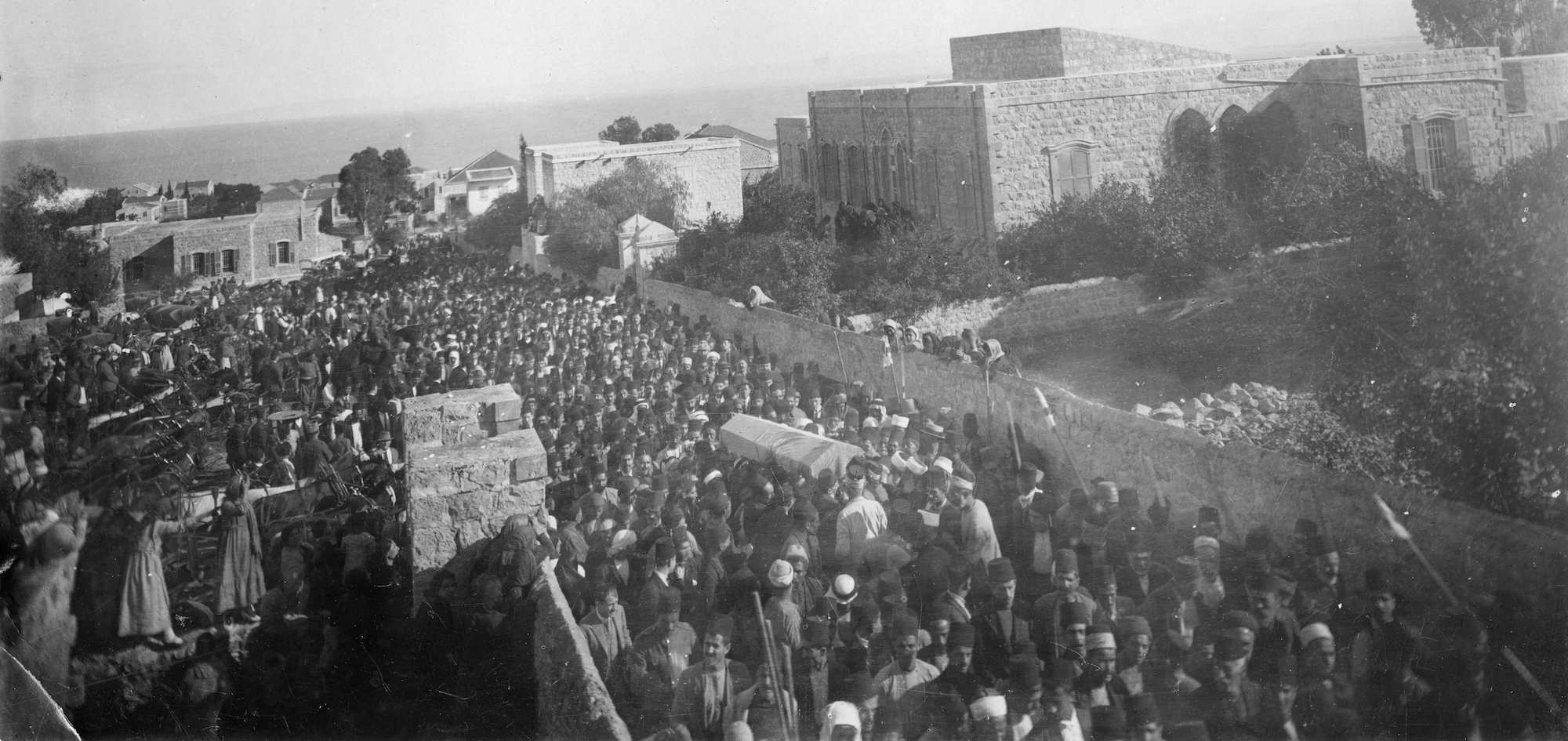
The funeral cortege of 'Abdu'l-Bahá, His casket carried aloft by pallbearers. Souce: © United States National Bahá'í Archives, used with permission.
The British Commissioner for Palestine and the Mufti of Haifa, along with other notables arrived for the funeral procession.
By 7 in the morning, on Tuesday 29 November 1921, Haifa was at a virtual standstill. The news of 'Abdu'l-Bahá's passing has shocked the city and its people, and soldiers lined both sides of Haparsim Street, some even stationed in the courtyard of the Master's house, standing guard.
'Abdu'l-Bahá's body is placed in a plain, white wood casket and the coffin was covered in a simple paisley shawl. At 9 AM, the funeral cortège left. Haparsim, and wound its way through Haifa streets until it arrived at the Shrine of the Báb, a distance of 1.5 kilometers, with Boy Scouts keeping the crowd of 10,000 people in an orderly procession.
Sir Ronald Storrs, Governor of Jerusalem was deeply moved by the funeral and said:
I have never known a more united expression of regret and respect than was called forth by the utter simplicity of the ceremony.
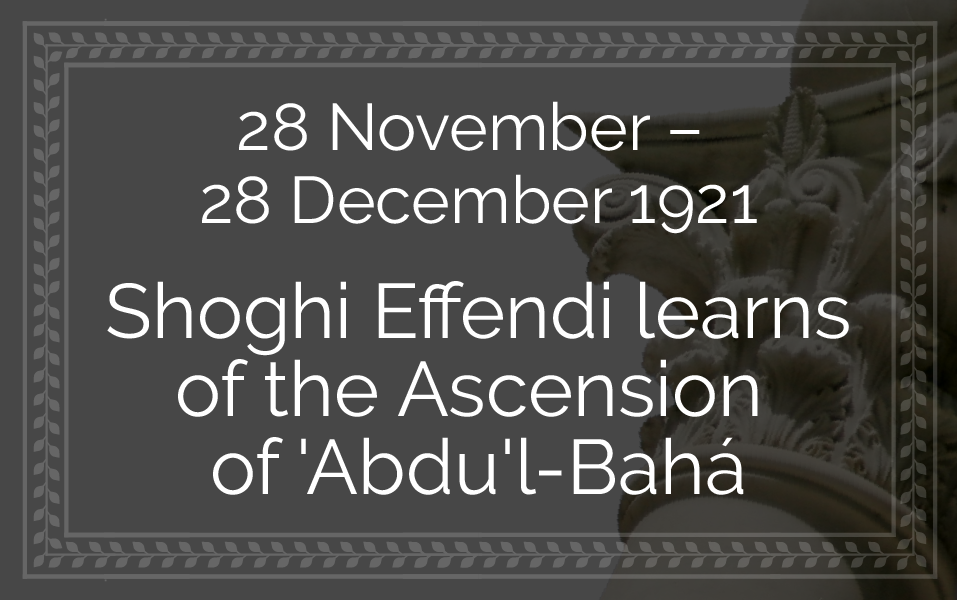
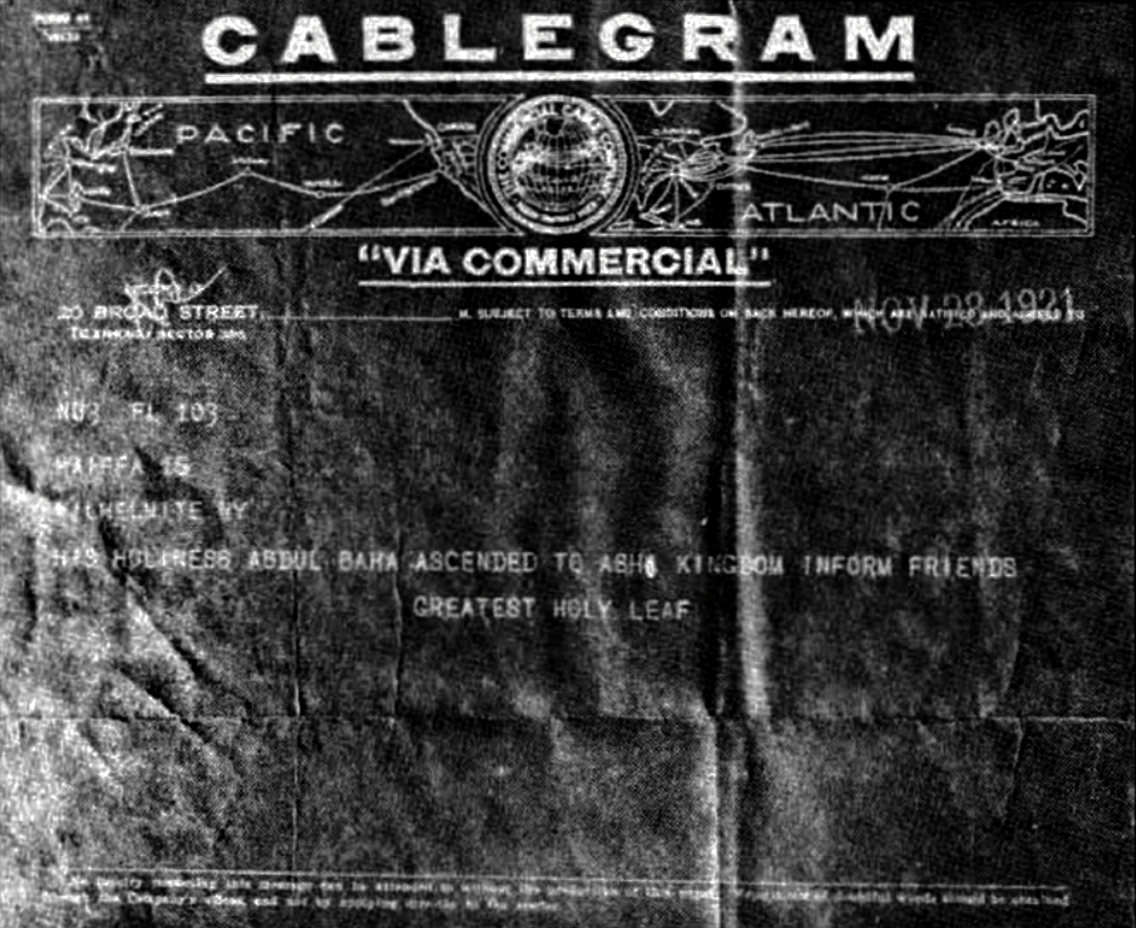
The failure of ‘Abdu'l-Bahá's family to instantly obey the Master's request and cable Shoghi Effendi to return home weeks before His passing had a catastrophic effect on 24-year old Shoghi Effendi, for whom 'Abdu'l-Bahá was the sun around which he revolved. Words will always fail human understanding to describe the love that Shoghi Effendi felt for 'Abdu'l-Bahá.
In the 1920s, the address of Major Wellesley Tudor Pole, in London, was often used as the distributing point for cables and letters from 'Abdu'l-Bahá and the Holy Land to the British Bahá'ís, and Shoghi Effendi, whenever he traveled to London from Oxford, always called in on Major Tudor Pole. On 29 November 1921 at 9:30 in the morning, Major Tudor Pole received the following heartbreaking cable:
His Holiness 'Abdu'l-Bahá ascended Abhá Kingdom. Inform friends. Greatest Holy Leaf.
Major Tudor Pole immediately notified the British friends by cable, by phone and by letter, and he must have called Shoghi Effendi and asked him to come to his office, in order to break the news to him as gently as humanly possible and in person.
Shoghi Effendi was not one who could be informed of this devastating blow by cable, phone or letter. It would have been too much of a shock. By noon, Shoghi Effendi had already arrived in London and entered Major Tudor Pole’s office at 61 St James' Street. He was shown into the Major’s office, where Tudor Pole was absent, and this is when Shoghi Effendi received the biggest blow of his entire life.
He was standing at Major Tudor Pole’s desk and his eye fell on the word “'Abdu'l-Bahá” in an open cablegram that was lying on the Major’s desk.
Shoghi Effendi read the cable and discovered the devastating news alone, not like the grandson of the Master, but like every other Bahá'í in the world. He read it in a cable.
Major Tudor Pole entered his office just a moment later and to his horror, he found that Shoghi Effendi had collapsed, dazed and bewildered by this catastrophic news.
In a state of shock, Shoghi Effendi was taken to the home of a Miss Grand, one of the Bahá'ís in London and he was put to bed in her home for a few days, as he began the long process of recovering from the greatest tragedy of his life.
Shoghi Effendi’s sister Rúhangiz, Lady Blomfield and several other British Bahá'ís, did everything they could to try and comfort him, but he was utterly grief-stricken.
For several days, Shoghi Effendi was unable to move.
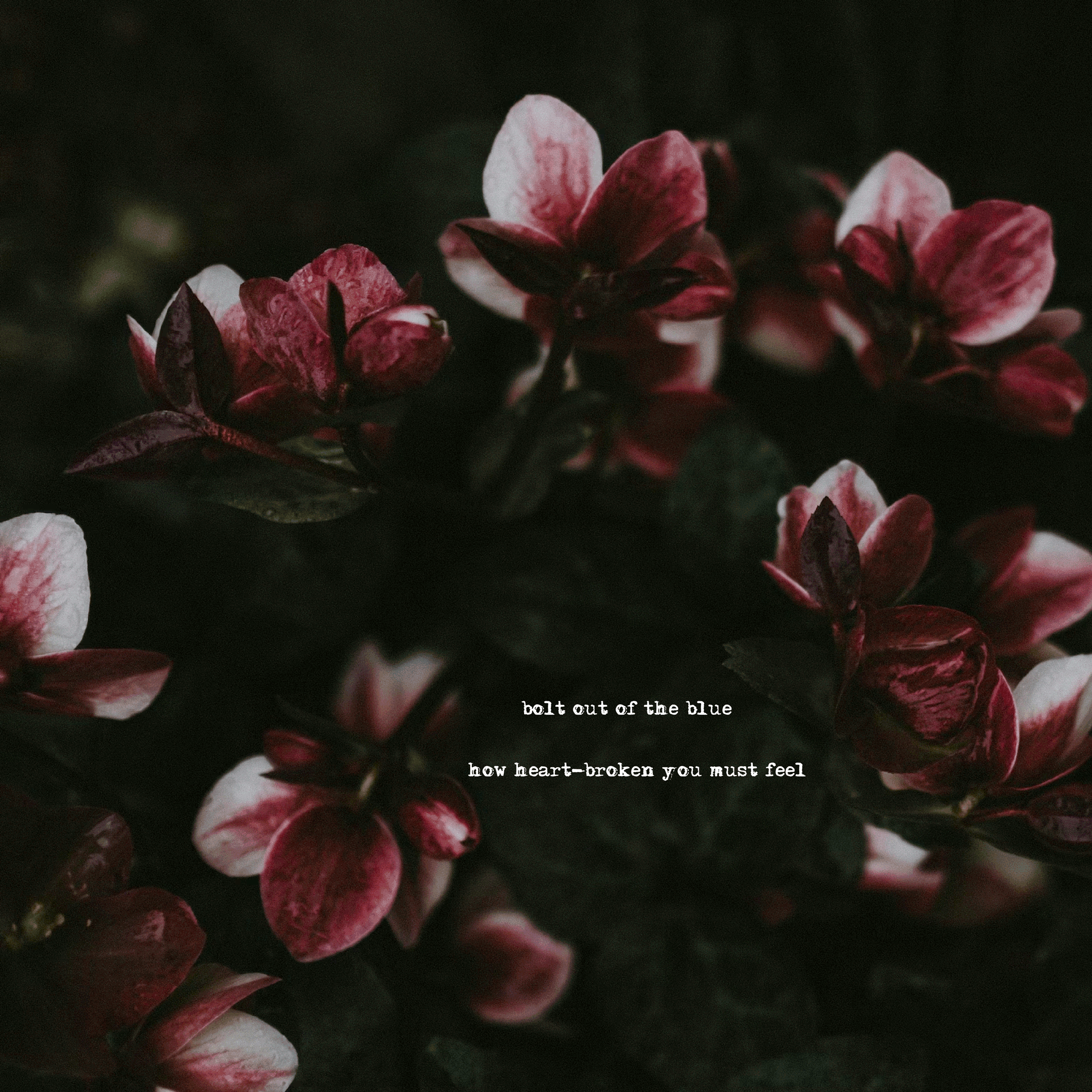
Letter from Esslemont: “bolt out of the blue…how heart-broken you must feel…” Background photo by Annie Spratt on Unsplash.
The friendship between Dr. Esslemont and Shoghi Effendi was a deep one. As soon as Dr. Esslemont heard of 'Abdu'l-Bahá’s passing, his first thought was for his young friend and he wrote him a deeply sensitive and moving letter:
Dearest Shoghi,
It was indeed a "bolt from the blue" when I got Tudor Pole's wire this morning: "Master passed on peacefully Haifa yesterday morning"...
It must be very hard for you, away from your family and even away from all Bahá'í friends.
What will you do now? I suppose you will go back to Haifa as soon as possible.
Meantime you are most welcome to come here for a few days...Just send me a wire...and I shall have a room ready for you...if I can be of any help to you in any way I shall be so glad.
I can well imagine how heart-broken you must feel and how you must long to be at home and what a terrible blank you must feel in your life...Christ was closer to His loved ones after His ascension than before, and so I pray it may be with the beloved and ourselves.
We must do our part to shoulder the responsibility of the Cause and His Spirit and Power will be with us and in us.
Shoghi Effendi accepted Dr. Esslemont’s invitation and he spent a few days with his close friend in Bournemouth before beginning preparations to return to Haifa.
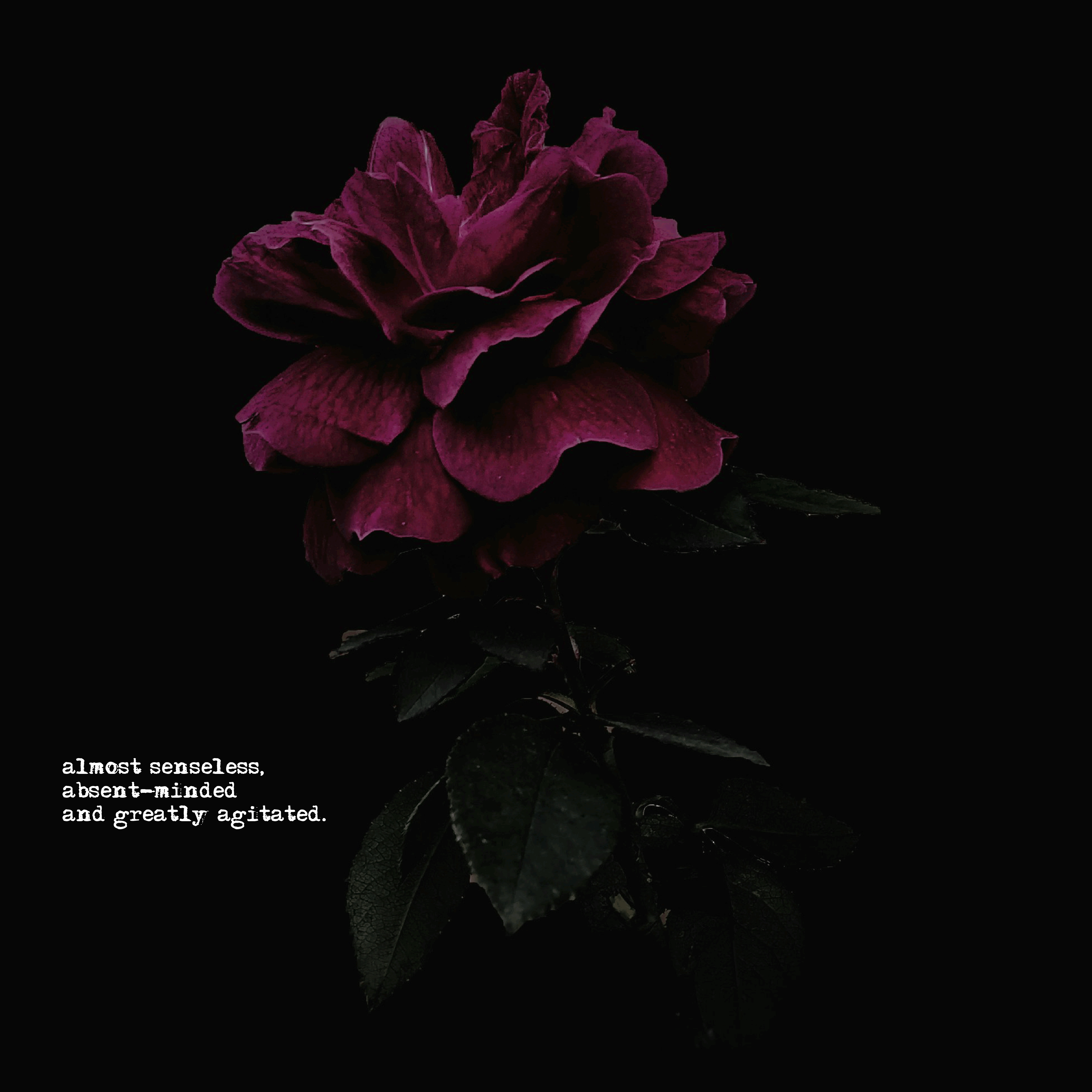
“almost senseless, absent-minded and greatly agitated.” Background photo by Salman Khan on Unsplash.
When Dr. Luṭfu’lláh Ḥakím visited Shoghi Effendi, two days after the Ascension of 'Abdu'l-Bahá, he found him in bed, absolutely overcome with grief.
Shoghi Effendi was utterly overwhelmed with loss, unable to eat, or sleep. He was, in his own words, overwhelmed in body and mind by the terrible news, and laid in bed for a couple of days, “almost senseless, absent-minded and greatly agitated.”
During Dr. Luṭfu’lláh Ḥakím ’s visit, Shoghi Effendi recovered slightly, enough to translate and chant the last Tablet he had received from his Grandfather for his host, Miss Grand, Dr. Luṭfu’lláh Ḥakím , Lady Blomfield and two other Bahá'ís.
Together the friends made plans for Shoghi Effendi’s travel to Haifa with Lady Blomfield and his sister Rúhangiz.
Dr. Luṭfu’lláh Ḥakím accompanied him that afternoon to Bournemouth, an important change of scenery from London, where Shoghi Effendi had received the life-altering shock, and where he would rest and recuperate while preparations were underway for his journey to the Holy Land.
Shoghi Effendi would stay with Dr. Esslemont between December 2 and 7 until he received a cable from his great-aunt, the Greatest Holy Leaf, asking him to return to Haifa.
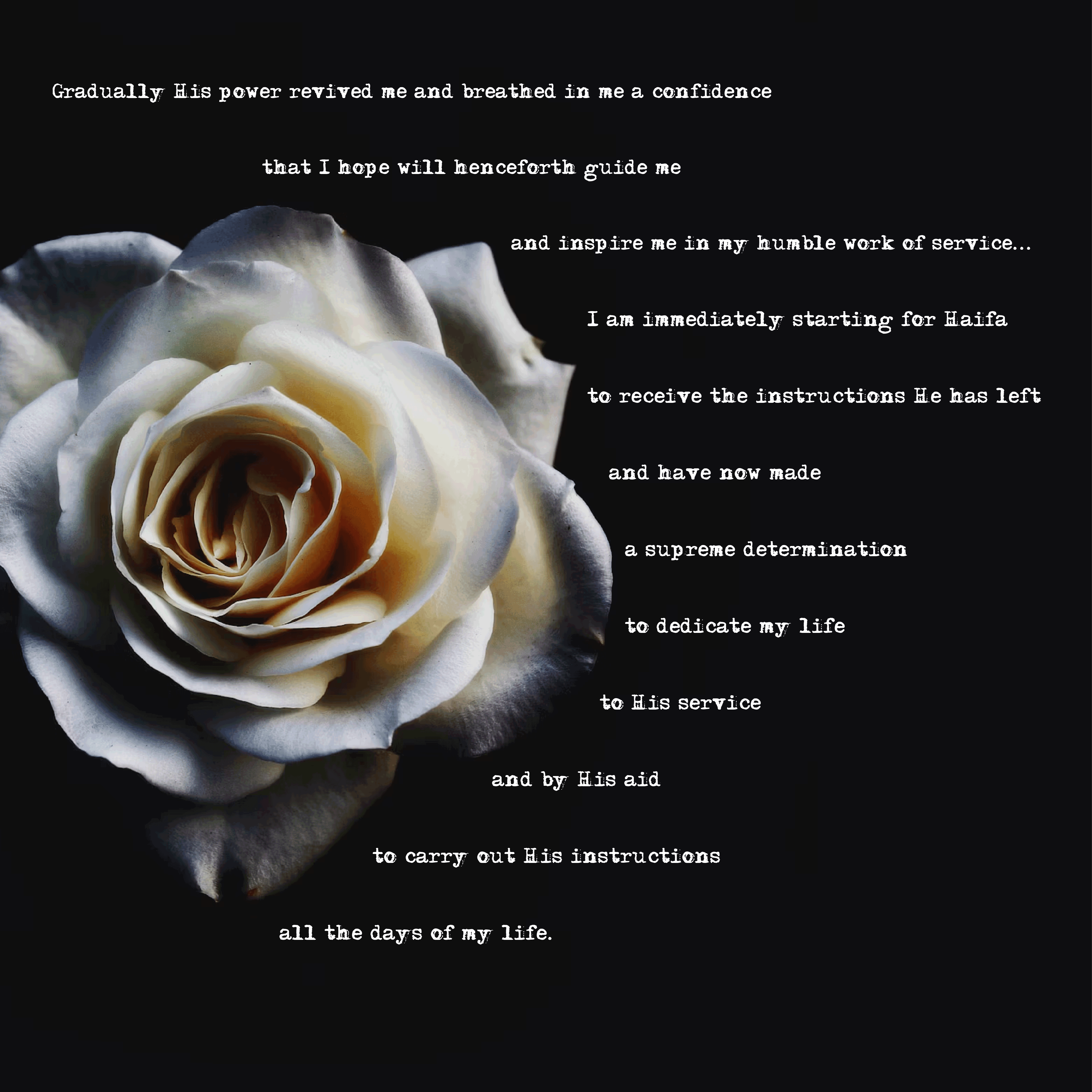
“Gradually His power revived me and breathed in me a confidence that I hope will henceforth guide me and inspire me in my humble work of service... I am immediately starting for Haifa to receive the instructions He has left and have now made a supreme determination to dedicate my life to His service and by His aid to carry out His instructions all the days of my life.” Background Photo by Sebastian Molina fotografía on Unsplash.
In an undated letter he wrote between 2 and 7 December 1921 in Bournemouth, Shoghi Effendi writes astonishing words about the passing of 'Abdu'l-Bahá and its implications for the ushering in of a new era for the Bahá'í Faith, as well as his enduring connection with 'Abdu'l-Bahá beyond this plane and into the Abhá Kingdom:
Gradually His power revived me and breathed in me a confidence that I hope will henceforth guide me and inspire me in my humble work of service.
The day had to come, but how sudden and unexpected.
The fact however that His Cause has created so many and such beautiful souls all over the world is a sure guarantee that it will live and prosper and ere long will compass the world! I am immediately starting for Haifa to receive the instructions He has left and have now made a supreme determination to dedicate my life to His service and by His aid to carry out His instructions all the days of my life.
…The stir which is now aroused in the Bahá'í world is an impetus to this Cause and will awaken every faithful soul to shoulder the responsibilities which the Master has now placed upon every one of us.
The Holy Land will remain the focal centre of the Bahá'í world; a new era will now come upon it. The Master in His great vision has consolidated His work and His spirit assures me that its results will soon be made manifest.
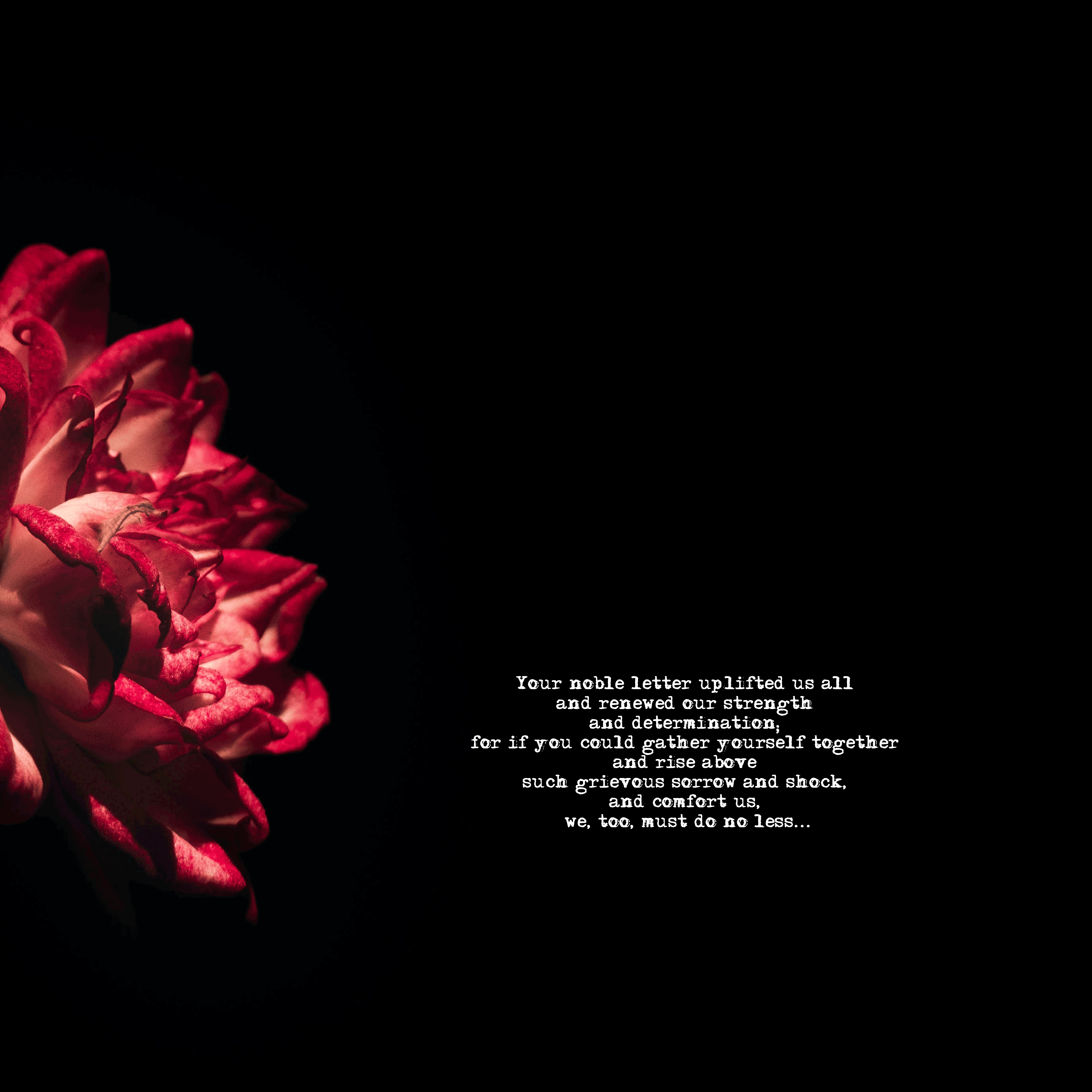
“Your noble letter uplifted us all and renewed our strength and determination; for if you could gather yourself together and rise above such grievous sorrow and shock, and comfort us, we, too, must do no less...” Background photo from Taylor Lastovich on Pexels.
In the midst of this emotional devastation, while he was recuperating in Bournemouth with Dr. Esslemont, the tender-hearted Shoghi Effendi still found time to offer love and comfort to other grieving souls, just as his Grandfather would have done.
Reeling with crushing grief and insurmountable spiritual anguish, Shoghi Effendi still found meaningful ways to comfort his Manchester friends who were devastated by the loss of 'Abdu'l-Bahá, something evident in this letter which his dear friend Edward Hall wrote to him on 5 December 1921, barely a week after the Ascension of 'Abdu'l-Bahá. Shoghi Effendi had managed to soothe the hearts of his friends, while his would remain broken forever, and his love to them gave them courage and strength:
Your loving, tender and noble letter, full of encouragement and fortitude came when we were very sad but resolute, very shocked but thoroughly understanding; and it turned the tide of our feelings into a flood-tide of peace and patience in the Will of God…Your noble letter uplifted us all and renewed our strength and determination; for if you could gather yourself together and rise above such grievous sorrow and shock, and comfort us, we, too, must do no less; but arise and serve the Cause which is our Mother.
In closing his letter, Edward Hall gives profound expression to his love, and the Manchester Bahá'í community’s love for Shoghi Effendi, offering him their love as he set out on his last journey before he became Guardian of the Cause—at this point, no one knew what was in store for the Faith’s next, glorious chapter:
I know you have a thousand things to see to ere you start for the Holy Land, But we all love you dearly and we are all united and stronger than ever. Go with our love and sympathy and all our hearts to that Hallowed Spot, for we are one with you always.
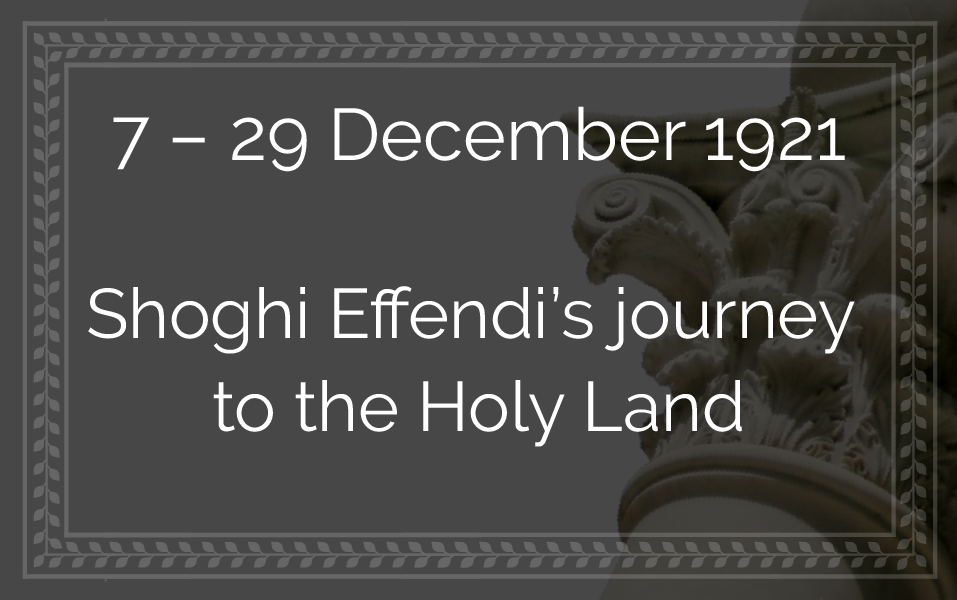

London in 1921. Unknown photographer. Source: Wikimedia Commons.
Shoghi Effendi was deeply sad and overcome with grief, but pressed on courageously, returning to London on 8 December 1921, after spending five days with his close friend, Dr. Esslemont in Bournemouth, to try and book an earlier passage to the Holy Land. He had just received a telegram from the Greatest Holy Leaf dated 7 December 1921, urging him to travel as soon as he could and he was looking for the fastest way to get to Haifa.
At a meeting of the friends in Miss Grant’s apartment on 8 December 1921, where they were bidding farewell to Shoghi Effendi, still wearing his overcoat, although the room was heated. The friends asked him if he would not like to remove it, but Shoghi Effendi replied that when he had left the Holy Land for England, his Grandfather and told him to always wear it in winter.
Unfortunately, Shoghi Effendi was not able to leave England when he had planned.
There were issues with his passport that took some time to resolve, and he was only able to leave 8 days later, on 16 December 1921.

A 1921 passenger liner, the RMS Berengaria, a ship of the Cunard line. This ship was a transatlantic steamer, and much larger than the ship that brought Shoghi Effendi to Egypt from England, but it was so beautiful that this author could not resist using the image. Source: Wikimedia Commons.
Shoghi Effendi’s departure from England was delayed because of passport complications.
On 16 December 1921, 18 days after the Ascension of 'Abdu'l-Bahá, Shoghi Effendi finally set sail for the Holy Land accompanied by Lady Blomfield and his sister Rúhangiz.
Their boat docked in Egypt.

East Haifa train station in 1931. Source: Wikimedia Commons.
Shoghi Effendi arrived in Haifa by train from Egypt at 5.20 P.M. on 29 December 1921, exactly one month after the Ascension of 'Abdu'l-Bahá, where he was welcomed by many Bahá'í friends. The agony of bereavement had taken its toll on Shoghi Effendi and he was broken by grief, so frail that he had to be helped up the stairs of the Master's house upon his arrival.
Louise Bosch was in the tea room of the Master’s House alone, at the time everyone—the Holy Family and the Bahá'ís— was expecting Shoghi Effendi to arrive at any minute. Suddenly, Louise heard footsteps. It was Shoghi Effendi coming in, and as he entered, he gave out a loud, indescribable cry of the greatest grief, the greatest pain, the greatest ache.
Inside 'Abdu'l-Bahá’s home, was the only person in the world who could in any way comfort Shoghi Effendi: his beloved great-aunt, the sister of 'Abdu'l-Bahá. Bahíyyih Khánum, the Greatest Holy Leaf, so slight in appearance and so modest in character, had been the rock of the whole family in the month since 'Abdu'l-Bahá’s passing.
Shoghi Effendi was so devastated by ‘Abdu'l-Bahá's absence from His home that he was confined to bed for several days.
Upon arriving in Haifa, Shoghi Effendi first stayed in his old room, right next to 'Abdu'l-Bahá’s, now empty bedroom, but he was soon moved to a room in the house of one of his aunts while the Greatest Holy Leaf had two rooms and a bath built for him on the roof of the Master’s home.
For the first three days of his arrival in Haifa, 29, 30, and 31 December, the Greatest Holy Leaf did not show Shoghi Effendi the Will and Testament, but she could wait no longer.
Shoghi Effendi had to know.
The Faith needed its Guardian.
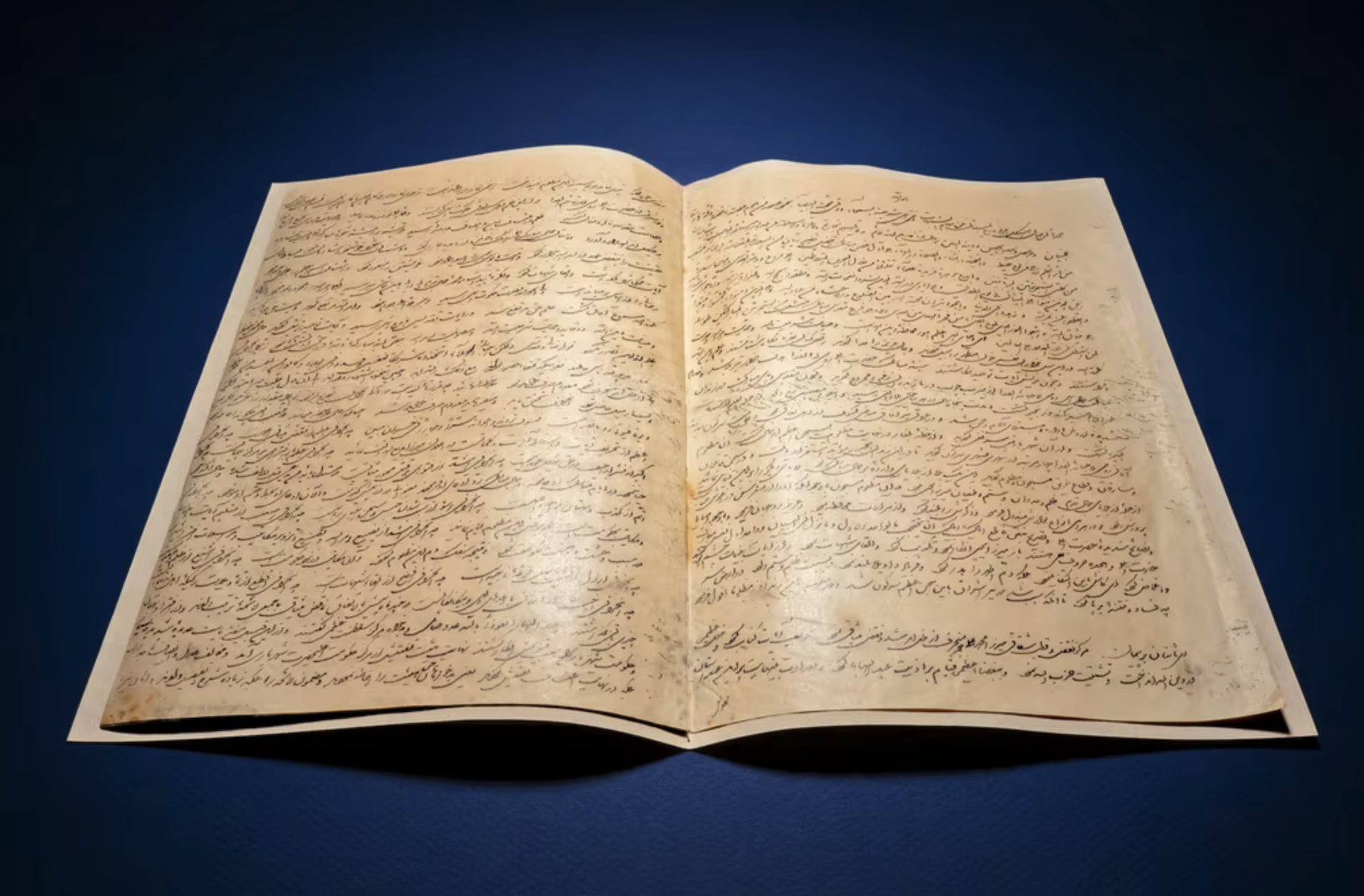
Photo of opening pages of ‘Abdu’l-Bahá’s Will and Testament. Source: Bahá'í World News Service, 24 December 2021.
Although Shoghi Effendi had been informed that 'Abdu'l-Bahá had left a letter for him, he had absolutely no knowledge of the contents of the document. At the most, Shoghi Effendi expected, due to his rank as the Master’s eldest grandson, that 'Abdu'l-Bahá might have left instructions regarding the election of the Universal House of Justice, and maybe even that he was the one who would be designated as the Convenor of the conference to elect the Supreme. Governing body of the Bahá'í Faith.
Shoghi Effendi had no foreknowledge of the institution of the Guardianship, he had no idea that his Grandfather had chosen him as Guardian when he was only 4 and 12 years old, and all these discoveries at once came as a shock to Shoghi Effendi, still so young at the age of 24, and naturally sensitive. It was all a tremendous, life-altering shock.
Knowledge of his new station instantly changed Shoghi Effendi. He knew, better than anyone else, exactly what being the Guardian entailed, that same burden of holding and protecting the Covenant, safeguarding and propagating the Faith, which had rested on the shoulders of the three Central Figures of the Faith before him.
In perhaps one of the most poignant sentences of "The Priceless Pearl," Rúḥíyyih Khánum recalls Shoghi Effendi telling her:
When they read the Master's Will to me, I ceased to be a normal human being.
Shoghi Effendi was now the Guardian of the Bahá'í Faith, and ‘Abdu'l-Bahá's Will and Testament now had to be read publicly.

Shoghi Effendi is now and forevermore the Guardian. Source: Blessings Beyond Measure, ‘Alí Yazdí, page 92.
Louise Bosch, an American pilgrim saw Shoghi Effendi after he had been read the Will and Testament, and recalled that he objected so strenuously his own mother, Ḍíyá‘íyyih Khánum, recalled to him how, in the days after Muḥammad’s Ascension, one of the Imáms refused to take over the mantle of leadership, too, and she asked her son:
Are you going to repeat the history of that Imám, who also felt that he was not qualified?
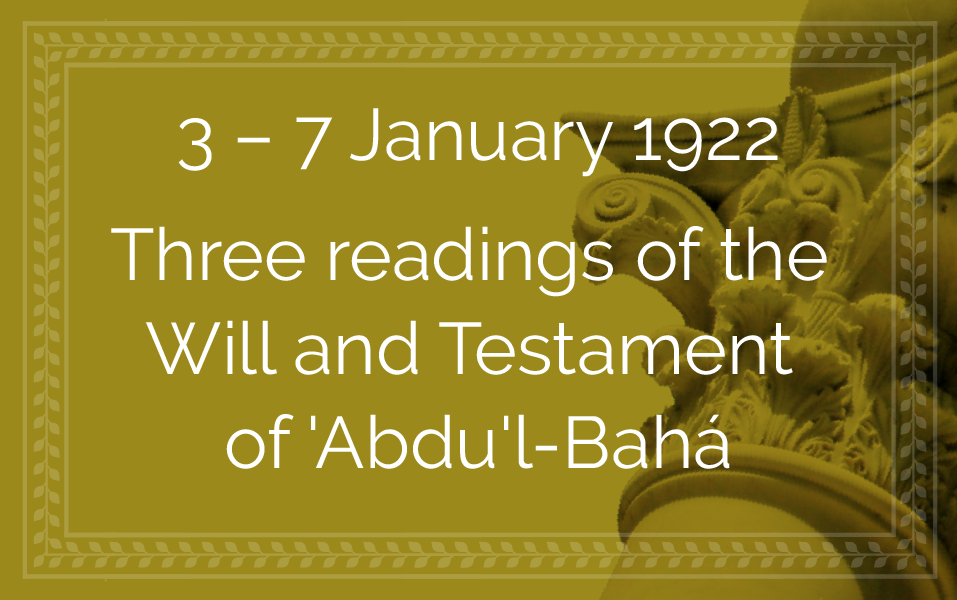
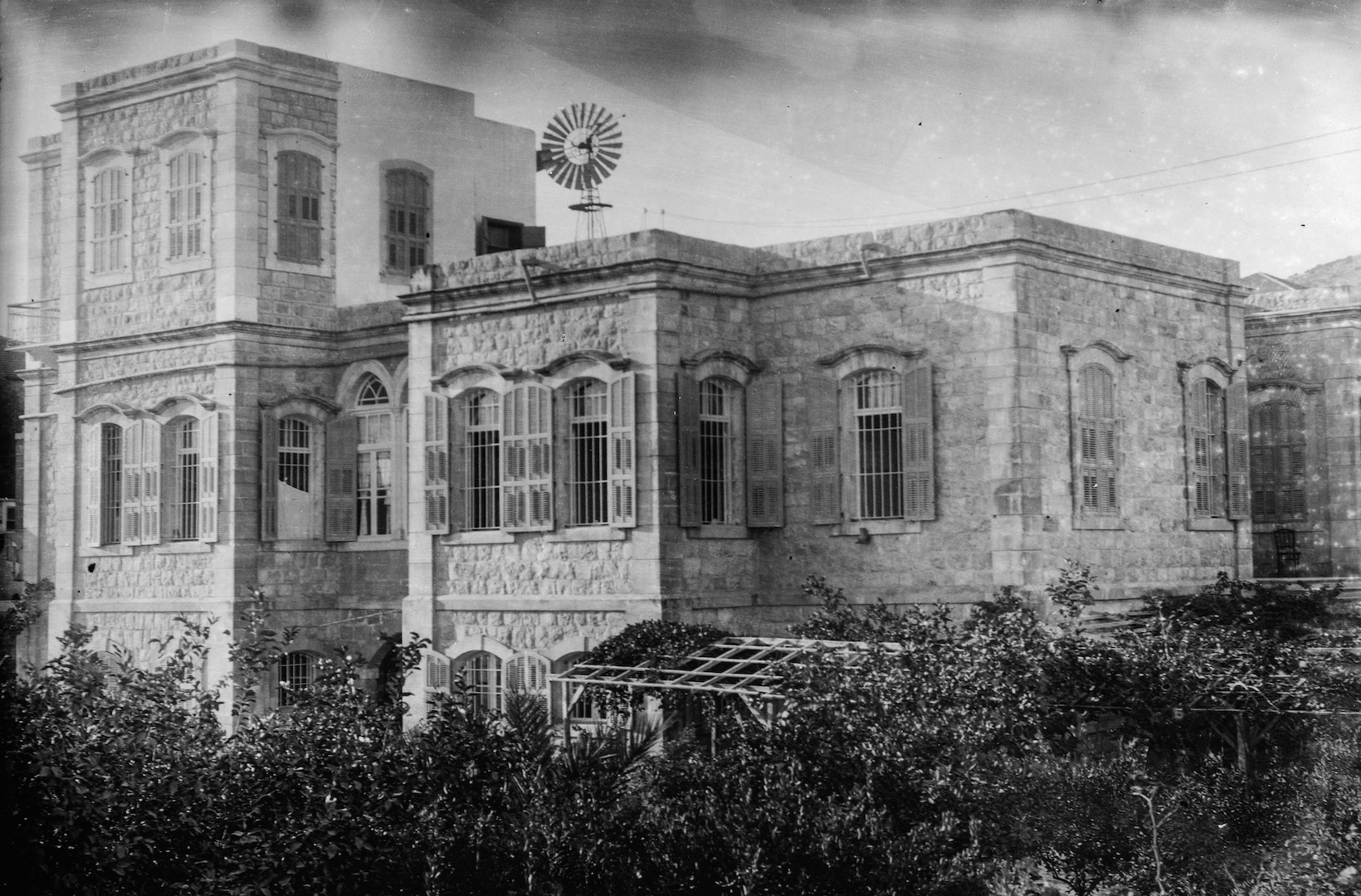
At the house of the Master. Source: Bahá'í Media Bank, © Bahá'í International Community 2023.
On the morning of January 3, 1922, Shoghi Effendi visited the Shrine of the Báb and the Tomb of 'Abdu'l-Bahá. Later the same day, at the House of the Master, ‘Abdu'l-Bahá's Will and Testament was read aloud to nine men, most of whom were members of the family of ‘Abdu'l-Bahá. Bahá'ís from Persia, India, Egypt, England, Italy, Germany, America and Japan were present at this reading.
Shoghi Effendi was not present, and according to Amatu’l-Bahá Rúḥíyyih Khánum, this was both for reasons of ill health as much as sensitivity on his part.
These men witnessed ‘Abdu'l-Bahá's own handwriting, His seals, and His signatures throughout the three documents that composed His Will and Testament. At Shoghi Effendi's request, a true copy of ‘Abdu'l-Bahá's Will and Testament was made by one of the men present, a Persian Bahá'í.
Click on the link below to listen to excerpts from the Will and Testament of 'Abdu'l-Bahá, recited in Arabic and Persian with English subtitles:
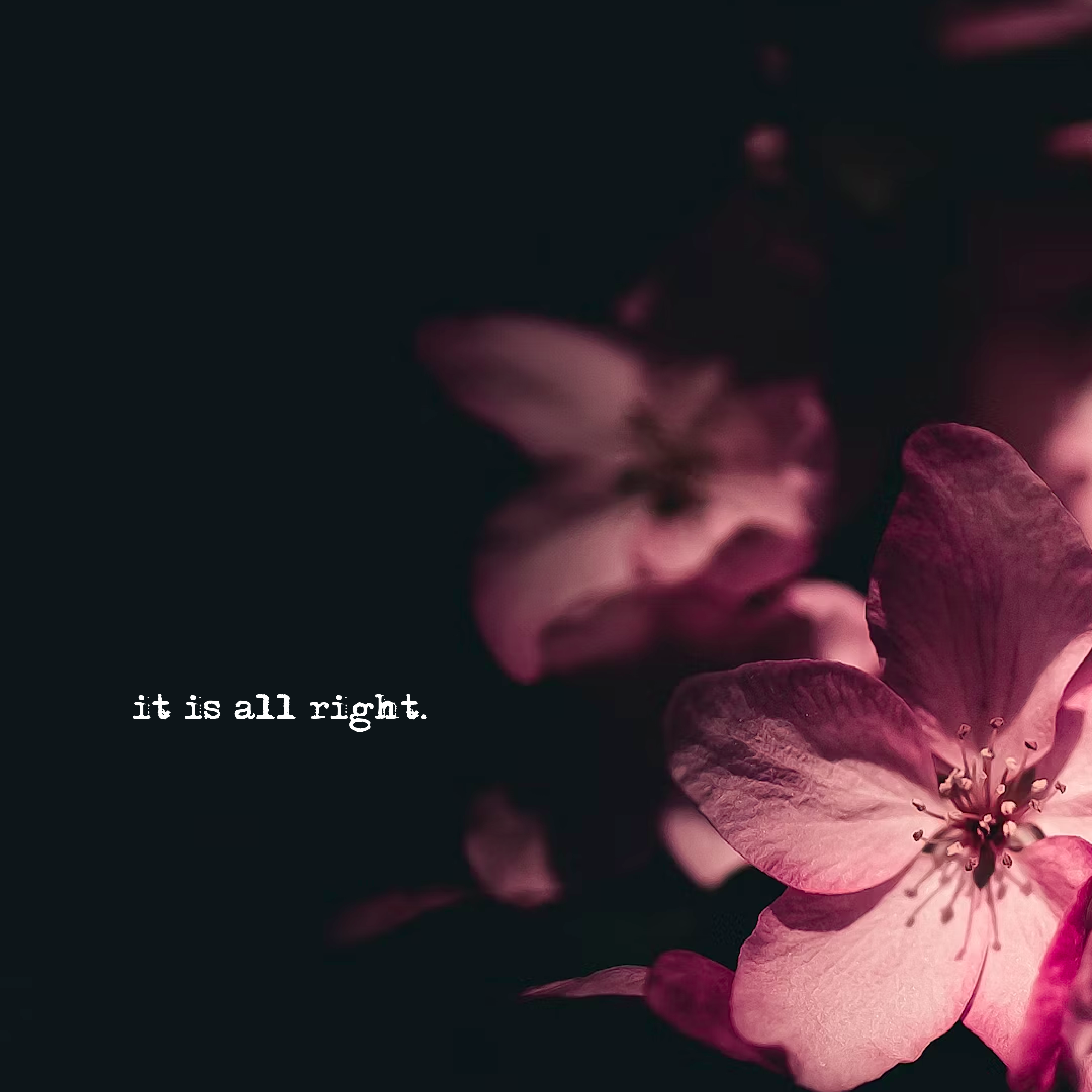
“It is all right.” Background photo by yousef alfuhigi on Unsplash.
After the first reading of the Will and Testament on 3 January 1921, Louise Bosch went over to the House of 'Abdu'l-Bahá after sunset and never forgot what she witnessed. Shoghi Effendi was coming out of a room, and entered the room of the Greatest Holy Leaf.
Shoghi Effendi, who had been under so much stress and pressure—looked like had aged, and become an old man. He was walking bent over and could hardly speak, but he shook Louise’s hand, and looked at her for a moment. He spoke like someone who did not want to hear anything and did not want to see anyone. He was a completely different person.
Shoghi Effendi was carrying a little light or a candle in his hand, and said to Louise:
It is all right.
But Louise knew something terrible had happened. Shoghi Effendi had reacted exactly the way his family thought he would, and he became ill, he stopped eating, and could not drink or sleep.
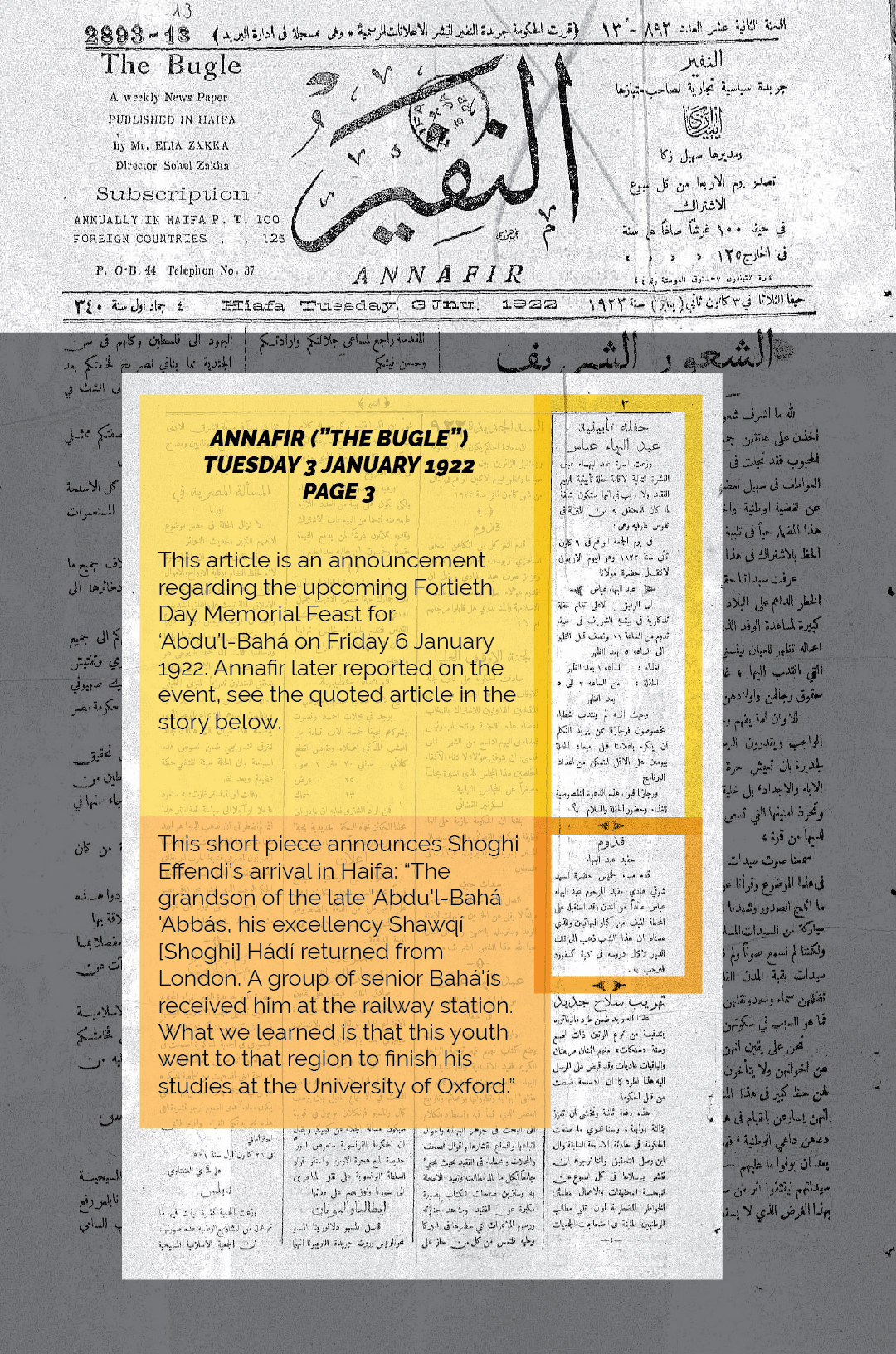
Tuesday 3 January 1922 Annafir ("The Bugle") article regarding the upcoming Friday 6 January 1922 Fortieth Day Memorial Feast for 'Abdu'l-Bahá. The article and the information contained in this graphic are both courtesy of Dr. Necati Alkan, an independent scholar with expertise about late Ottoman history and special focus on the Baha'i Faith. Annafir published an article about the Memorial Feast after it had taken place, and this article is quoted in the story below.
In accordance with eastern tradition, an impressive memorial feast is held in ‘Abdu'l-Bahá's memory on the fortieth day after His passing, on Friday 6 January 1922 at 1 PM.
Six hundred and fifty people from Haifa, 'Akká, neighboring towns, and as far away as Syria, Lebanon and Egypt, headed by Lieutenant Colonel Stewart Symes, the Governor of Phoenicia, the Governor of Haifa, government officials, foreign consuls, prominent poets and scholars, Muslims, Christians, Jews and Bahá'ís of various nationalities, gather at the home of ‘Abdu'l-Bahá at 7, Persian street (now Haparsim).
The members of the Master's household have arranged a perfectly prepared dinner for the more than 600 guests at the banquet, but also 150 of the poor of Haifa, gathered in a special banquet of their own.
The long banquet tables are decorated with trailing branches of bougainvillea, the vibrant purple blooms, mingling with white narcissus and large dishes filled with golden oranges from the Master's own garden.
Each and every guest receives the very same, warm welcome into the Master's house.
An article was published in the Arabic-language Haifa newspaper Annafir ("The Bugle"), a Haifa newspaper enthusiastically reporting the magnificent Fortieth Day Memorial Feast for 'Abdu'l-Bahá:
At one o'clock in the afternoon people from Haifa, 'Akká and the neighboring towns, headed by the High Commissioner of Palestine, government officials, foreign consuls, religious leaders, prominent poets and scholars of all nations, races, and creeds, assembled at the house of the late 'Abdu'l- Baha 'Abbás. Neither in Haifa nor in any other Oriental city has there ever been such an impressive service. A well-arranged and perfectly prepared dinner was served to more than six hundred guests. Besides these, one hundred and fifty of the poor gathered in a special place prepared for them. After all had partaken of the delicious food, they assembled in the large hall. On the platform was a photograph of the departed.
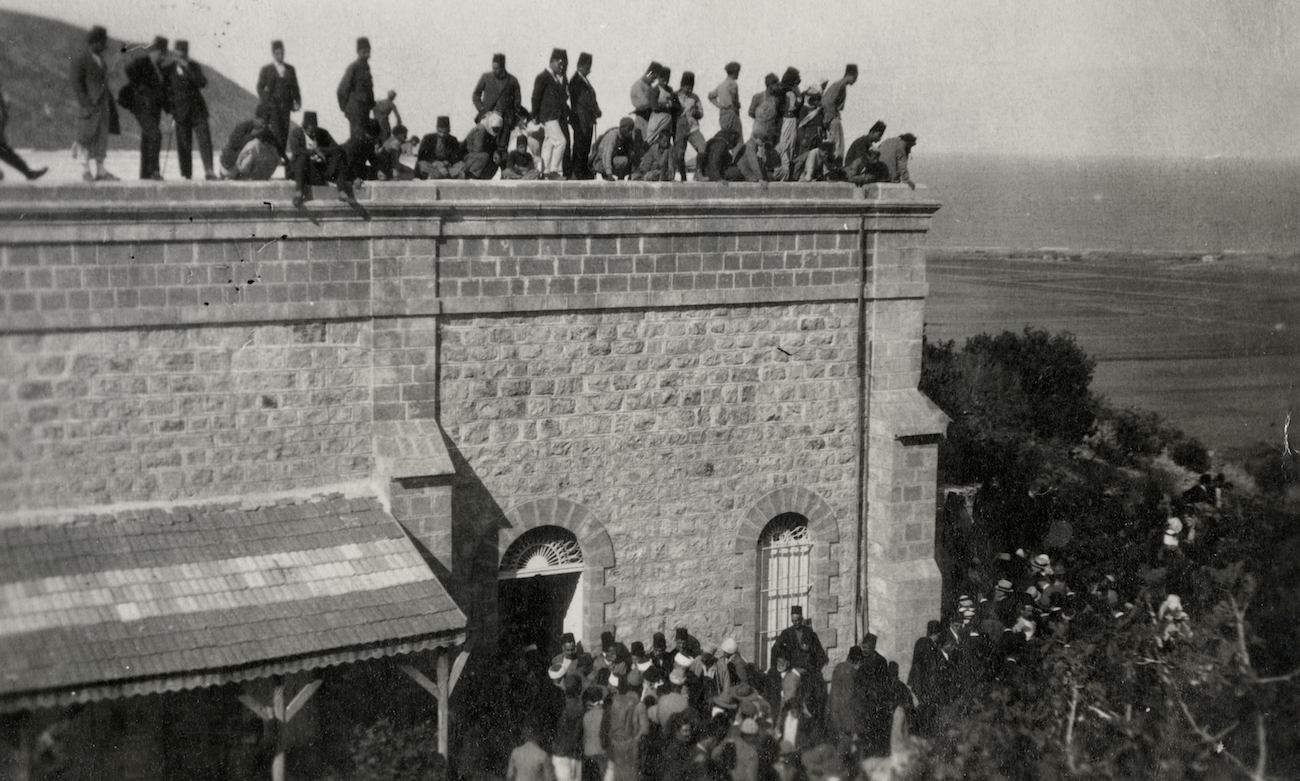
Men and boys crowd the roof of the Shrine of the Báb to hear the memorial speeches on Tuesday 29 November, the day of 'Abdu'l-Bahá’s funeral. Source: © United States National Bahá'í Archives, used with permission.
After the luncheon, the guests entered the large central hall of the Master's house, where both end rooms had been thrown open to accommodate the large number of guests.
Chairs had been brought in to ensure everyone could be seated, and the main hall had been decorated with beautiful rugs and draperies.
There was also a portrait of ‘Abdu'l-Bahá, and a raised platform had been brought in for the speakers, none of whom were Bahá'í and who included, among others, the Secretary of the National Muslim Society, Lieutenant Colonel Stewart Symes, Governor of Phoenicia, a young Christian poet, a well-known Muslim orator.
The six speeches were published in Annafir ("The Bugle"), a Haifa newspaper, and you can read them in full by downloading the magnificent compilation created by David Merrick, titled Passing of ‘Abdu'l-Bahá.
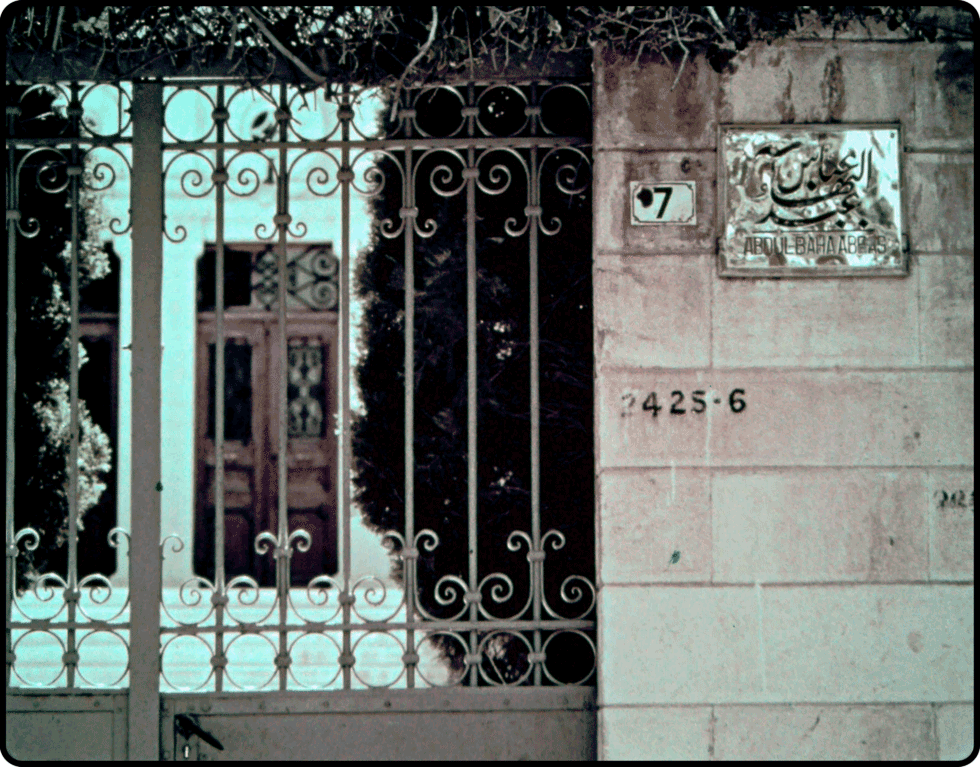
The front gate of the House of the Master, inside of which, in the main central hall, the Will and Testament of 'Abdu'l-Bahá is read for a second time. Source: Bahaimedia.
The Will and Testament of ‘Abdu'l-Bahá was read a second time publicly, after the speeches and tributes in honor of ‘Abdu'l-Bahá at the fortieth-day Memorial Feast. The guests of the memorial feast were eager to hear from Shoghi Effendi himself, and one of the Bahá'í friends carries a message to the Guardian to this effect. Shoghi Effendi was with the Greatest Holy Leaf, in her room, and when he receives the message, says he is too distressed and overcome to address the guests and instead, penned a message to be read on his behalf, which began with the following words:
The shock has been too sudden and grievous for my youthful age to enable me to be present at this gathering of the loved ones of beloved 'Abdu'l-Bahá.
Shoghi Effendi then expressed the heartfelt gratitude of himself and ‘Abdu'l-Bahá's family's for the presence of the Governor and the speakers who, by their sincere words "have revived his sacred memory in our hearts... I venture to hope that we his kindred and his family may by our deeds and words, prove worthy of the glorious example he has set before us and thereby earn your esteem and your affection. May His everlasting spirit be with us all and knit us together for evermore!"
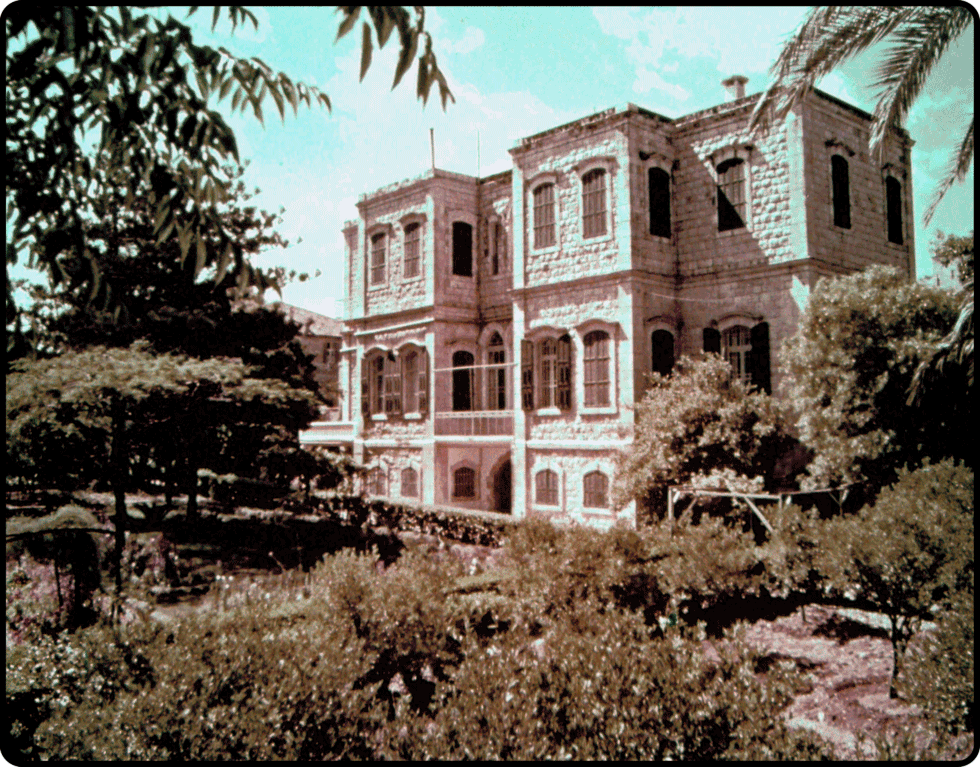
The House of 'Abdu'l-Bahá, seen from the garden at the back. Source: Bahaimedia.
On January 7, 1922 in the Master's house the day after the Memorial Feast, ‘Abdu'l-Bahá's Will and Testament was read once again, in its entirety, but this time, to an audience composed entirely of Bahá'ís, the intended recipients of the weighty injunctions and provisions.
It was read in the large, central hall of the House of 'Abdu'l-Bahá at 7, Haparsim, the house in which He had passed away. The crowd—composed of Bahá'ís from Persia, India, Egypt, England, Italy, Germany, America and Japan. was so large that many people sat on the floor. Women were present, but seated behind a curtain, according to Persian tradition at the time in the 1920s.
In the corner of the hall, a prominent Egyptian Bahá'í read the Will and Testament out loud. Each time Shoghi Effendi’s name was mentioned, everyone would rise.
Shoghi Effendi was not present during this reading, as was his custom, but everyone in the audience rose each time his name was mentioned in the Will, as a show of respect.
To those assembled, it was abundantly clear that the responsibility of leading the Faith and its affairs have now fallen on the shoulders of Shoghi Effendi, Guardian of the Bahá'í Faith.
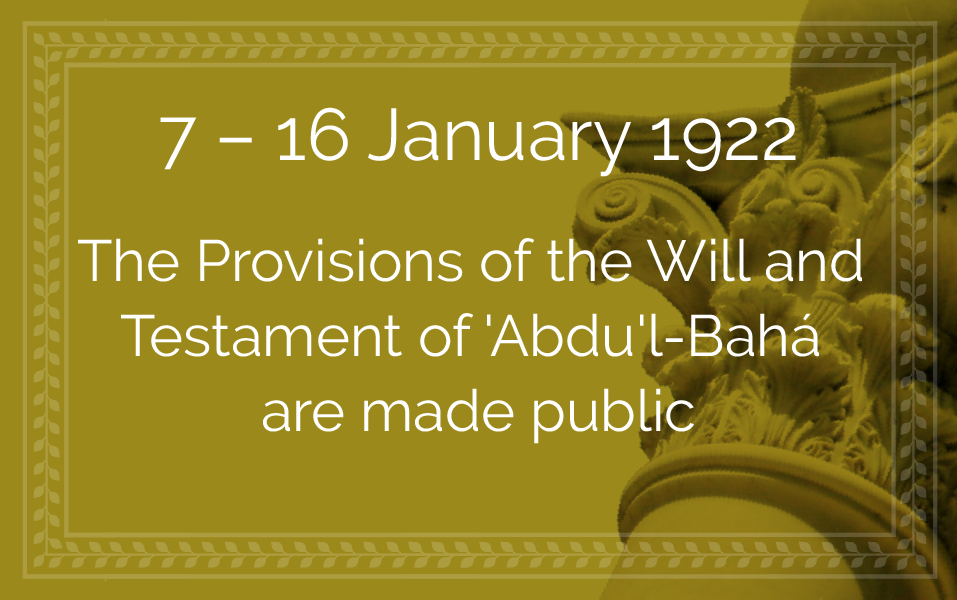
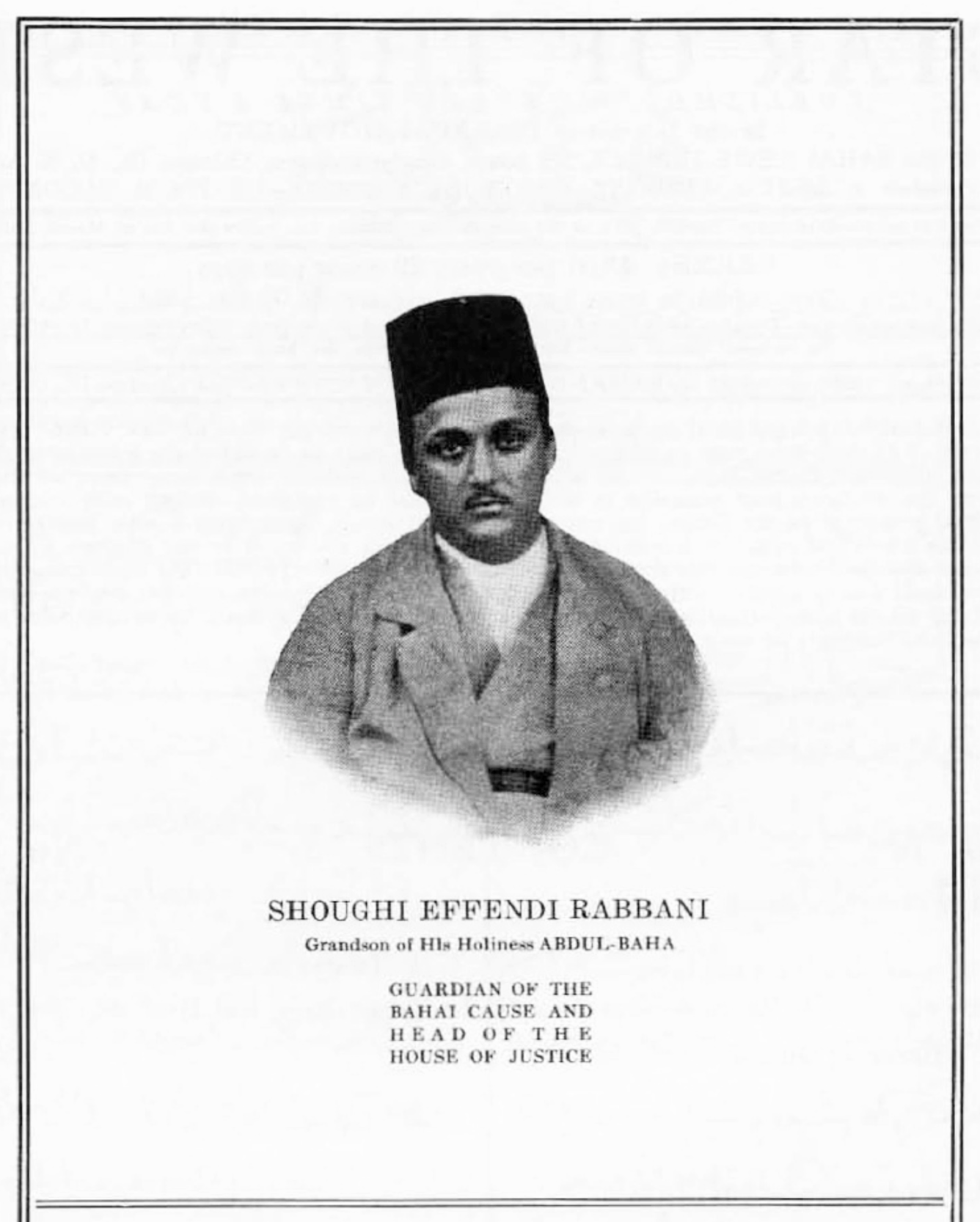
Guardian. Full-page photograph and announcement in Star of the West Volume 12 Number 17 page 258 introducing the Bahá'ís of the world to the new Head of the Bahá'í Faith: Shoghi Effendi, grandson of 'Abdu'l-Bahá, Guardian of the Cause and Head of the Universal House of Justice.
Befittingly, it was Bahíyyih Khánum, the Greatest Holy Leaf, and not Shoghi Effendi, who announced to the Bahá'í world the provisions of the ‘Abdu'l-Bahá's Will and Testament.
First, the Greatest Holy Leaf sent two cables to Persia on January 7, 1922.
The first one reads:
Memorial meetings all over the world have been held. The Lord of all the worlds in His Will and Testament has revealed His instructions. Copy will be sent. Inform believers.
and the second reads:
Will and Testament forwarded Shoghi Effendi Centre Cause.
The Spiritual Assembly of Ṭihrán had written to 'Abdu'l-Bahá asking in whose names properties in Persia should be registered to, and the Master had answered, no doubt foreseeing future events:
You have asked in whose name the real estate and buildings donated should be registered with the Government and the legal deeds issued: they should be registered in the name of Mirza Shoghi Rabbani, who is the son of Mírzá Hádí Shírází and is in London.
This Tablet from 'Abdu'l-Bahá explains in great part why it was no surprise to the Persian believers that Shoghi Effendi had been appointed Guardian of the Faith in the Master’s Will and Testament.
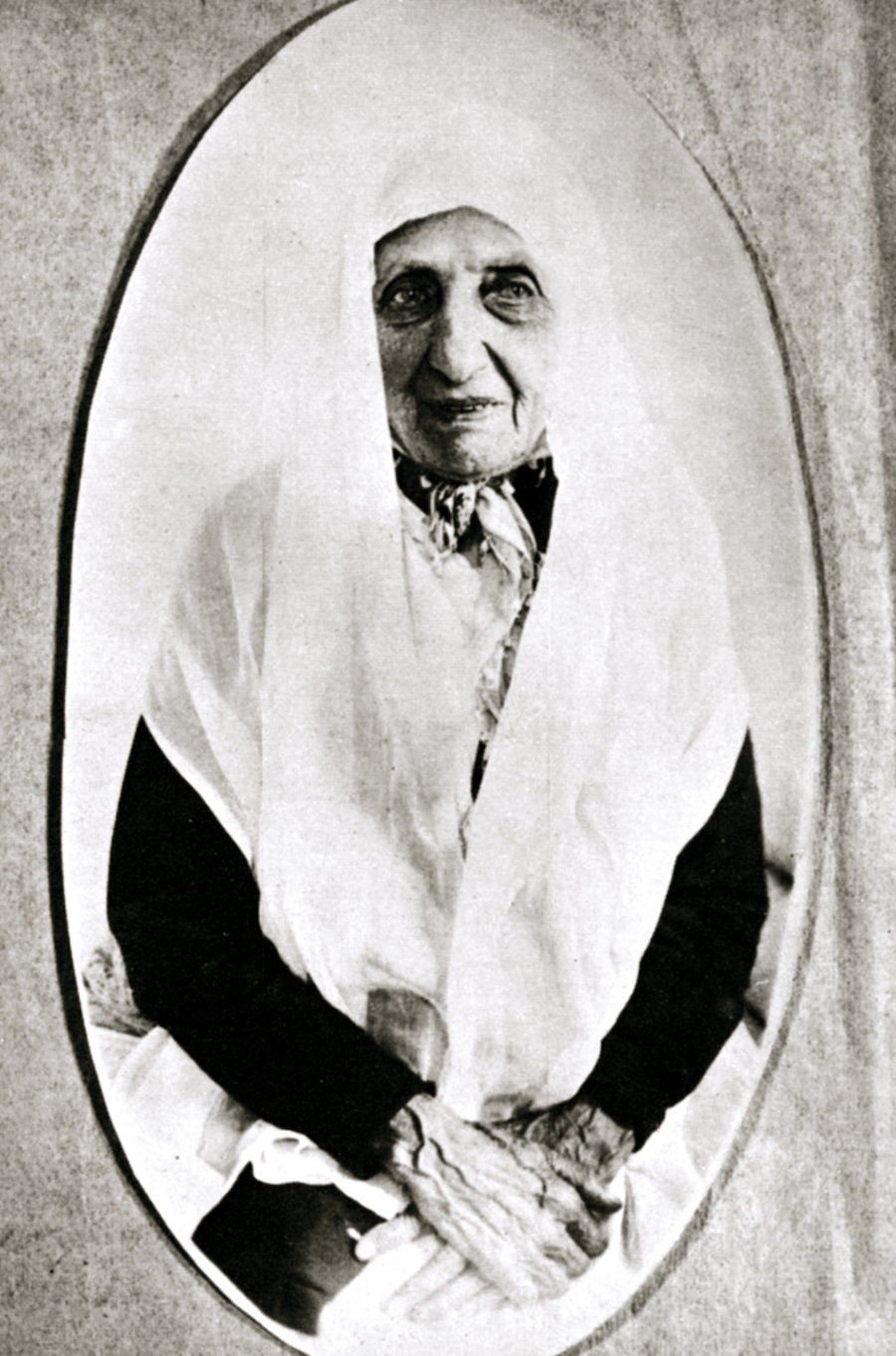
The Greatest Holy Leaf, sister of 'Abdu'l-Bahá, who held the Bahá'ís together after the Ascension of 'Abdu'l-Bahá, made all the crucial decisions, sent all the crucial cables, and supported Shoghi Effendi, the new Guardian of the Faith, throughout. Source: Bahá'í Talks.
Nine days after sending the first two cables to the Persian Bahá'ís, on January 16, 1922, the Greatest Holy Leaf sent the following cable to the United States:
In Will Shoghi Effendi appointed Guardian of Cause and Head of House of Justice. Inform American friends.
These series of three cables sent by Bahíyyih Khánum to the Bahá'í world are a great sign of what is to come. Despite the fact that Shoghi Effendi was, from the very beginning as the Guardian of the Faith, both tactful and masterful in the way he addressed any challenge or problem that arose, for the next ten years, he would have a constant and abiding ally, support, collaborator and loving presence in the Greatest Holy Leaf.
Bahíyyih Khánum’s station, her limpid character, her oceanic love for Shoghi Effendi made her not only his sole earthly support, but also, and more importantly, his refuge.
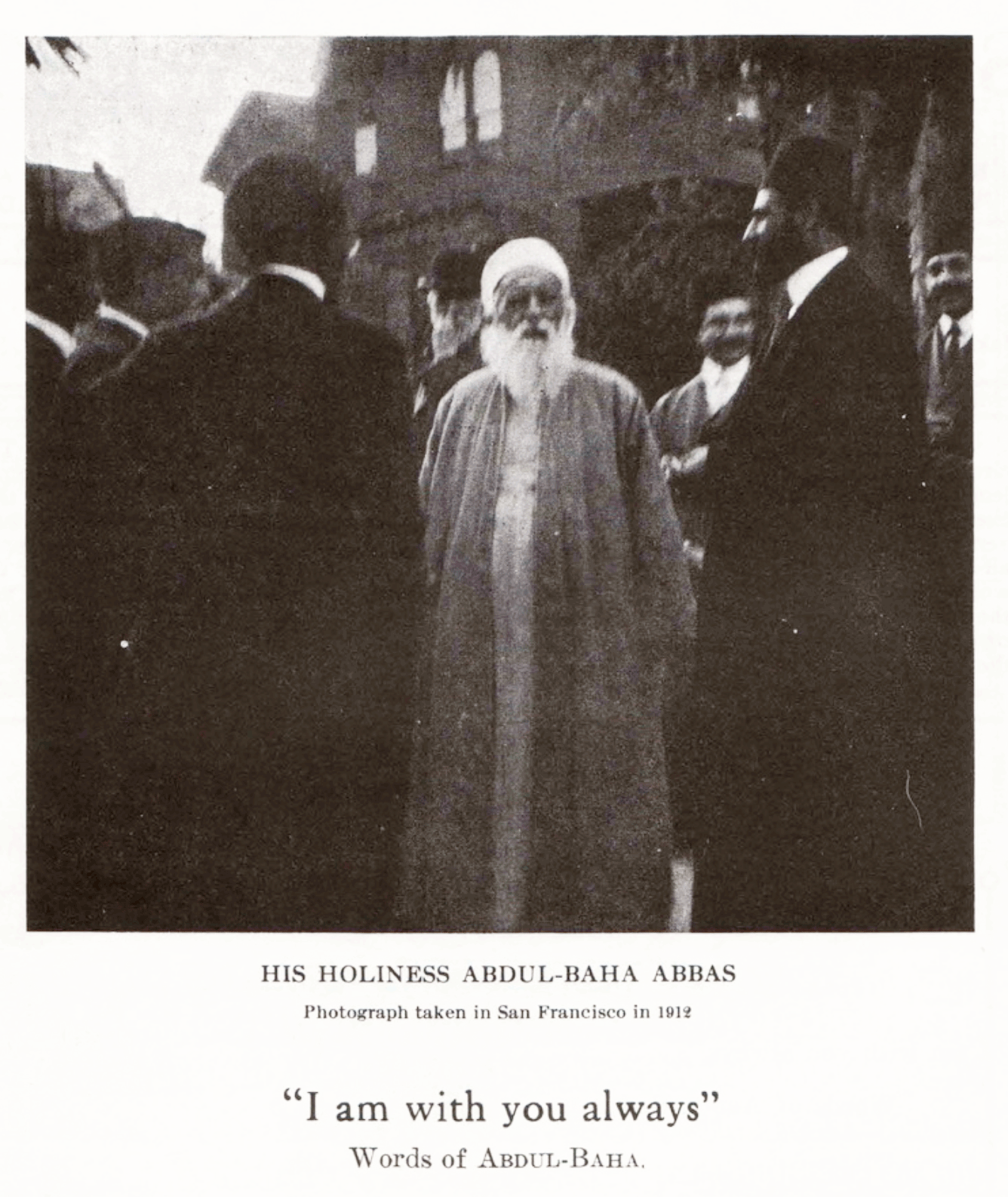
"I am with you always": A memorial photograph of 'ab in San Francisco in 1912. Source: Star of the West Volume 12, Number 16, page 250.
Almost immediately after having been acquainted with the contents of 'Abdu'l-Bahá’s Will and Testament, Shoghi Effendi—now the Guardian of the Cause of Bahá'u'lláh— set himself the painful task of translating it into English.
This was a daunting task, and no one has framed it better than Mr. ‘Alí Nakhjávání in his masterful series of talks, Shoghi Effendi: The Range and Power of His Pen:
Here was this 24-year-old youth, who had to translate, for all time, the provisions of a document which he later described as one of the two “Charter[s] of a future world civilization.” While he was doing this seminal work, he also had to make sure that photostatic copies of his Grandfather’s Will or reliable transcripts were made and duly sent to different Bahá’í communities throughout the East. Sentence by sentence, he had to translate the story of the sufferings endured by ‘Abdu’l-Bahá, the disloyalty and rebellion of His half-brother, Mírzá Muḥammad-‘Alí, and the Master’s prediction of the frustration of all his hopes and those of the people who followed him. ‘Abdu’l-Bahá also expressed in His last wishes a call to all the friends to arise unitedly to disperse far and wide and to follow the heroic example of the Disciples of Jesus Christ. In this self-same document ‘Abdu’l-Bahá expresses His desire for martyrdom, and utters His prayers for the repentance and forgiveness of His enemies. On more practical matters, the Master outlined the responsibilities and powers devolving on the Guardian of the Faith, including his appointment of the Hands of the Cause of God, and specified the scope of the duties and functions of the Universal House of Justice, as well as stipulating the method of the election of this Supreme Body.
Evil things were rumbling across the world as Shoghi Effendi was translating 'Abdu'l-Bahá’s Will and Testament into English.
The American and Persian Covenant-breakers in the United States were counting on the Bahá'í Faith being severely weakened with the passing of 'Abdu'l-Bahá.
The Guardian made the decision to share the English translation of 'Abdu'l-Bahá’s Will and Testament in two stages.
Immediately after Bahíyyih Khánum had sent cables to the entire Bahá'í world announcing the provisions of the Will and Testament of 'Abdu'l-Bahá, Shoghi Effendi compiled 8 passages from the Master’s Will and circulated them among the Bahá'ís.
In a typical act of humility on behalf of Shoghi Effendi, only one of the 8 excerpts referred to Shoghi Effendi himself, and it was a very brief one which read:
O ye the faithful loved ones of 'Abdu'l-Bahá! It is incumbent upon you to take the greatest care of Shoghi Effendi. For he is, after 'Abdu'l-Bahá, the guardian of the Cause of God, the Afnán, the Hands (pillars) of the Cause and the beloved of the Lord must obey him and turn unto him.
The Master’s Will and Testament is filled with passages of great power and authority regarding Shoghi Effendi and his station, but Shoghi Effendi chose the least provocative to first introduce himself to the Bahá'ís.
Shoghi Effendi initially circulated these 8 selections with the Bahá'ís in the West to begin preparing them for a fuller understanding of the entire Will and Testament of 'Abdu'l-Bahá.
Soon after sending the short compilation, Shoghi Effendi sent the entire text of the Will and Testament to the Bahá'ís.
From the very beginning, Shoghi Effendi repeatedly indicated to Persian and western Bahá'ís that the provisions of the Will and Testament had hidden implications that would be revealed in time, as he explains in this letter dated 23 February 1924 to the American Bahá'ís:
To attempt to estimate its full value, and grasp its exact significance after so short a time since its inception would be premature and presumptuous on our part. We must trust to time, and the guidance of God’s Universal House of Justice, to obtain a clearer and fuller understanding of its provisions and implications....
One of these provisions would be what would happen to the Faith if the Guardian were to pass away without leaving a successor. This would be one of the greatest tests of the worldwide Bahá'í community, and thanks to 'Abdu'l-Bahá’s Will and Testament, to the 36 years of Shoghi Effendi’s Guardianship, to the wisdom and steadfastness of the Hands of the Cause, the hidden implications in the provisions of the Master’s Will and Testament would save the Bahá'í world.
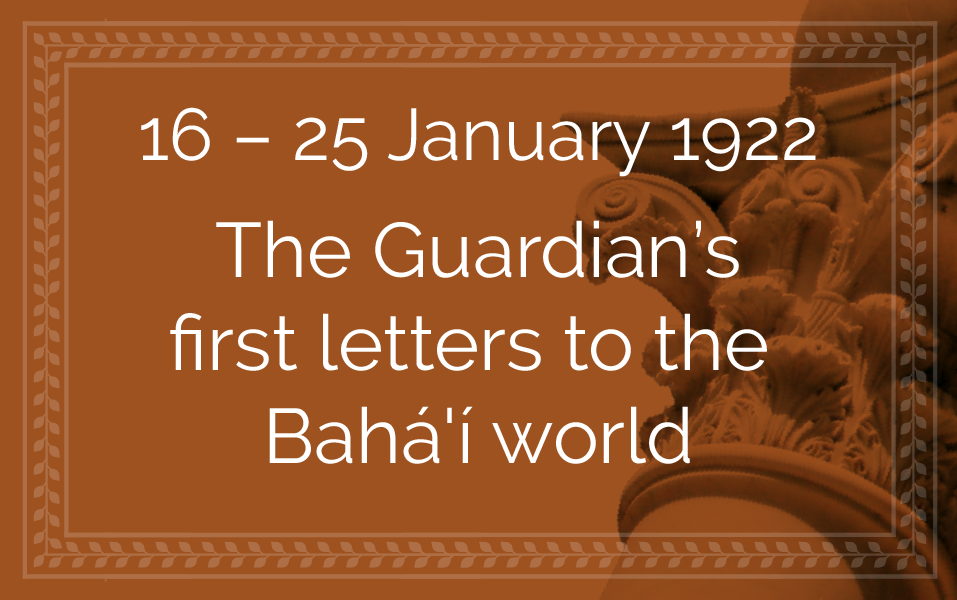
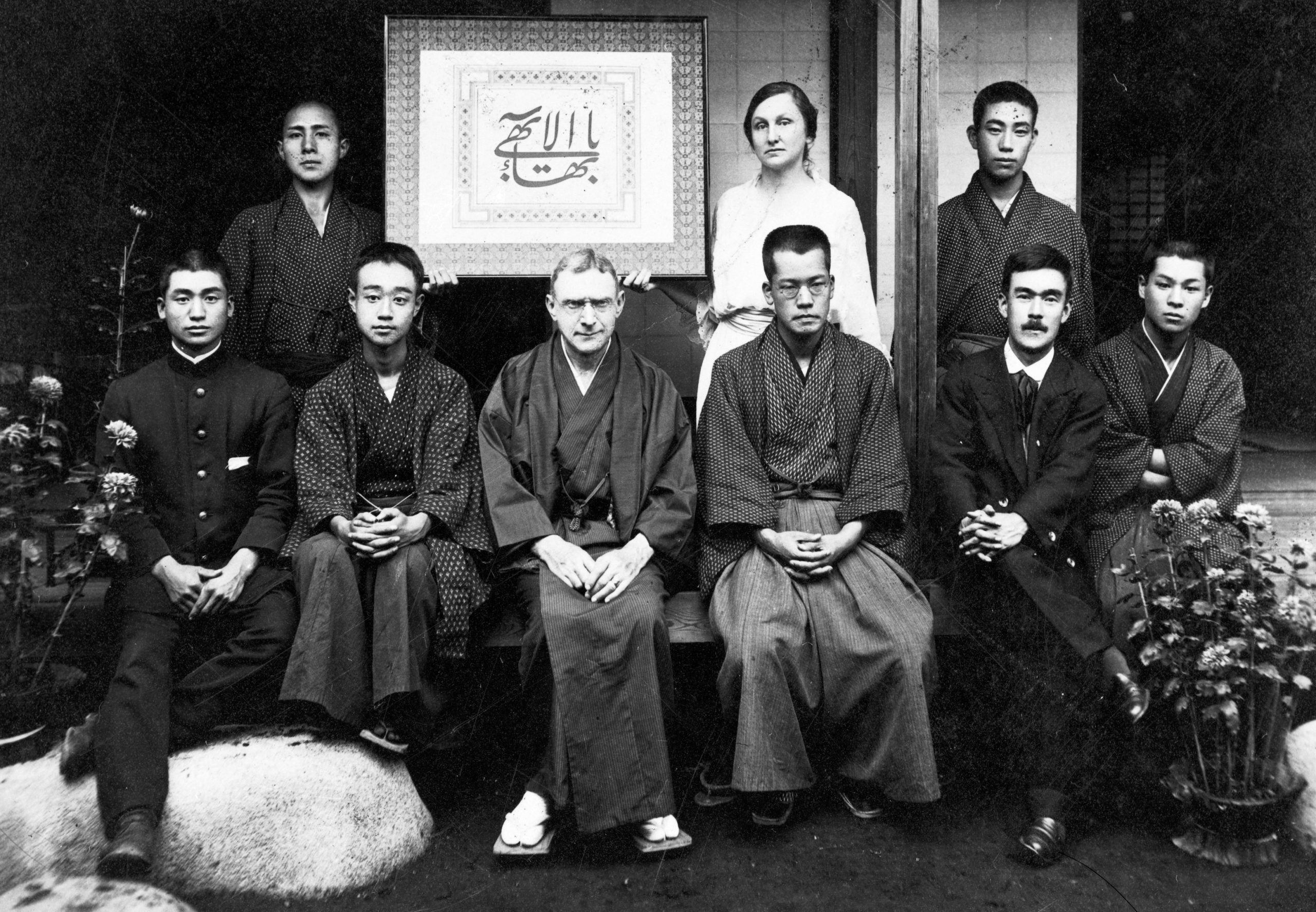
While he was in the middle of translating 'Abdu'l-Bahá’s Will and Testament into English, Shoghi Effendi wrote his very first letter to the Persian Bahá'ís on 16 January, in which he encouraged them to remain steadfast and protect the Faith and sharing with them his grief at the passing of 'Abdu'l-Bahá’.
Five days later, on 21 January 1921, Shoghi Effendi wrote his first letter to the American Bahá'ís, opening with:
At this early hour when the morning light is just breaking upon the Holy Land, whilst the gloom of the dear Master's bereavement is still hanging think upon the hearts, I feel as if my should turns in yearning love and full of hope to that great company of His loved ones across the seas…
Already he had placed his hand on the tiller and sees the channels he must navigate clearly before him: "the broad and straight path of teaching", as he phrased it, unity, selflessness, detachment, prudence, caution, earnest endeavour to carry out the Master's wishes, awareness of His presence, shunning of the enemies of the Cause - these must be the goal and animation of the believers.
Four days after that letter, on 25 January 1921, Shoghi Effendi wrote his first letter to the Japanese Bahá'ís:
Despondent and sorrowful though I be in these darksome days, yet whenever I call to mind the hopes our departed Master so confidently reposed in the friends in that Far-eastern land, hope revives within me and drives away the gloom of His bereavement.
As His attendant and secretary for well-nigh two years after the termination of the Great War, I recall so vividly the radiant joy that transfigured His face whenever I opened before Him your supplications…
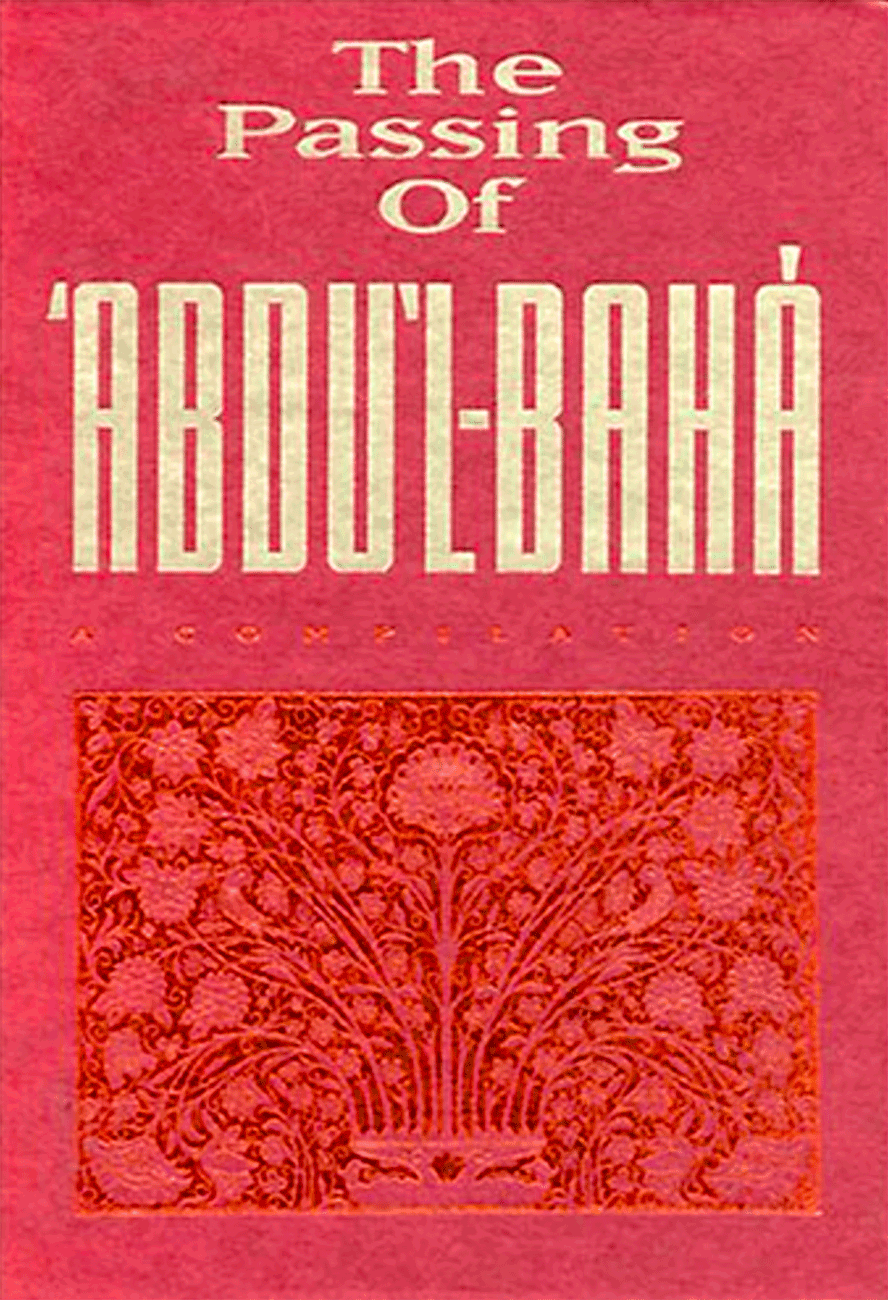
An Account of the Passing of 'Abdu'l-Bahá, Shoghi Effendi and Lady Sarah Louisa Blomfield, originally published in 1922 as a separate booklet, then published in the 1973 Bahá'í World on the 50th anniversary of the passing of Abdu'l-Bahá, and then posted in 2021, with minor changes, at bahai.org.
In the depths of his endless sorrow of losing his adored Grandfather, reeling with the realization that 'Abdu'l-Bahá had named him Guardian, protector and interpreter, Shoghi Effendi still found the strength to empathize with the suffering of the hundreds of thousands of Bahá'ís worldwide who were also grieving the loss of 'Abdu'l-Bahá.
He knew that they were anxiously waiting to hear what had happened in the days and weeks before his passing, how their beloved Master had left this world, and what the funeral had been like.
Shoghi Effendi gathered his strength, and, assisted by Lady Blomfield, they gathered all the material they could find, collected all the data they could get their hands on and began writing an extraordinary, unique type of eulogy. The document they produced together was in the form of a 50-page letter dated 19 January 1922 called The Passing of ‘Abdu’l-Bahá: Compiled by Shoghi Effendi and Lady Blomfield, and it was first published in England in 1922.
As soon as it was published, Shoghi Effendi sent a copy to the Local Spiritual Assembly of Ṭihrán, instructing them to translate it into Persian and distribute to the friends in Persia and surrounding countries.
The essay opens with six accounts showing that 'Abdu'l-Bahá knew His earthly life was coming to a close, in His own words and in dreams He recounted to His family including a following prayer, revealed in His very lengthy last Tablet to the Bahá'ís of America two weeks before His passing, in which 'Abdu'l-Bahá longs for the Abhá Kingdom. Here are two verses of 'Abdu'l-Bahá’s last supplication to America:
Yá Bahá’u’l-Abhá! (O Thou the Glory of Glories) I have renounced the world and the people thereof, and am heart-broken and sorely afflicted because of the unfaithful. In the cage of this world, I flutter even as a frightened bird, and yearn every day to take my flight unto Thy Kingdom.
Yá Bahá’u’l-Abhá! Make me to drink of the cup of sacrifice and set me free. Relieve me from these woes and trials, from these afflictions and troubles. Thou art He that aideth, that succoureth, that protecteth, that stretcheth forth the hand of help.
Shoghi Effendi and Lady Blomfield describe the last two days of 'Abdu'l-Bahá’s life in great detail, from 27 to 28 November, until He passed away extremely gently and very swiftly at 1 in the morning on 28 November 1921.
'Abdu'l-Bahá’s funeral procession on 29 November 1921 is described in great detail, and four funeral eulogies are included in the essay, along with several obituaries of the Master from English, American, Egyptian, and Indian papers.
Shoghi Effendi and Lady Blomfield quote the most touching telegrams of condolences from eminent people like Sir Winston Churchill, His Majesty’s Secretary of State for the Colonies, Viscount Allenby, High Commissioner for Egypt, and from Bahá'í communities around the world.
The essay describes the seventh day memorial feast for the poor, and the fortieth day memorial feast and its speeches.
Shoghi Effendi and Lady Blomfield close their magnificent tribute with 'Abdu'l-Bahá’s inspiring words, excerpted here for the purposes of this chronology:
Friends! The time is coming when l shall be no longer with you. I have done all that could be done. I have served the Cause of Bahá’u’lláh to the utmost of my ability. I have laboured night and day, all the years of my life. O how I long to see the loved ones taking upon themselves the responsibilities of the Cause!
…I am waiting, waiting, to hear the joyful tidings that the believers are the very embodiment of sincerity and truthfulness, the incarnation of love and amity, the living symbols of unity and concord. Will they not gladden my heart? Will they not satisfy my yearning? Will they not manifest my wish? Will they not fulfil my heart’s desire? Will they not give ear to my call?
I am waiting, I am patiently waiting.
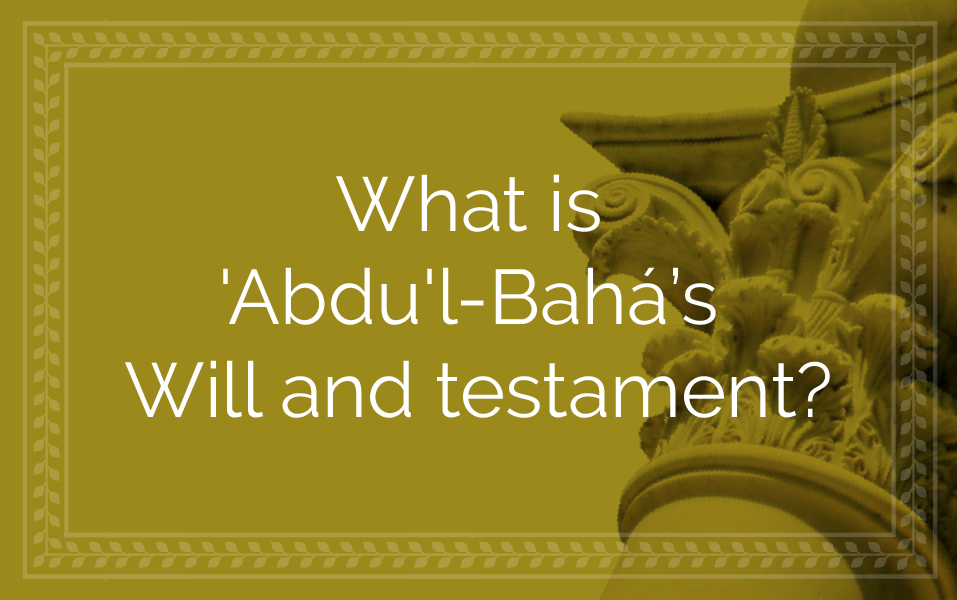
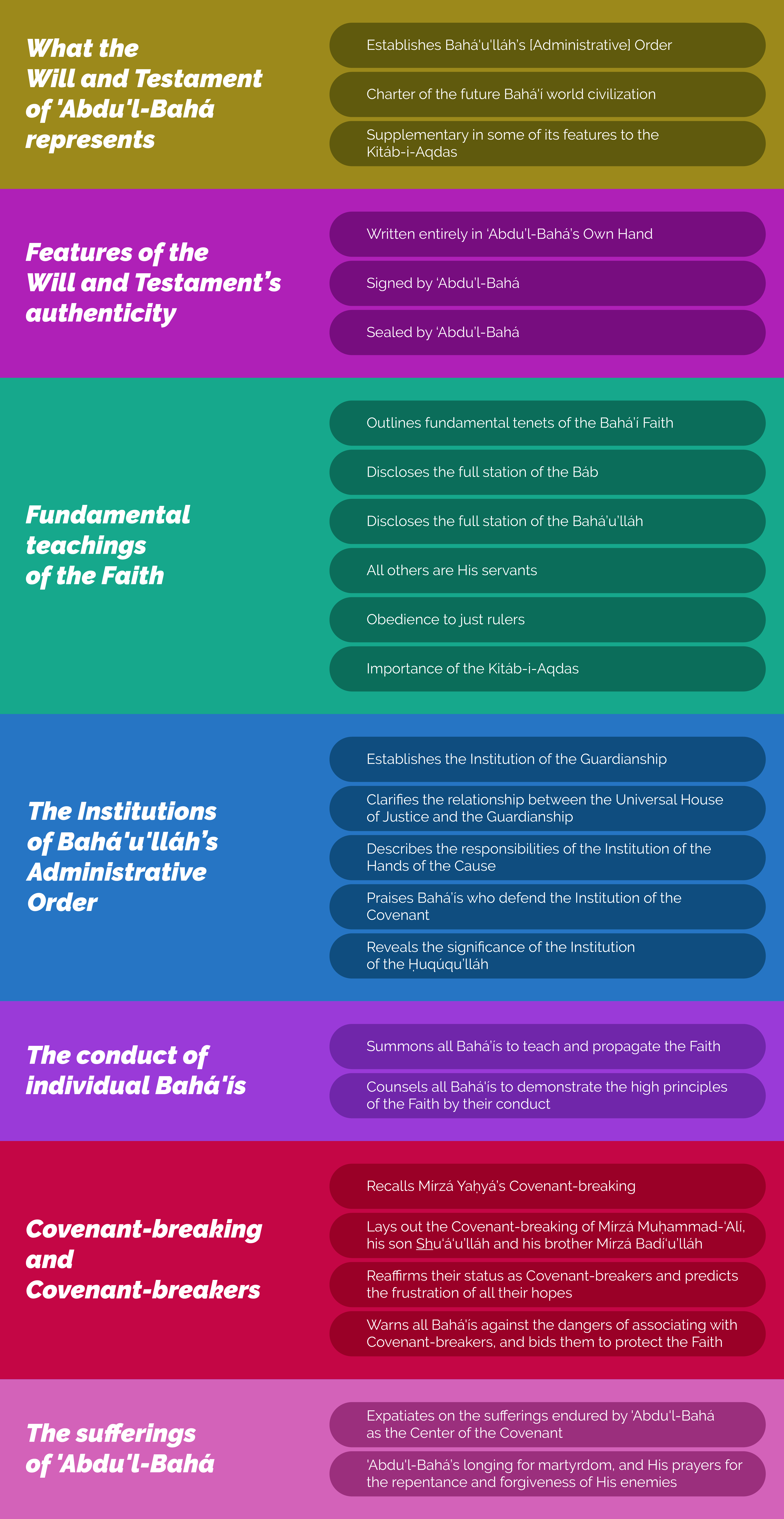
Before proceeding any further with this chronology of the life and work of Shoghi Effendi, we must take a moment to listen to what the Guardian himself has to say, in full, about the Will and Testament of 'Abdu'l-Bahá, the basis of his ministry, the foundation of Bahá'u'lláh’s divine civilization, the originating point of the Bahá'í Administrative Order, and in a very real sense, the cornerstone of any serious examination of the life and work of Shoghi Effendi, including this humble attempt.
In God Passes By, written 23 years after the Ascension of 'Abdu'l-Bahá in honor of the first 100 years of the Bahá'í Revelation Shoghi Effendi writes three long sentences about 'Abdu'l-Bahá’s Will and Testament in the fourth part of the book, titled The Inception of the Formative Age of the Bahá’í Faith 1921–1944, Chapter XXII: The Rise and Establishment of the Administrative Order.
The three sentences of Shoghi Effendi from God Passes By below address the content of the Will and Testament in great detail, offering not only the most comprehensive but also the most concise description penned by the Guardian regarding this historic and foundational document:
The Document establishing that Order, the Charter of a future world civilization, which may be regarded in some of its features as supplementary to no less weighty a Book than the Kitáb-i-Aqdas; signed and sealed by ‘Abdu’l‑Bahá; entirely written with His own hand; its first section composed during one of the darkest periods of His incarceration in the prison-fortress of ‘Akká, proclaims, categorically and unequivocally, the fundamental beliefs of the followers of the Faith of Bahá’u’lláh; reveals, in unmistakable language, the twofold character of the Mission of the Báb; discloses the full station of the Author of the Bahá’í Revelation; asserts that “all others are servants unto Him and do His bidding”; stresses the importance of the Kitáb-i-Aqdas; establishes the institution of the Guardianship as a hereditary office and outlines its essential functions; provides the measures for the election of the International House of Justice, defines its scope and sets forth its relationship to that Institution; prescribes the obligations, and emphasizes the responsibilities, of the Hands of the Cause of God; and extolls the virtues of the indestructible Covenant established by Bahá’u’lláh.
That Document, furthermore, lauds the courage and constancy of the supporters of Bahá’u’lláh’s Covenant; expatiates on the sufferings endured by its appointed Center; recalls the infamous conduct of Mírzá Yaḥyá and his failure to heed the warnings of the Báb; exposes, in a series of indictments, the perfidy and rebellion of Mírzá Muḥammad-‘Alí, and the complicity of his son Shu‘á‘u’lláh and of his brother Mírzá Badí‘u’lláh; reaffirms their excommunication, and predicts the frustration of all their hopes; summons the Afnán (the Báb’s kindred), the Hands of the Cause and the entire company of the followers of Bahá’u’lláh to arise unitedly to propagate His Faith, to disperse far and wide, to labor tirelessly and to follow the heroic example of the Apostles of Jesus Christ; warns them against the dangers of association with the Covenant-breakers, and bids them shield the Cause from the assaults of the insincere and the hypocrite; and counsels them to demonstrate by their conduct the universality of the Faith they have espoused, and vindicate its high principles.
In that same Document its Author reveals the significance and purpose of the Ḥuqúqu’lláh (Right of God), already instituted in the Kitáb-i-Aqdas; enjoins submission and fidelity towards all monarchs who are just; expresses His longing for martyrdom, and voices His prayers for the repentance as well as the forgiveness of His enemies.
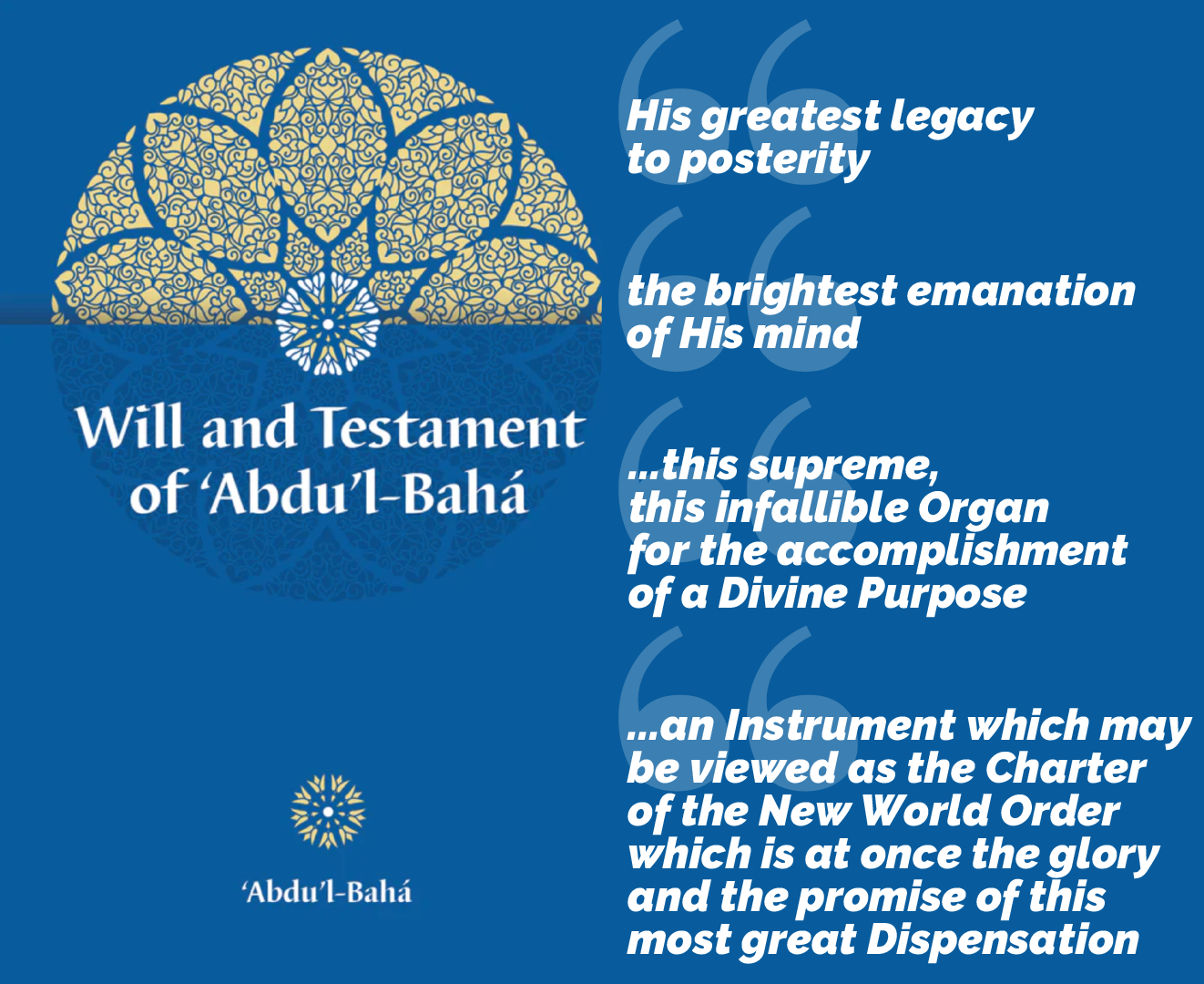
Shoghi Effendi, the Guardian of the Bahá'í Faith, characterized the Will and Testament of ‘Abdu’l-Bahá as “His greatest legacy to posterity” and “the brightest emanation of His mind.” ‘Abdu’l-Bahá's Will and Testament is called "The Charter of a New World Order" by Shoghi Effendi because in this document, ‘Abdu'l-Bahá not only unveils the character of the Administrative Order of the Faith, but He also “reaffirmed its basis, supplemented its principles, asserted its indispensability, and enumerated its chief institutions.”
'Abdu'l-Bahá’s Will and Testament is invested with power such that it is not a simple document but an organ and an instrument of the Covenant, capable of sheltering all humanity under its protective shadow. The Will and Testament of 'Abdu'l-Bahá is the salvation of the Bahá'í community and the indissoluble link between the Revelation of Bahá'u'lláh and its ultimate purpose: the establishment of a New World Order.
This is how Shoghi Effendi describes the Will and Testament of 'Abdu'l-Bahá:
…this supreme, this infallible Organ for the accomplishment of a Divine Purpose.
…an Instrument which may be viewed as the Charter of the New World Order which is at once the glory and the promise of this most great Dispensation.
Before we continue with the chronology of the life of Shoghi Effendi, it behooves us to spend some time fully understanding the content of the Will and Testament of 'Abdu'l-Bahá and its structure, as this is the document conferring upon Shoghi Effendi the station of Guardian of the Faith.
The Will and Testament of 'Abdu'l-Bahá was revealed during one of the “darkest periods of His incarceration in the prison-fortress of Akká."
It is a single document, composed of three parts:
- Part One is the longest at 16 pages, 32 paragraphs, and 5,351 words.
- Part Two is seven pages, 15 paragraphs, and 2,155 words.
- Part Three is four pages, 14 paragraphs, and 1,320 words.
The content of each of these three parts is summarized briefly in the next section, with great emphasis placed on analyzing the mentions of Shoghi Effendi in the Will and Testament.
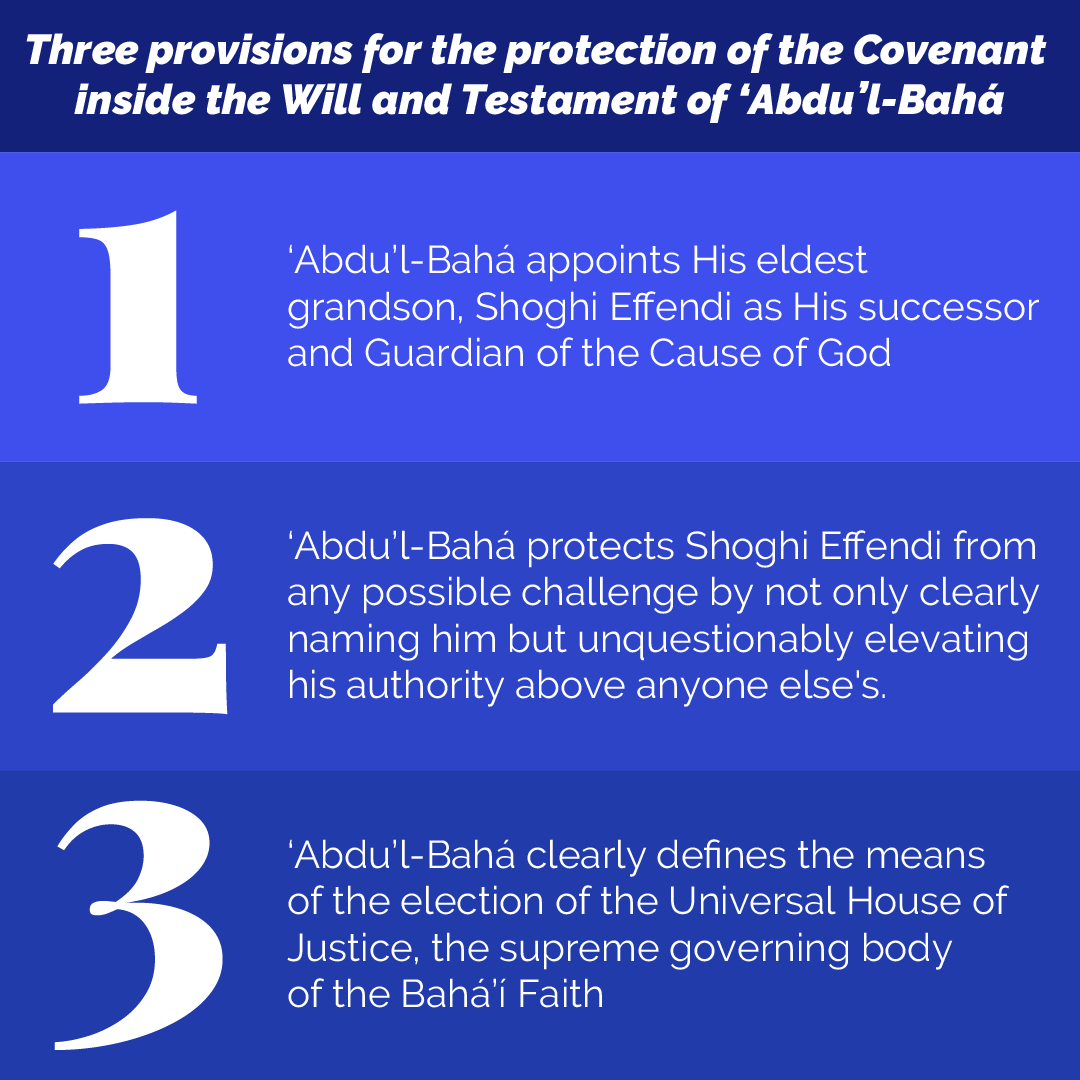
The Will and Testament of ‘Abdu’l-Bahá contains three provisions for the protection of the Bahá'í Faith after the passing of the Center of the Covenant, ‘Abdu'l-Bahá:
- First, ‘Abdu'l-Bahá appoints His eldest grandson, Shoghi Effendi as His successor and Guardian of the Cause of God..
- Second, He protects Shoghi Effendi from any possible challenge by not only clearly naming him but unquestionably elevating his authority above anyone else's.
- Lastly, ‘Abdu'l-Bahá clearly defines the means by which the Universal House of Justice, the supreme governing body of the Bahá'í Faith instituted by Bahá'u'lláh, should come into being.
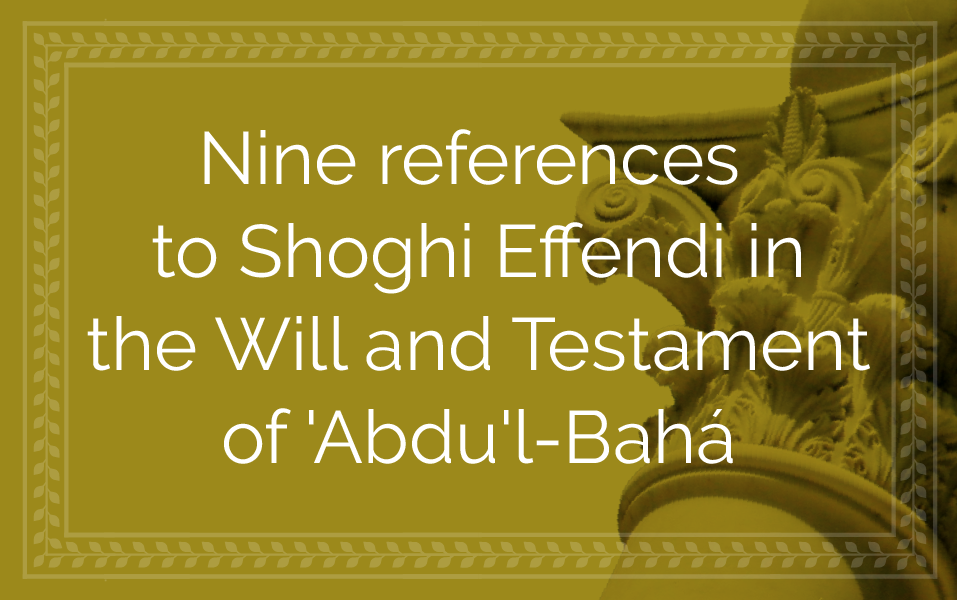
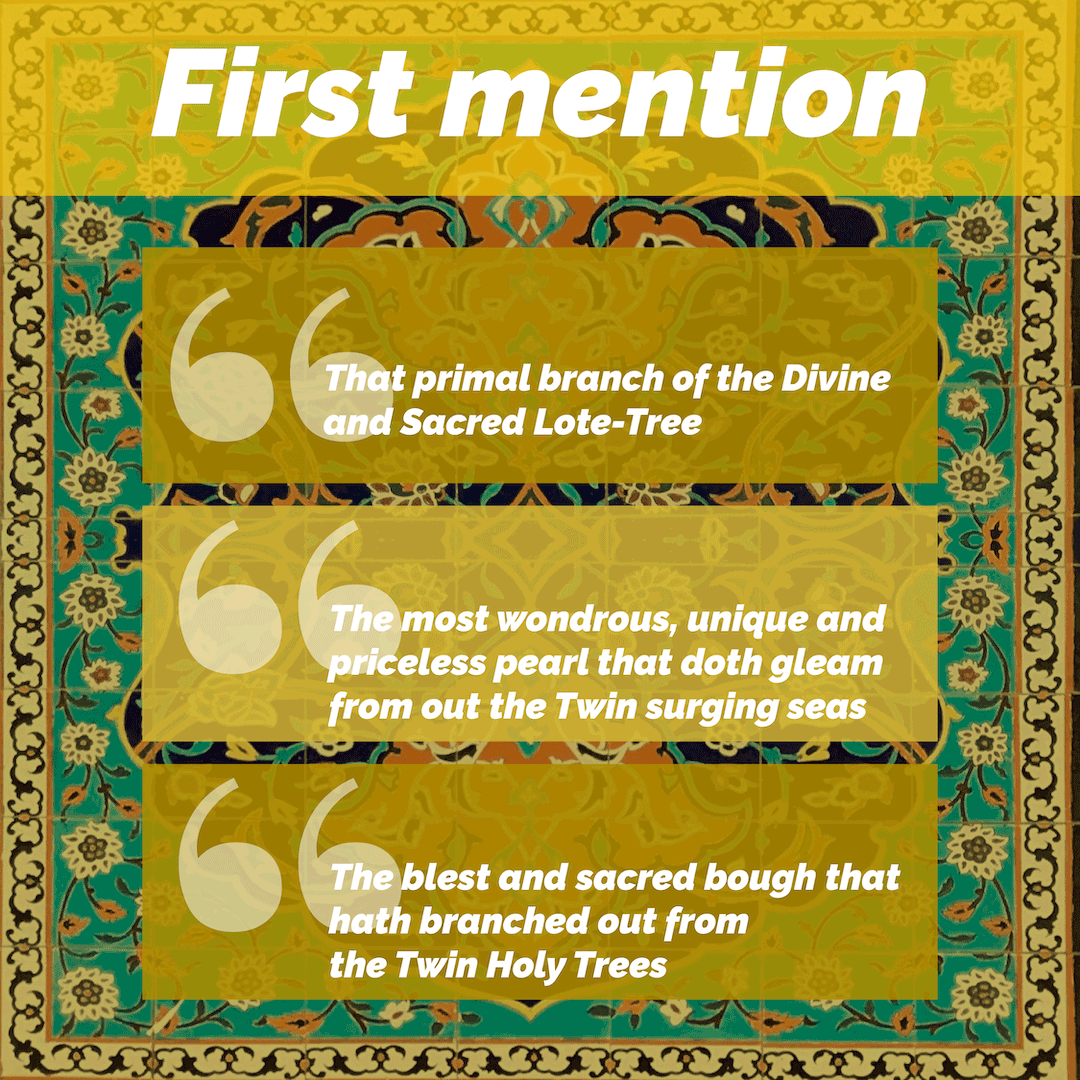
Background floral tile pattern photo by elnaz asadi on Unsplash.
The Will and Testament is a long document, dealing with many, many subjects, such as obedience to Government, the behavior of Bahá'ís, the Covenant and Covenant-breaking, Mírzá Yaḥyá, Mírzá Muḥammad-'Alí, Mírzá Badí’u’lláh, the Universal House of Justice, the Hands of the Cause, the Supreme Tribunal, 'Abdu'l-Bahá’s immense suffering and many other themes, and deserves careful study.
Here, we will be looking closely at the mentions of Shoghi Effendi’s station in the Master’s Will and Testament.
The first mention of Shoghi Effendi is in paragraph 3 of Part One:
Salutation and praise, blessing and glory rest upon that primal branch of the Divine and Sacred Lote-Tree, grown out, blest, tender, verdant and flourishing from the Twin Holy Trees; the most wondrous, unique and priceless pearl that doth gleam from out the Twin surging seas…for behold! he is the blest and sacred bough that hath branched out from the Twin Holy Trees. Well is it with him that seeketh the shelter of his shade that shadoweth all mankind.
This paragraph is long and only references to Shoghi Effendi were kept. It begins majestically, describing Shoghi Effendi as the “primal branch” of the Twin Holy Trees of the families of the Báb and Bahá'u'lláh, and re-emphasizes this point by calling him the “priceless pearl” that gleams from the Twin surging seas, again, the families of both Manifestations of God. At the end of the paragraph, 'Abdu'l-Bahá insists again on Shoghi Effendi’s dual heritage by referring to him as “the blest and sacred bough that has branched out from the Twin Holy Trees.”
This entire paragraph, a masterfully eloquent opening to His Will and Testament, sets forward incontrovertibly that Shoghi Effendi’s station is far beyond anyone else in 'Abdu'l-Bahá’s family. 'Abdu'l-Bahá makes the point three times.
The last time 'Abdu'l-Bahá speaks about Shoghi Effendi in this paragraph, He uses a turn of phrase Bahá'u'lláh had once used to describe Him, and the similarity is extraordinary:
This is how Bahá'u'lláh had spoken about 'Abdu'l-Bahá’s station in the Súriy-i-Ghúṣn:
There hath branched from the Sadratu’l-Muntahá this sacred and glorious Being, this Branch of Holiness; well is it with him that hath sought His shelter and abideth beneath His shadow.
And compare it to this sentence, 'Abdu'l-Bahá speaking about Shoghi Effendi in His Will and Testament:
behold! he is the blest and sacred bough that hath branched out from the Twin Holy Trees. Well is it with him that seeketh the shelter of his shade that shadoweth all mankind.
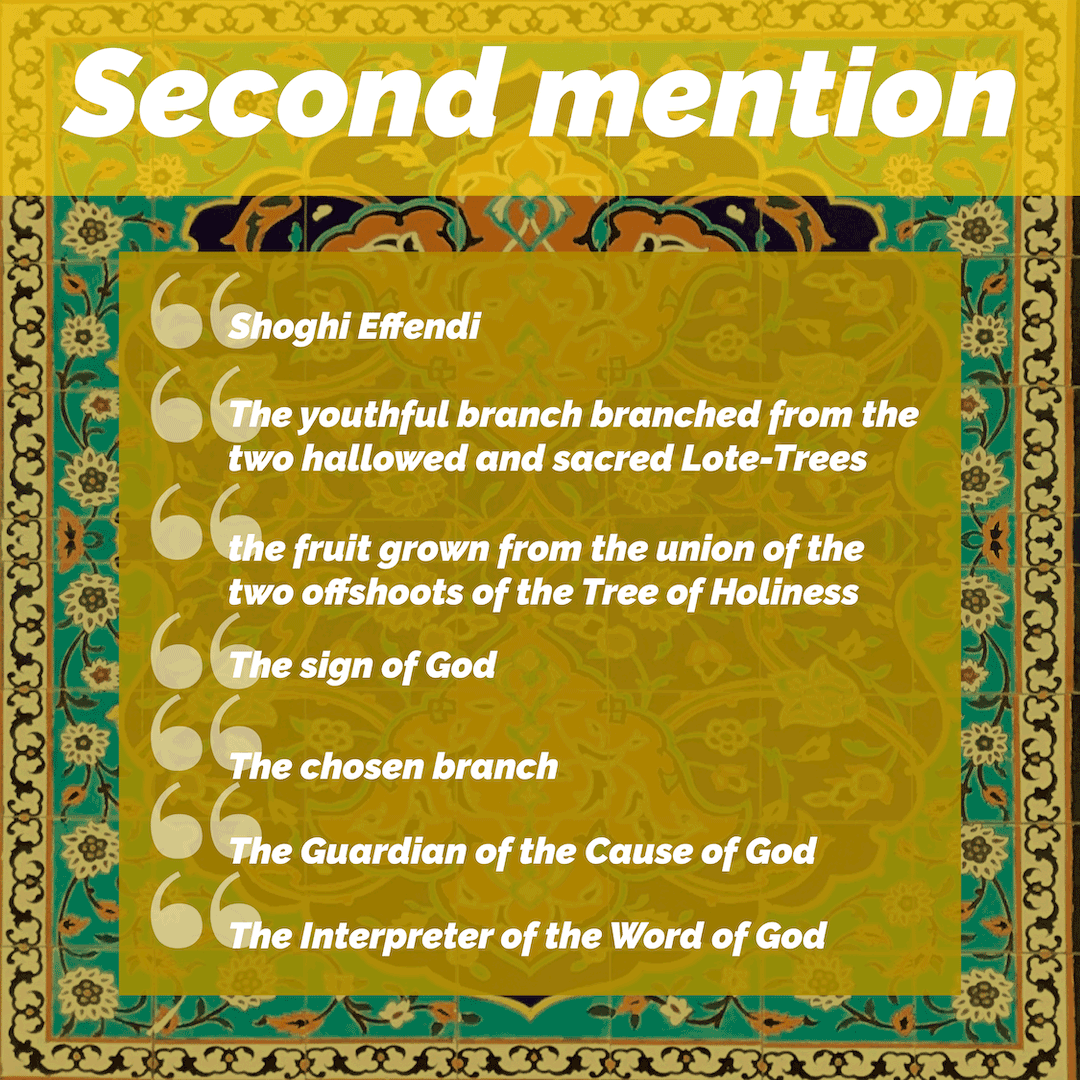
Background floral tile pattern photo by elnaz asadi on Unsplash.
'Abdu'l-Bahá expounds again on Shoghi Effendi’s station in paragraph 17 of Part One:
O my loving friends! After the passing away of this wronged one, it is incumbent upon the Aghsán (Branches), the Afnán (Twigs) of the Sacred Lote-Tree, the Hands (pillars) of the Cause of God and the loved ones of the Abhá Beauty to turn unto Shoghi Effendi—the youthful branch branched from the two hallowed and sacred Lote-Trees and the fruit grown from the union of the two offshoots of the Tree of Holiness,—as he is the sign of God, the chosen branch, the Guardian of the Cause of God, he unto whom all the Aghsán, the Afnán, the Hands of the Cause of God and His loved ones must turn. He is the Interpreter of the Word of God and after him will succeed the first-born of his lineal descendents.
In the opening line of this paragraph, 'Abdu'l-Bahá makes two references to Shoghi Effendi’s exalted lineage: “the youthful branch branched from the two hallowed and sacred Lote-Trees” and “the fruit grown from the union of the two offshoots of the Tree of Holiness.”
Immediately after this, 'Abdu'l-Bahá bestows three extraordinarily important titles on Shoghi Effendi, perhaps the three most important phrases in the entire Will and Testament. 'Abdu'l-Bahá calls Shoghi Effendi “the Sign of God,”, “the Guardian of the Cause of God,” and “the Interpreter of the Word of God,” and calls on all male descendants and relatives of the Báb and Bahá'u'lláh, and the Hands of the Cause to turn to him.
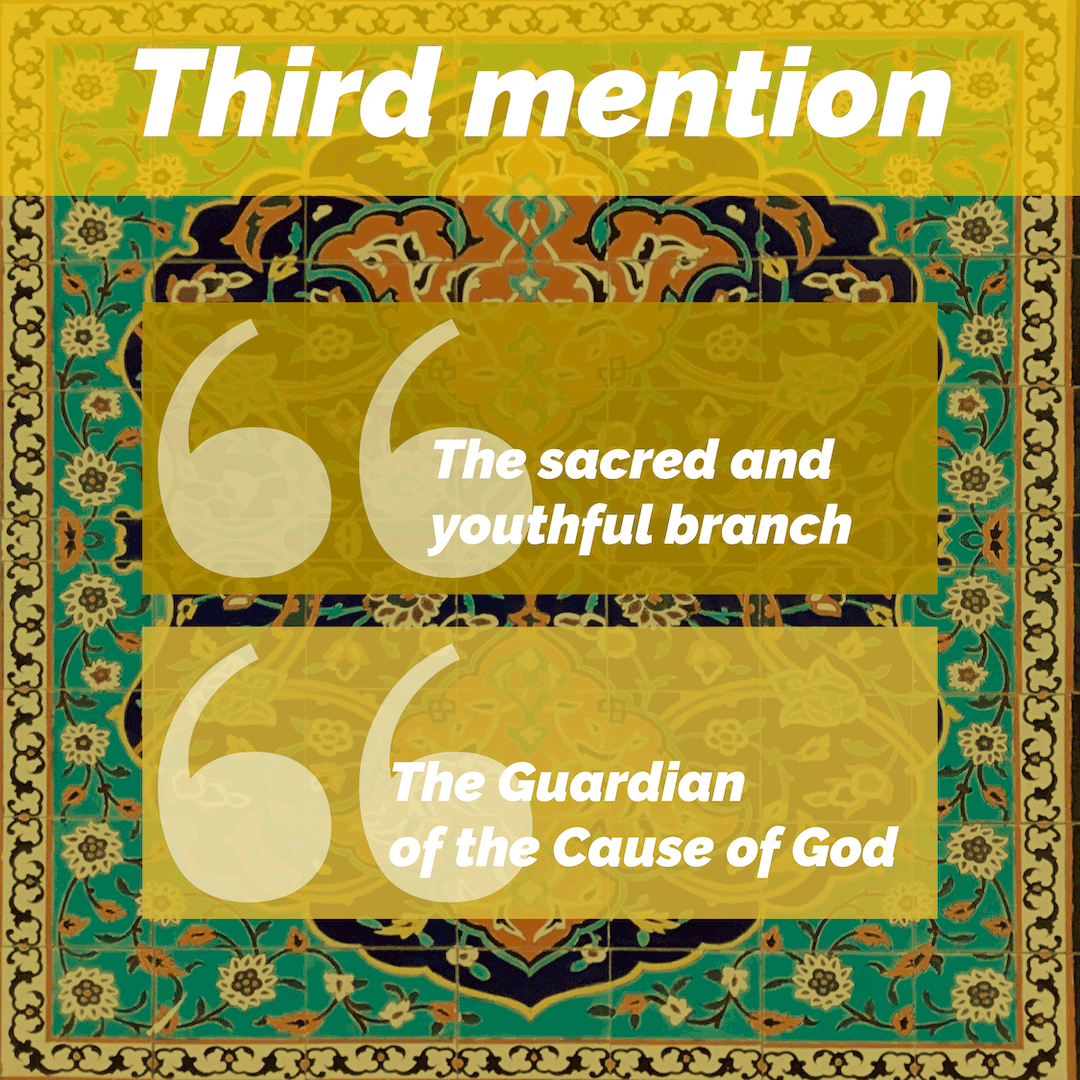
Background floral tile pattern photo by elnaz asadi on Unsplash.
Immediately after the paragraph in which 'Abdu'l-Bahá officially calls Shoghi Effendi the Guardian for the first time, He continues, in the very next section, paragraph 18, and opens with his title instead of his name for the first time in the Will and Testament:
The sacred and youthful branch, the Guardian of the Cause of God, as well as the Universal House of Justice to be universally elected and established, are both under the care and protection of the Abhá Beauty, under the shelter and unerring guidance of the Exalted One (may my life be offered up for them both). Whatsoever they decide is of God.
This paragraph is immensely important because it lays out as fact the infallibility of the Guardian and the Universal House of Justice with the sentence: “the Guardian of the Cause of God, as well as the Universal House of Justice…are both under the care and protection of the Abhá Beauty, under the shelter and unerring guidance of the Exalted One. Whatsoever they decide is of God.”
The remainder of this long paragraph, which has been omitted, consists of 'Abdu'l-Bahá issuing several extremely emphatic warnings against Covenant-breaking. 'Abdu'l-Bahá cautioning all Bahá'ís to obedience, firmness and steadfastness in the Covenant, and 'Abdu'l-Bahá delineates all possible spiritual dangers in this matter:
- Disobeying the Guardian or the Universal House of Justice;
- Rebelling against them;
- Opposing them;
- Contending with them;
- Disputing with them;
- Denying them;
- Disbelieving in them;
- Deviating from them;
- Separating from them;
- Turning aside from them;
And lest there be any doubt, 'Abdu'l-Bahá applies all these warnings implicitly to the Members of the Universal House of Justice who are bound to the Guardian with obedience, submissiveness and subordination.
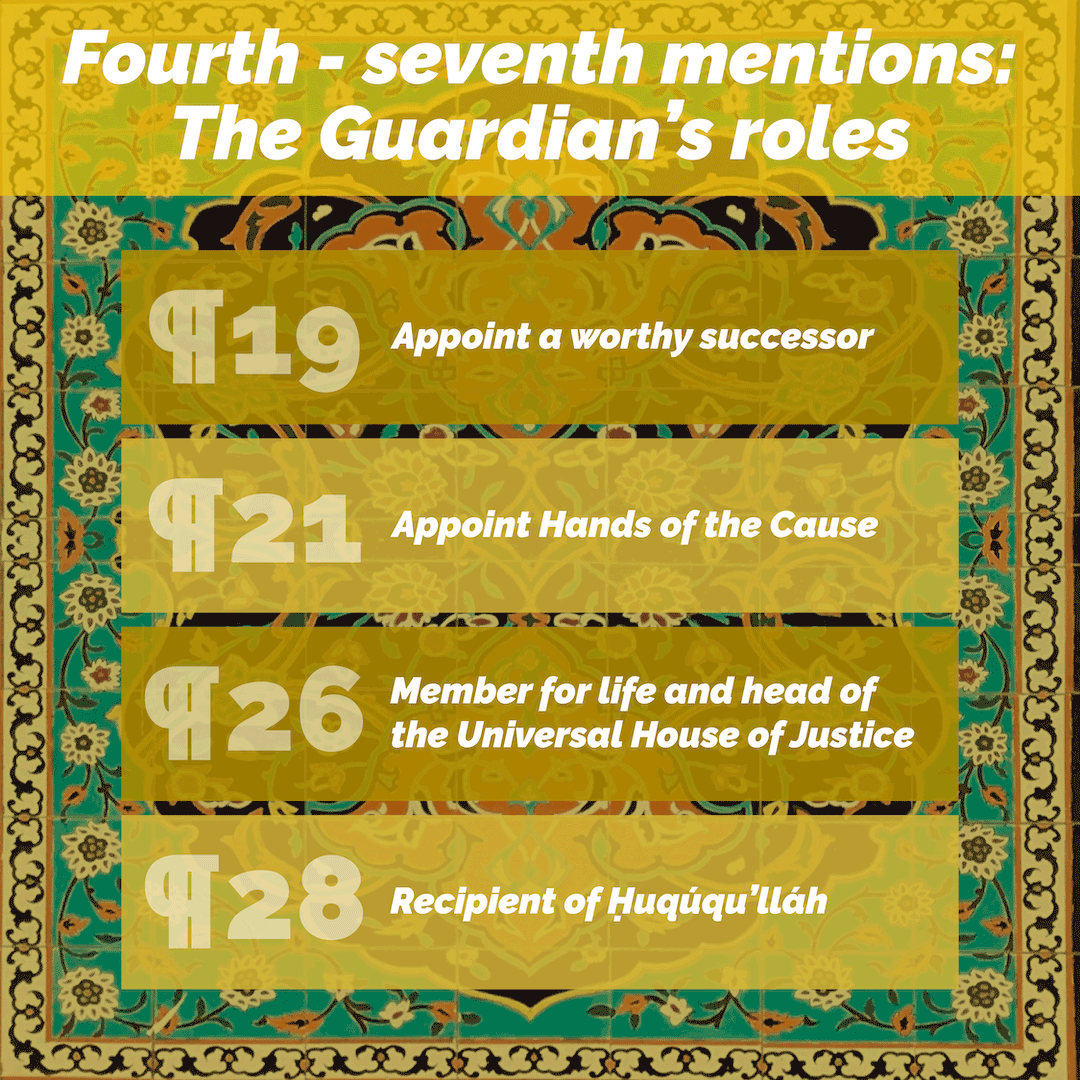
Background floral tile pattern photo by elnaz asadi on Unsplash.
In the rest of Part One, 'Abdu'l-Bahá specifies several roles for the Guardian inside thematic paragraphs on other topics:
- In paragraph 19, 'Abdu'l-Bahá states that the Guardian must appoint a worthy successor in his lifetime;
- In paragraph 21 He says that the Guardian must appoint Hands of the Cause, who act under his command;
- In paragraph 26 'Abdu'l-Bahá appoints the Guardian as member for life and head of the Universal House of Justice;
- And in paragraph 28 'Abdu'l-Bahá directs that Ḥuqúqu’lláh must be paid to the Guardian of the Cause.
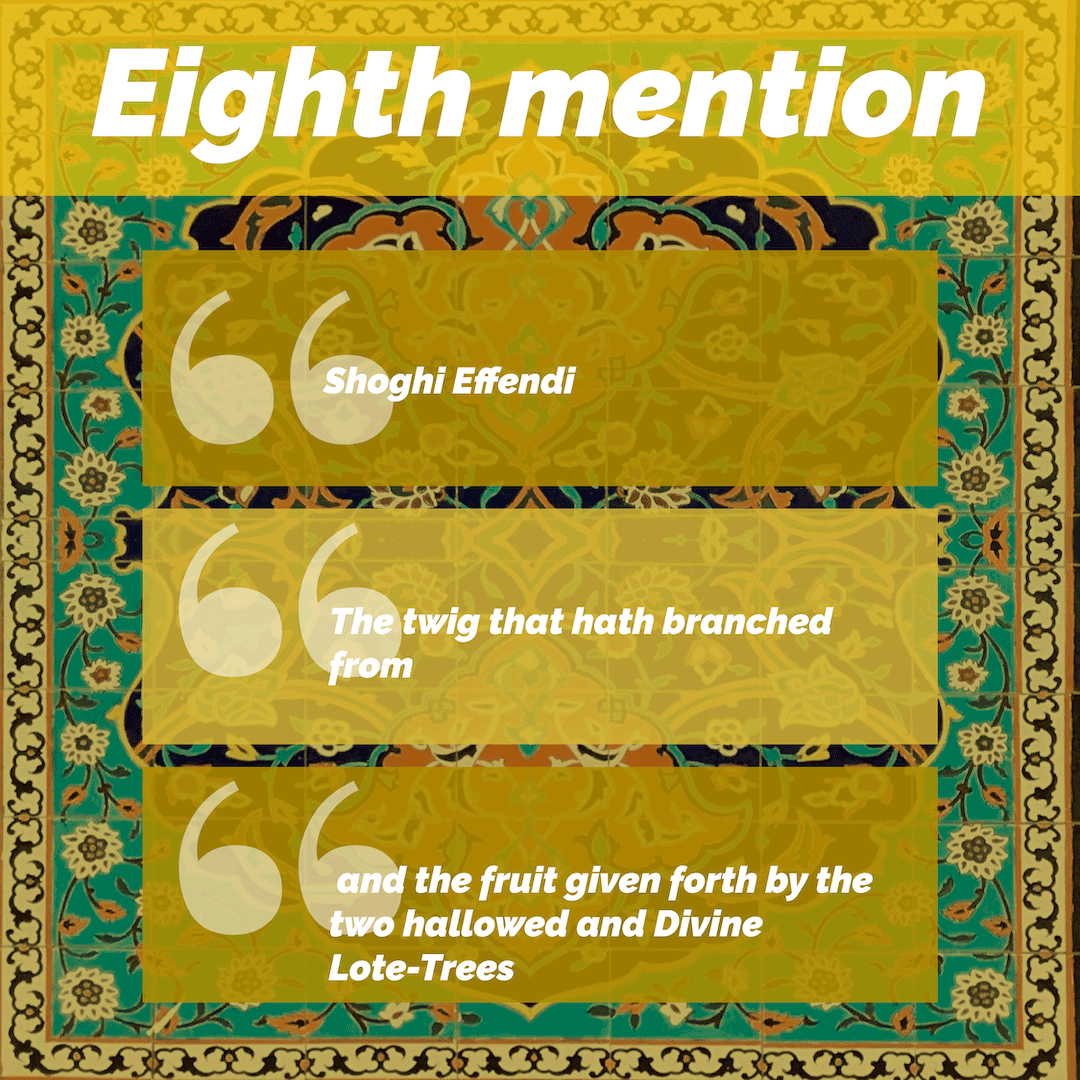
Background floral tile pattern photo by elnaz asadi on Unsplash.
Shoghi Effendi is not mentioned in Part Two of 'Abdu'l-Bahá’s Will and Testament, and the next mention appears in the penultimate paragraph of the entire Will before a closing greeting, paragraph 12, where the Master has touching words about the well-being of His grandson:
O ye the faithful loved ones of `Abdu'l-Bahá! It is incumbent upon you to take the greatest care of Shoghi Effendi, the twig that hath branched from and the fruit given forth by the two hallowed and Divine Lote-Trees, that no dust of despondency and sorrow may stain his radiant nature, that day by day he may wax greater in happiness, in joy and spirituality, and may grow to become even as a fruitful tree.
This paragraph contains the fifth mention of Shoghi Effendi’s descendance of the ‘Báb and Bahá'u'lláh: “the twig that hath branched from and the fruit given forth by the two hallowed and Divine Lote-Trees.” By repeating this unalienable fact, 'Abdu'l-Bahá is establishing Shoghi Effendi’s undeniable right as His chosen successor.
'Abdu'l-Bahá speaks tender and loving words about His favored grandson, entrusting him to the followers of Bahá'u'lláh, who are asked to not only care for him, but endeavor to prevent him from being hurt and saddened.
This is a deeply intimate section, one where we can hear 'Abdu'l-Bahá the Grandfather as well as 'Abdu'l-Bahá the Center of the Covenant speaking about a being He knows as well as His own self. 'Abdu'l-Bahá knew that at the heart of Shoghi Effendi was a deeply radiant nature, and He also knew that, as the Guardian, he would accomplish so much if only he were happy and joyful. Unfortunately, Shoghi Effendi would fulfill his role burdened by sorrow and heartbreak. How much more he could have done had the Bahá'ís only obeyed the Master and been faithful.
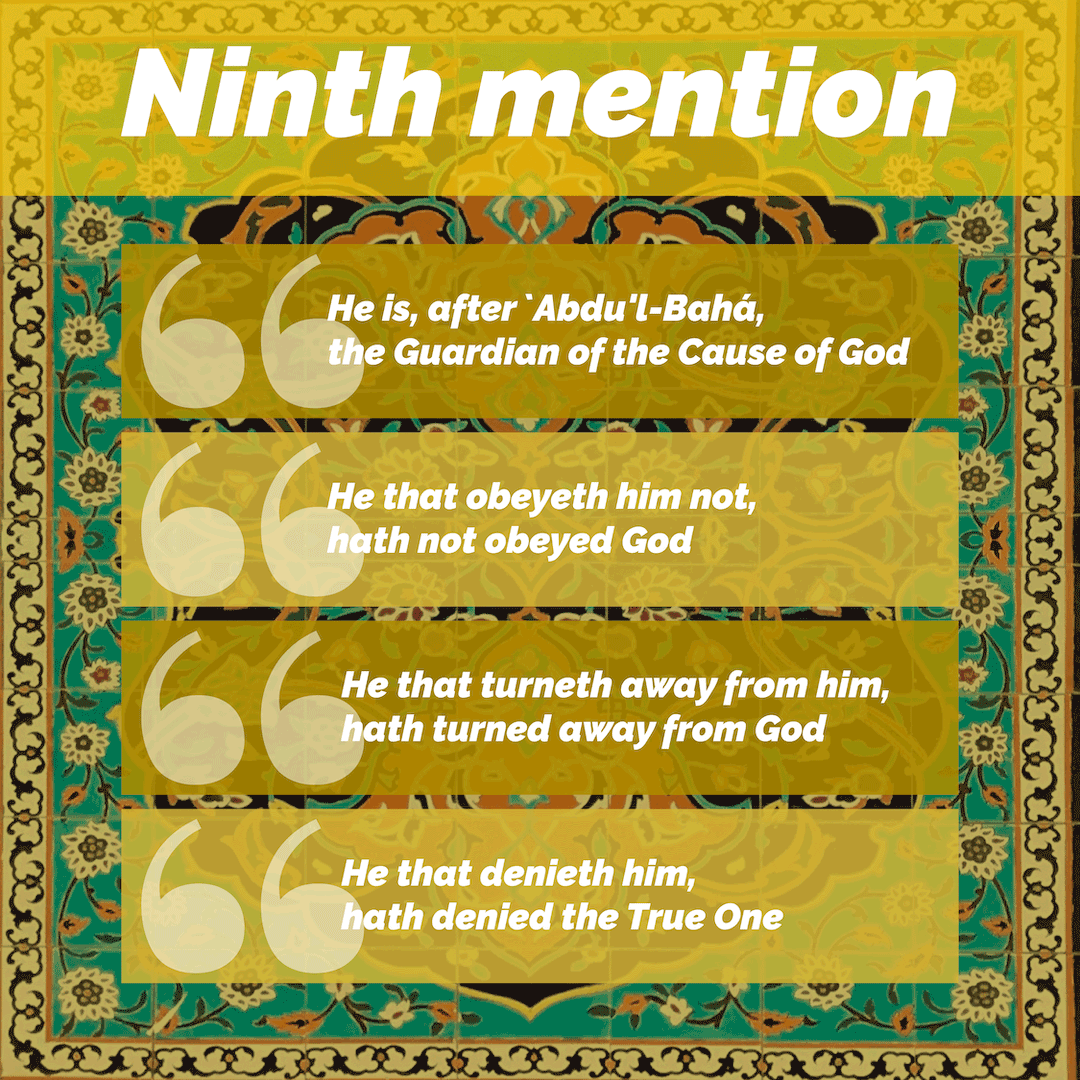
Background floral tile pattern photo by elnaz asadi on Unsplash.
Immediately following the previous paragraph is the penultimate paragraph of the entire Will before a closing greeting, paragraph 13, where the Master reiterates the power of the Covenant:
For he is, after `Abdu'l-Bahá, the Guardian of the Cause of God, the Afnán, the Hands (pillars) of the Cause and the beloved of the Lord must obey him and turn unto him. He that obeyeth him not, hath not obeyed God; he that turneth away from him, hath turned away from God and he that denieth him, hath denied the True One. Beware lest anyone falsely interpret these words, and like unto them that have broken the Covenant after the Day of Ascension (of Bahá'u'lláh) advance a pretext, raise the standard of revolt, wax stubborn and open wide the door of false interpretation. To none is given the right to put forth his own opinion or express his particular conviction. All must seek guidance and turn unto the Center of the Cause and the House of Justice. And he that turneth unto whatsoever else is indeed in grievous error.
The words “For he is, after 'Abdu'l-Bahá, the Guardian of the Cause” are majestic and could not be clearer. 'Abdu'l-Bahá has, several times in this Will and Testament, made it clear that Shoghi Effendi is His chosen and worthy successor, but these words are a definite statement of fact that leaves no room for interpretation.
'Abdu'l-Bahá’s repeats the same instruction in the last words of His Will and Testament as in paragraph 17 of Part One: the descendents of the Báb and Bahá'u'lláh, the Hands of the Cause and all Bahá'ís must obey and turn to Shoghi Effendi, the Guardian of the Cause of God.
The Master cautions the disobedient and the unfaithful, and warns the Bahá'ís not to let the Covenant-breaking that had arisen after Bahá'u'lláh’s Ascension repeat itself after His own passing.
In closing His Will and Testament, 'Abdu'l-Bahá’s last words are a final warning to turn to the Guardian and the Universal House of Justice.
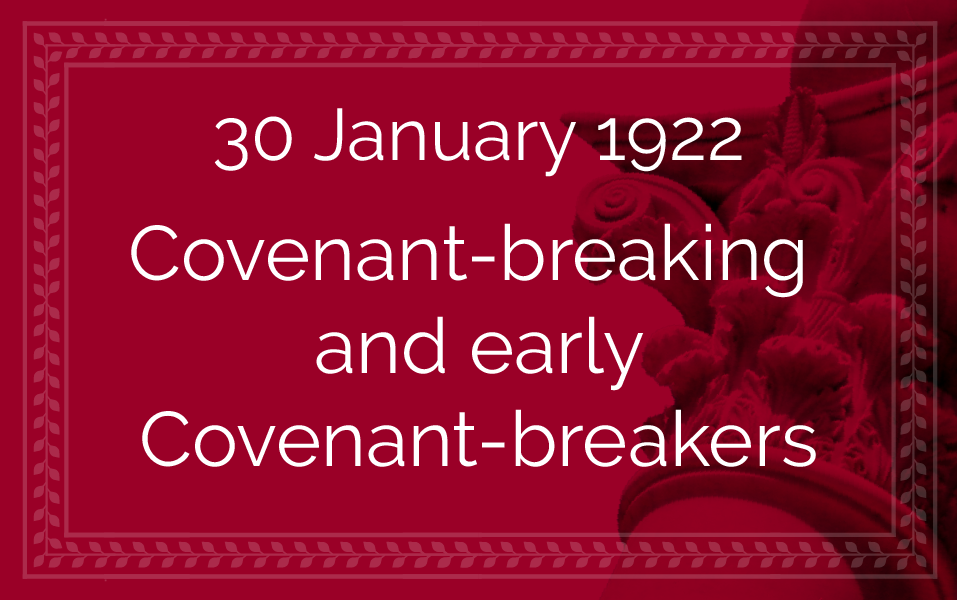
The ministry of the Guardian was characterized by a stupendous release of spiritual forces which enabled Shoghi Effendi to prosecute his divinely-ordained charge with colossal success.
He single-handedly spearheaded the birth of the Administrative Order, lovingly encouraged its nascent institutions worldwide, he increased the endowments of the Faith at the Bahá'í World Centre and in countries all around the world, he built the superstructure of the Shrine of the Báb, the Monument Gardens, the International Bahá'í Archives, he launched three major teaching Plans and led the Bahá'ís to unprecedented victories in the promulgation of the Faith of Bahá'u'lláh.
On the other hand, throughout the 36 years of his ministry, he was plagued by untold suffering, agony, anguish, and tribulation at the hands of Covenant-breakers.
These two aspects of the Guardian’s ministry: the light of his superb achievements and the and the dark shadow of Covenant-breaking, are inseparable parts of his life.
Covenant-breakers arose to oppose the Guardian as Head of the Cause. These dark-hearted individuals were consumed with ambition, insanity, hatred, ego, jealousy. They thought they could either destroy the Faith, discredit the Guardian, or take over his position, setting themselves up as a rival faction, and win the Bahá'ís to their side and their own erroneous, blatantly false interpretation of the Teachings of Bahá'u'lláh, eventually running the Bahá'í Faith the proper way, meaning the way they thought it should be run.
No one ever succeeded. But they did not stop trying.
But the Covenant-breaker ringleaders did manage to win the souls of misguided, foolish Bahá'ís. The excommunicated outliers continued to try and win over and pervert the faithful Bahá'ís.
To help us understand Covenant-breaking, Rúḥíyyih Khánum explains the principle of light and shadow, the brighter the light at the center of the Faith, the darker and blacker the shadow of Covenant-breaking:
No proper picture of Shoghi Effendi's life can be obtained without reference to the subject of Covenant-breaking. The principle of light and shadow, setting each other off, the one intensifying the other, is seen in nature and in history; the sun casts shadows; at the base of the lamp lies shadow; the brighter the light the darker the shadow; the evil in men calls to mind the good, and the greatness of the good underlines the evil.
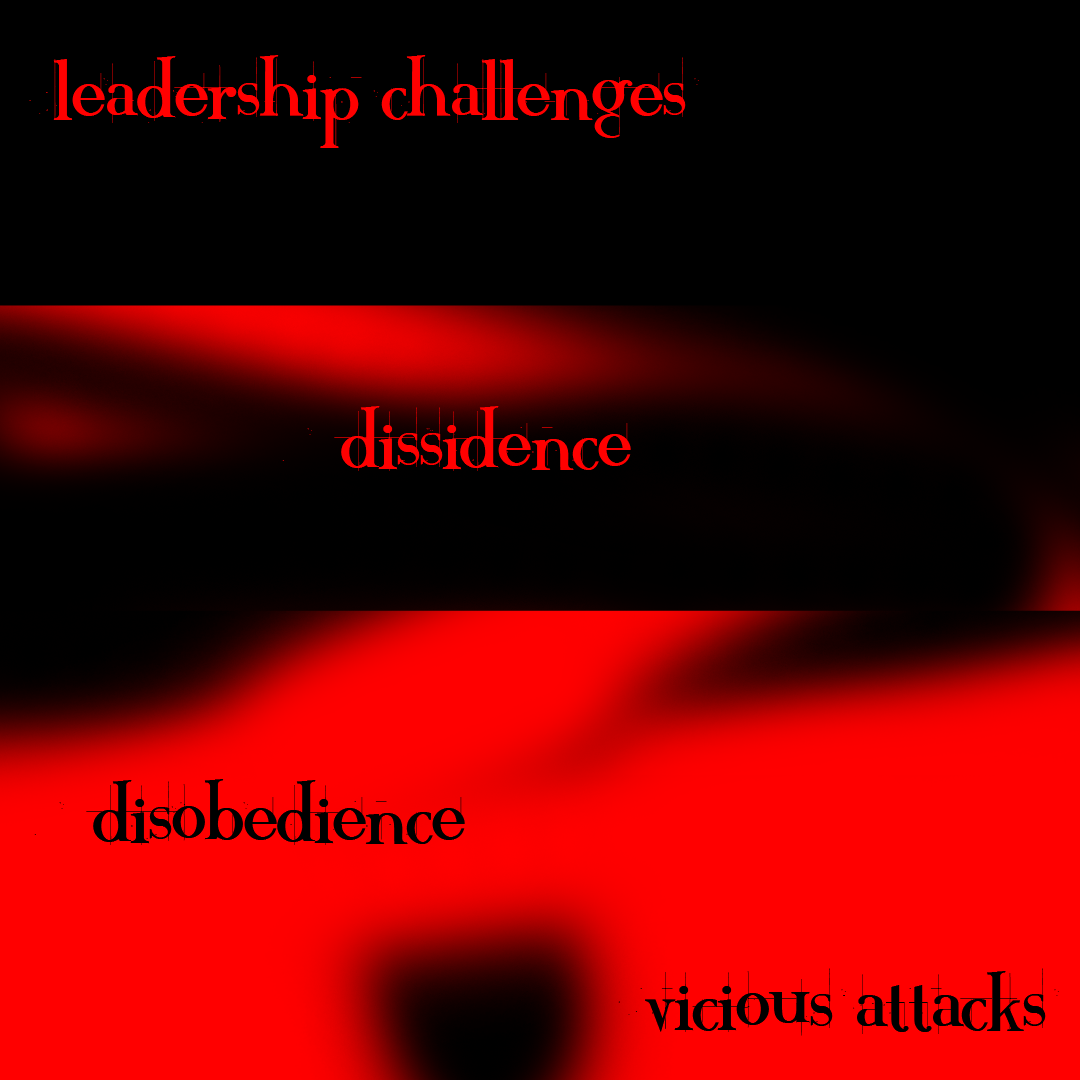
Bahá'í author and research Dr. Moojan Momen isolates four types of Covenant-breaking in the Bahá'í Faith:
- Leadership challenges: People who dispute either the legitimacy of the authority of the Head of the Faith, claiming they are the rightful authority. These include Mírzá Muḥammad-'Alí and Mason Remey, after the Guardian’s passing.
- Dissidence: Individuals who disagree with the policies and actions of the Head of the Faith but don’t claim leadership. These include: Ahmad Sohrab and Ruth White.
- Disobedience: These are believers who disobey a direct instruction from the Head of the Faith, such as ceasing to associate with Covenant-breakers.
- Vicious attacks: In this category are former Bahá'ís who maliciously attack the Bahá'í Faith. An example of this is Avárih.
We will be looking at the main Covenant-breakers during the Guardian’s ministry: Avárih, Ruth White, Ahmad Sohrab, and Shoghi Effendi’s family in the following sections throughout the chronology.
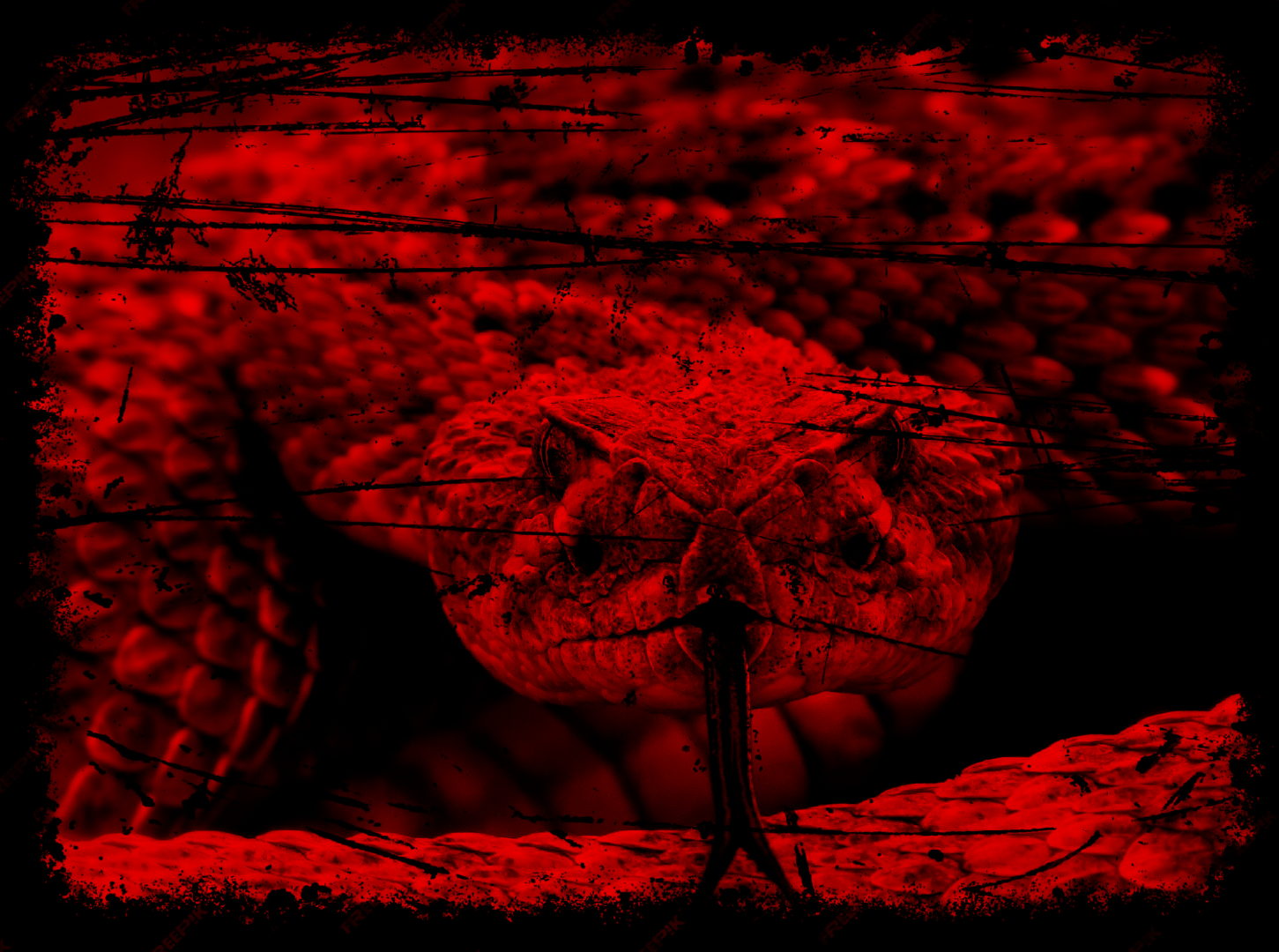
“Snake.” Original photo: Photo by Meg Jerrard on Unsplash.
Towards the end of 'Abdu'l-Bahá’s ministry, the old band of Covenant-breakers led by Mírzá Muḥammad-'Alí—the Arch-breaker of the Covenant of Bahá'u'lláh and the faithless half-brother of 'Abdu'l-Bahá—had receded into the shadows because of 'Abdu'l-Bahá’s magnetic personality and the years of prestige that characterized the last decades of His extraordinary life, including His Knighthood by the British government, His majestic Tablets of the Divine Plan, and the esteem in which the British authorities held Him.
After the Ascension of 'Abdu'l-Bahá, when Shoghi Effendi became the Guardian, when the Bahá'í world itself wad dimmed and weakened with grief, the old Covenant-breakers from the time of the Master crawled out their dark recesses and took full advantage of the shock caused by the Master’s passing, particularly during the eight months when Shoghi Effendi had to leave the Holy Land for Switzerland.
This was when Covenant-breakers found themselves infused with a new supply of venomous, mischievous energy, and they unleashed their attacks on the Faith of Bahá'u'lláh and its 24-year-old leader. The old guard of Covenant-breakers, led by Mírzá Muḥammad-'Alí enrolled the entire family of 'Abdu'l-Bahá under into their black cause, and the defection of the entirety of Shoghi Effendi’s relatives is addressed in full in 1941.
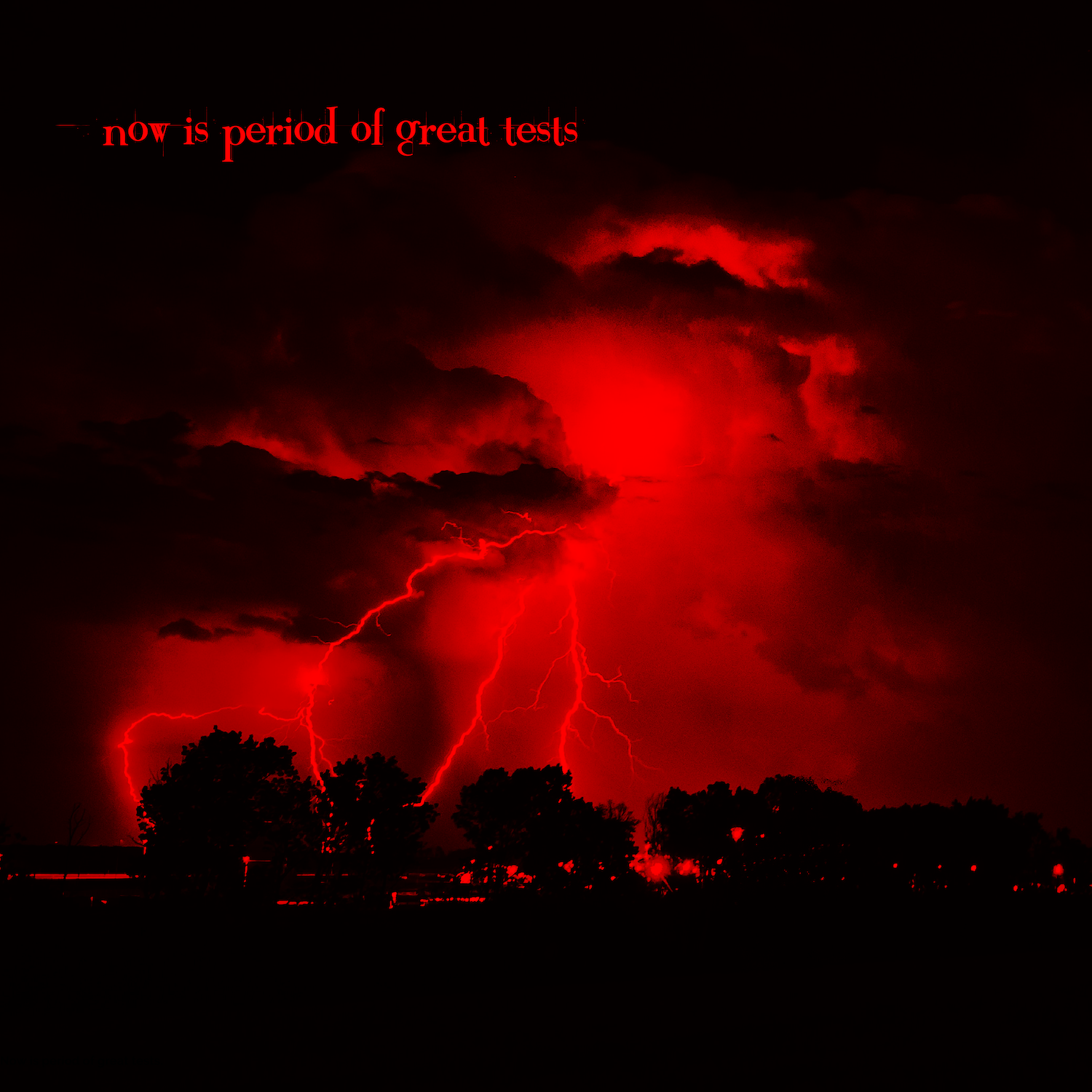
“Gathering Storm.” Original photo: Photo by Max LaRochelle on Unsplash.
In the weeks before and after 'Abdu'l-Bahá’s passing, He and the Greatest Holy Leaf had to manage worldwide rumblings of Covenant-breaking.
'Abdu'l-Bahá had been deeply concerned with Covenant-breaking in America, and had cabled Roy Wilhelm who responded on 8 November 1921 that there were serious Covenant-breaking activities in Chicago, Washington and Philadelphia from the henchmen of Mírzá Muḥammad-'Alí, the Arch-breaker of the Covenant of Bahá'u'lláh.
'Abdu'l-Bahá had responded with a cable that ended:
Certainly shun violators.
By 14 December 1921, two weeks before Shoghi Effendi arrived in Haifa, the Greatest Holy Leaf sent a cable to America following up on the Covenant-breaking activity there, with strict instructions:
Now is period of great tests. The friends should be firm and united in defending the Cause. Nakeseens [Covenant-breakers] starting activities through press other channels all over world. Select committee of wise cool heads to handle press propaganda in America.
In America, many reports detailed accusations and facts on the new Guardian, and Shoghi Effendi received a letter from a staunch American Bahá'u'lláh on 18 January 1922 which read:
As you know we are having great troubles and sorrows with violators in the Cause in America. This poison has penetrated deeply among the friends…
Shortly after 'Abdu'l-Bahá's Ascension, Mírzá Muḥammad-'Alí, His disgruntled and treacherous half-brother, had filed a claim, based on Islamic law for a portion of the 'Abdu'l-Bahá’s estate.
By 24 January 1922, the High Commissioner for Palestine, Sir Herbert Samuel demanded from Shoghi Effendi to be informed what was going on with the situation:
I am much interested to learn of the measures that have been taken to provide for the stable organization of the Bahá'í Movement.
Shoghi Effendi was beginning his Guardianship having inherited this volatile Covenant-breaking situation.
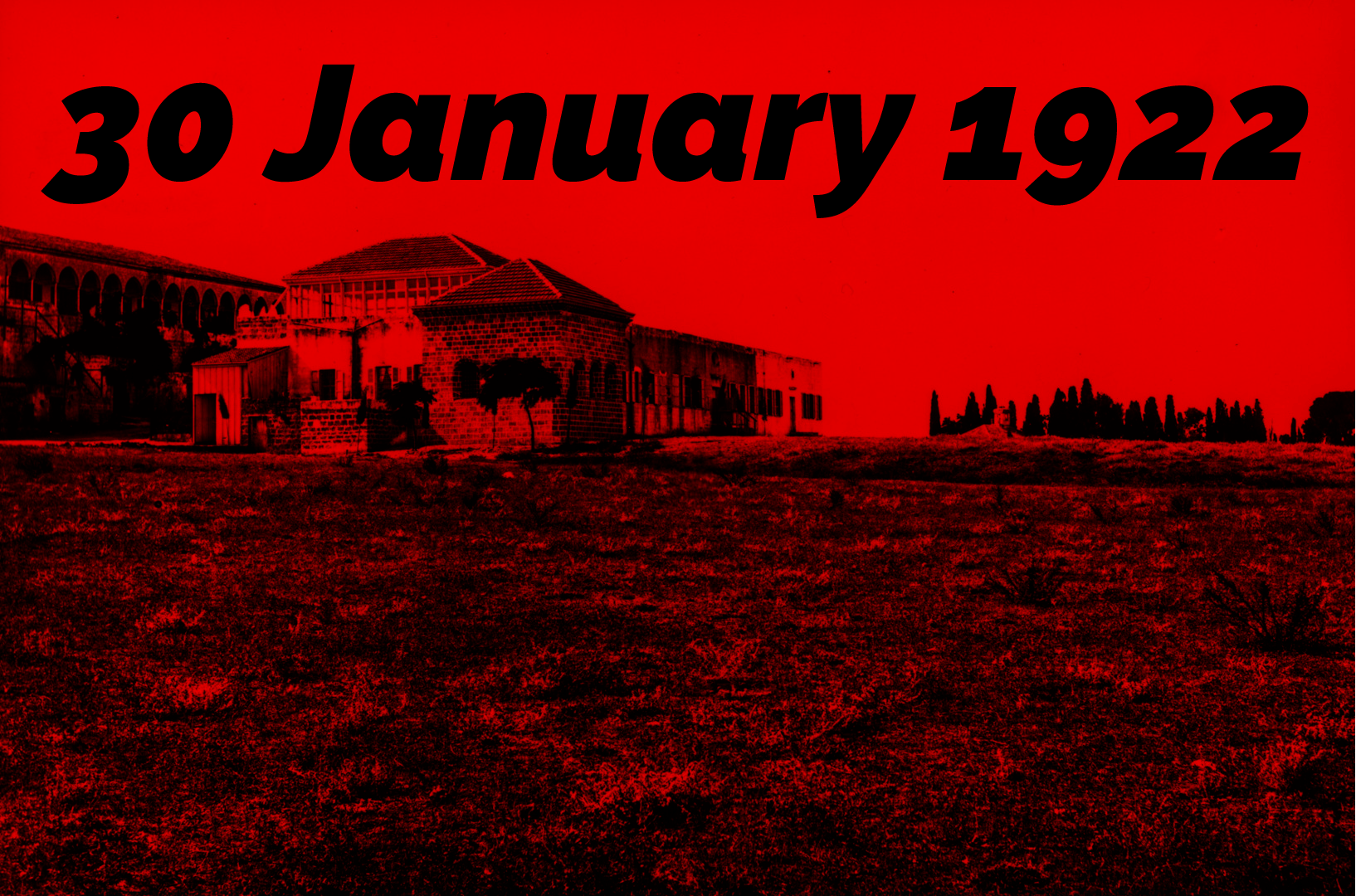
Original image: Bahá'í Media Bank, © Bahá'í International Community 2023.
Mírzá Muḥammad-'Alí began actively plotting, and petitioned the civil authorities of Palestine to turn over custodianship of the Shrine of Bahá'u'lláh, stating that he was 'Abdu'l-Bahá’s lawful successor.
The British authorities refused to act in what they saw was a religious dispute, and when Mírzá Muḥammad-'Alí appealed to the Mufti of 'Akká to intervene on his behalf, the Mufti refused, so he sent his younger brother, Mírzá Badí’u’lláh, along with other Covenant-Breakers to the Shrine of Bahá'u'lláh, and on Tuesday 30 January, they stole the keys of the Most Holy Shrine based on their false claim that they were the closest surviving relatives of Bahá'u'lláh.
Their despicable act caused such a commotion in the Bahá'í community that the Governor of 'Akká ordered the keys remanded into the hands of the authorities and refused to return them to Mírzá Muḥammad-'Alí or to Shoghi Effendi.
No one could enter the Shrine, they could only stand outside of it, and Shoghi Effendi was deeply distressed, however, he followed 'Abdu'l-Bahá’s example, and, although encompassed by severe tests, he calmly gave instructions as to where to place lights inside and outside the Shrine, which was being electrified at the time, a process that had been started by the Master in the last months of His life.
On 13 June 1922, the dispute over custody of the Shrine of Bahá'u'lláh was reported to Winston Churchill, stating a number of telegrams from around the world supported Shoghi Effendi’s’ claim.
By 23 June 1922, the government of the British Mandate in Palestine was forced to intervene and a temporary arrangement that the keys of the Shrine of Bahá'u'lláh should be held by the Sub-Governor of 'Akká and be made available to Bahá'í pilgrims and visitors and posted a guard at the entrance, but a decision as to who had the custodianship of the Shrine would not be reached for several months.
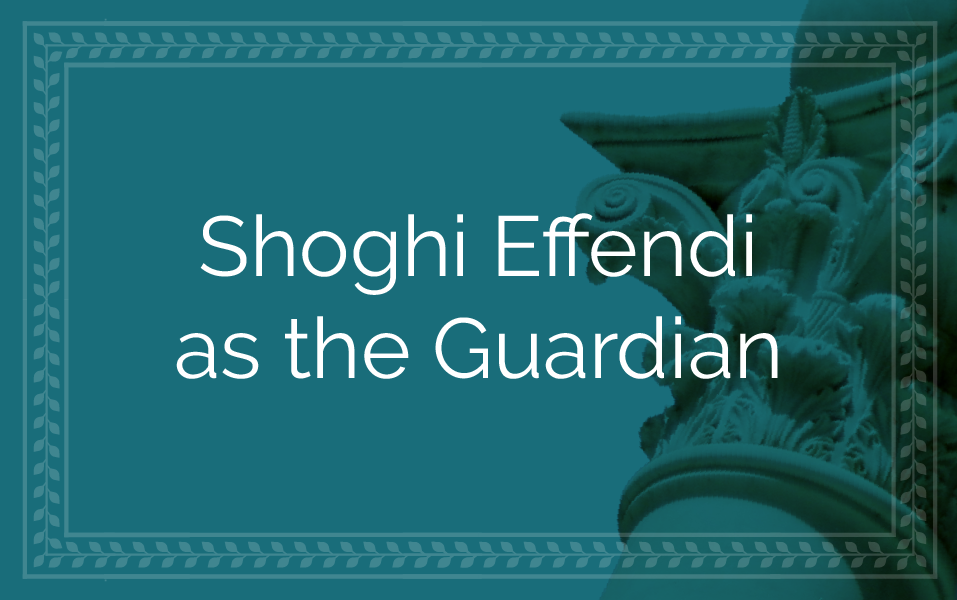

A digital painting of an alembic for distilling essential oils. Original image inspiration: Etsy.
In a deeply significant paragraph of the Priceless Pearl, Rúḥíyyih Khánum describes the “alembic of [the Guardian’s] creative mind.”
Rúḥíyyih Khánum uses the adjective “alembic” for a very specific reason, central to this story, and it is important we understand exactly what she means by it, for us to appreciate the depth of what she is about to share with us regarding the Guardian’s creative mind.
Alembic is usually used as a noun, almost never as an adjective, as Rúḥíyyih Khánum creatively uses it. The roots of the word are found in Medieval Latin, originally from the Greek “ambix” (“cup with a spout”). Alembics were medieval pre-chemistry devices used for distilling liquids—like alcohol—but they were also used in places like Persia, for example for distilling perfume from flowers like violets, gardenias, jasmine, or lilac. In Persia, they used alembics to make rose water or attar of rose. An alembic is a series of two connected devices. For making rosewater, the first would be a small to large copper pot filled with pure water and thousands upon thousands of rose petals, set over a fire. As the water begins to boil, the precious steam is not allowed to escape, but rather gathered into tubes in which the vapor condenses into sweet-smelling rosewater, and it finally distills into an alembic, which at the end of the entire process becomes filled with rose water or attar of rose.
That the Guardian’s mind was “alembic” meant it could distill anything and purify and elevate it. Essentially, what Rúḥíyyih Khánum is saying is that the Guardian’s mind was transformational and would with events, writings, and the Bahá'í Teachings exactly what a physical alembic device did by distilling, transforming thousands of rose petals into precious attar of rose. That is the essence of what Rúḥíyyih Khánum meant.
And so this is what Rúḥíyyih Khánum has to say: over the course of his 36-year ministry, the Guardian of the Cause had distilled in his creative mind all of the component elements of the Faith of Bahá'u'lláh into one, great, indivisible, distilled whole.
He had created a united, tethered worldwide Bahá'í community from a disparate mass of disconnected believers that awoke on 29 November 1921 to find 'Abdu'l-Bahá, their Father, their Leader and the Center of the Covenant, gone.
The Guardian had woven the teachings of the Báb, Bahá'u'lláh, and 'Abdu'l-Bahá into a shining cloak that would clothe and protect the vibrant, organized community of the followers of Bahá'u'lláh for 1,000 years, a cloak, Rúḥíyyih Khánum stated, Which bore the make of the Guardian’s mark:
…a cloak on which the fingers of Shoghi Effendi had picked out the patterns, knitted the seams, fashioned the brilliant protective clasps of his interpretations of the Sacred Texts, never to be sundered, never to be torn away until that day when a new Law-giver comes to the world and once again wraps His creature man in yet another divine garment.
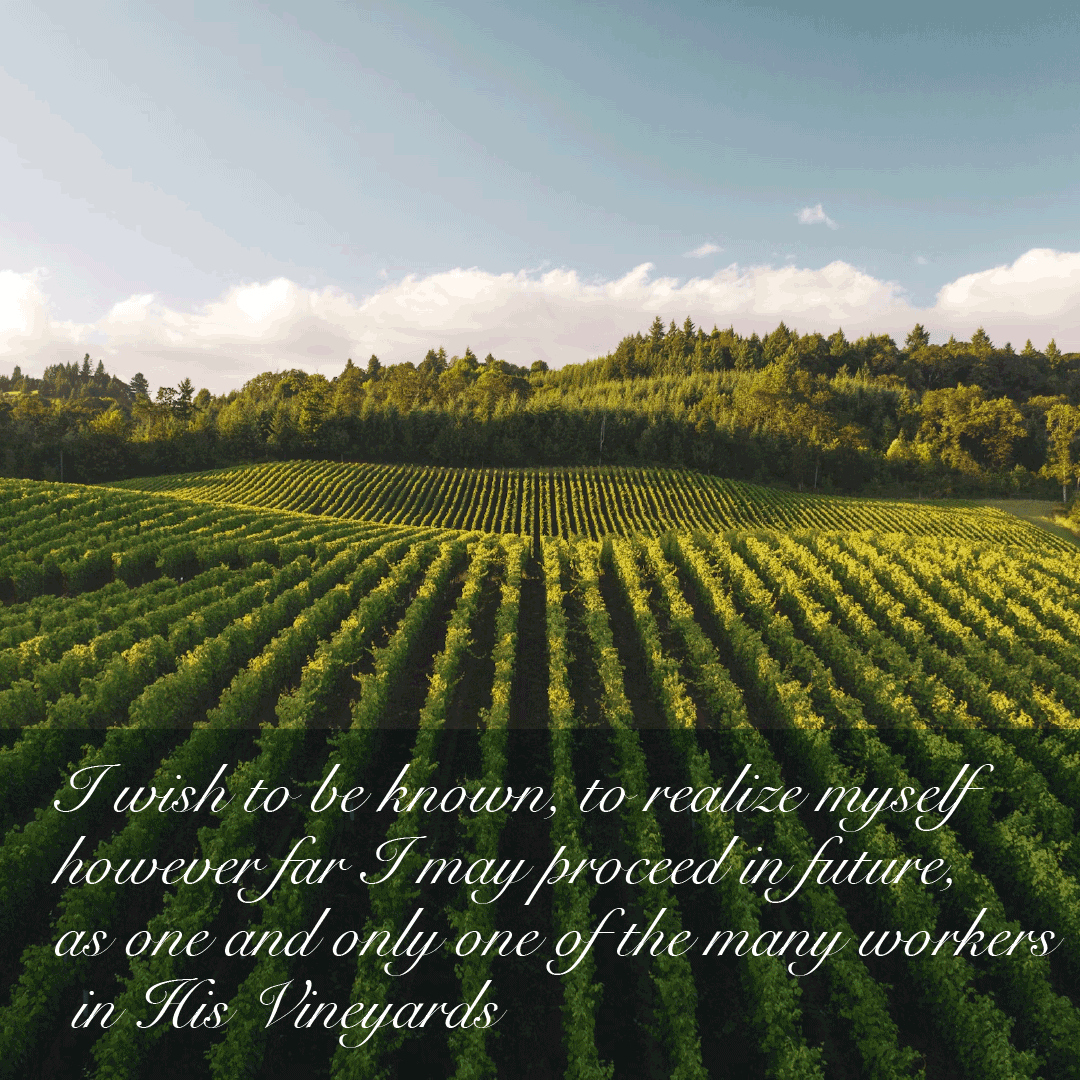
Vineyard photo by Dan Meyers on Unsplash.
From the beginning of his Guardianship, Shoghi Effendi regularly had to readjust the Bahá'ís’ understanding of his position in the Faith.
On 5 March 1922, Shoghi Effendi included a post-script in a letter to the American believers:
May I also express my heartfelt desire that the friends of God in every land regard me in no other light but that of a true brother, united with them in our common servitude to the Master's Sacred Threshold, and refer to me in their letters and verbal addresses always as Shoghi Effendi, for I desire to be known by no other name save the one our Beloved Master was wont to utter, a name which of all other designations is the most conducive to my spiritual growth and advancement
In 1924, Shoghi Effendi cabled India a very definite instruction:
My birthday should not be commemorated.
In 1930, Shoghi Effendi’s secretary had answered a letter with a firm statement on Shoghi Effendi’s station:
Concerning Shoghi Effendi's station: he surely has none except what the Master confers upon him in His Will and that Will also states what Shoghi Effendi's station is. If anyone misinterprets one part of the Will he misinterprets all the Will.
By 1934, Shoghi Effendi addressed the question of his station clear, once and for all:
In the light of this truth to pray to the Guardian of the Faith, to address him as lord and master, to designate him as his holiness, to seek his benediction, to celebrate his birthday, or to commemorate any event associated with his life would be tantamount to a departure from those established truths that are enshrined within our beloved Faith.
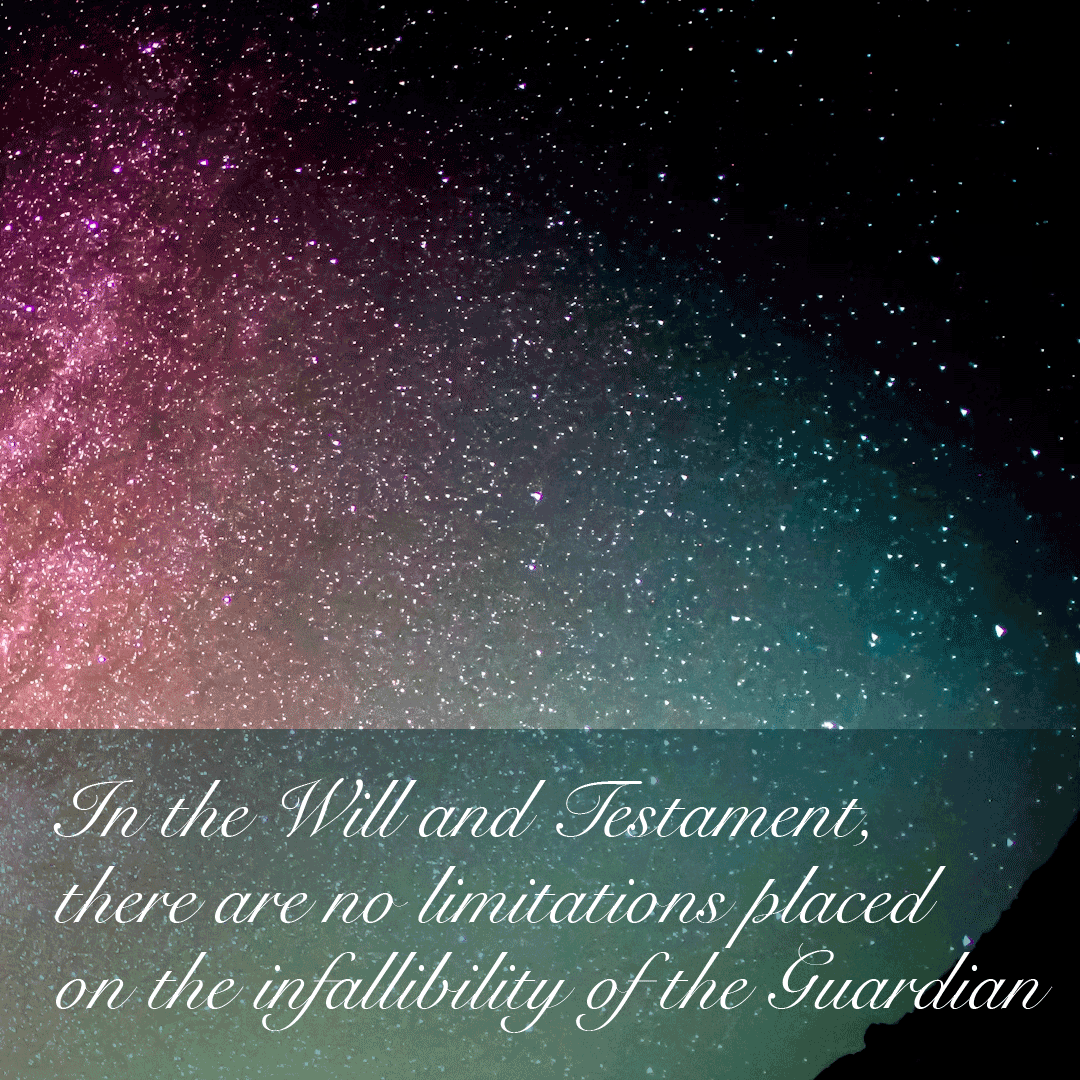
Background photo by Greg Rakozy on Unsplash.
Hand of the Cause Leroy Ioas described witnessing the Guardian’s unerring guidance from God, which encompassed Shoghi Effendi at all times—the infallibility conferred upon him by his Grandfather, 'Abdu'l-Bahá in His Will and Testament—and to observe the mysterious workings of this divine gift was a “tremendous experience.”
Bahá'ís often asked Leroy Ioas if the Guardian’s divine guidance was applicable to all matters, or just matters relating to the Faith, and he simply answered that he did not know where the Guardian’s infallibility began and ended.
Even Rúḥíyyih Khánum often said that she did not herself know “where Shoghi Effendi ended and the Guardian began,” an astounding yet meaningful statement coming from one who was privileged to be married to both for two decades.
One day, Leroy Ioas took his courage in his hands and broached the subject with Shoghi Effendi directly. The Guardian opened his eyes very wide and said:
Leroy, have you not read the Will and Testament of the Master?
Leroy Ioas replied that he had read it many times. The Guardian said:
Well, what does it say?
Leroy Ioas answered that, while he knew what the Will and Testament said, many Bahá'ís wanted personal advice on matters, and Shoghi Effendi always advised them to consult experts and follow their advice.
The Guardian said:
Yes, that is in accordance with the teachings of Bahá'u'lláh, the Bahá'ís must consult experts at all times.
Leroy Ioas asked Shoghi Effendi if the Guardian was guided in all matters or only those related to the Cause, posing him the question directly that Bahá'ís had often asked of him, and to which he did not have an answer.
In the Will and Testament, there are no limitations placed on the infallibility of the Guardian.
On another occasion where they were speaking on the same matter of the infallibility of the Guardian, the Guardian told Leroy Ioas:
Bahá'u'lláh has conferred upon me a power that enables me to know what I need to know.
This was remarkably similar to the powers of 'Abdu'l-Bahá, who once stated that when he needed to access a branch of knowledge, it came to him instantly.
In the end, Leroy Ioas understood that Bahá'ís could never comprehend the power which flowed through the Guardian, but they witnessed it constantly. When the Guardian decided upon a certain course of action for the good of the Faith, it was because he had been guided to do so, a fact he himself confirmed to those around him many times.
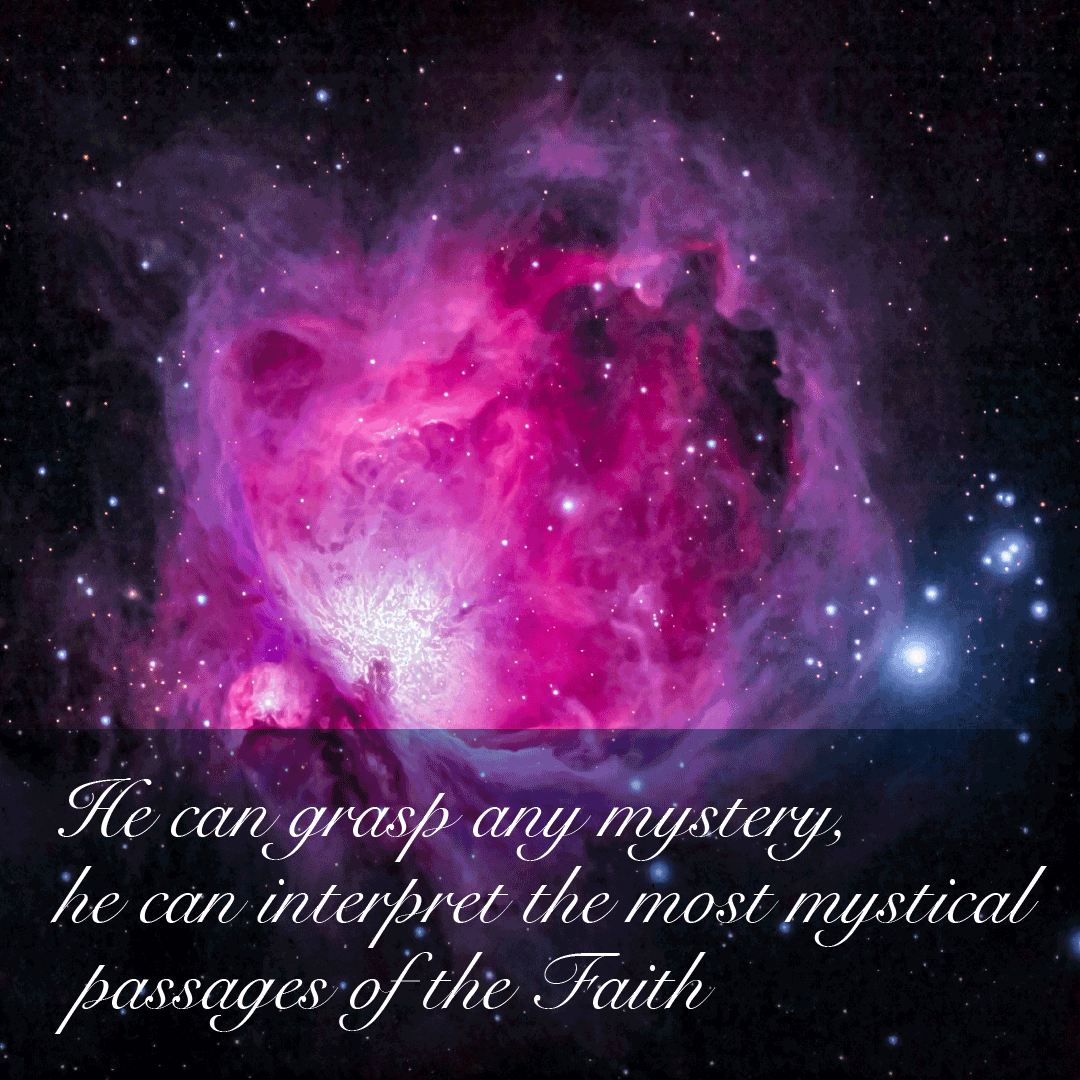
Background photo by Aldebaran S on Unsplash.
Rúḥíyyih Khánum asserts that Shoghi Effendi, because of his station should have always been the guide of everyone who came in contact with him. That Bahá'ís should have scoured the Guardian’s writings to find any possible and eventual trace of their own shortcomings, and corrected and adjusted their lives accordingly.
In another excerpt from her diary, Rúḥíyyih Khánum speaks about the connection between the Guardian and God, this mysterious relationship, unknowable to anyone outside the Guardian himself, which always allowed Shoghi Effendi to understand and interpret the most mystical of Holy Writings, but also expound authoritatively on all mystical matters:
He is the Guardian and the nature of his relation to God is naturally a mystery. He can grasp any mystery, he can interpret the most mystical passages of the Faith, he can write things that are of a profoundly mystical nature - he is "motivated to do so."

Background photo by Nils Stahl on Unsplash.
'Abdu'l-Bahá and Shoghi Effendi were both the Head of the Bahá'í Faith in a land that was first known as Ottoman Palestine, then British Mandate Palestine and finally, Israel.
The Bahá'í Faith is a universal, independent world religion, and its permanent World Spiritual and Administrative Centre is situated in the Holy Land. This made the Bahá'í Faith unique among all religions, and its Head—'Abdu'l-Bahá and Shoghi Effendi—were invested with an exalted station carried with it great prestige, which, unfortunately was lost on people who did not understand what it meant, because of the machinations of the Covenant-breakers, or the small number of Bahá'ís residing in the Holy Land.
Because it would cause the Bahá'í Faith itself—and not them personally—to be disrespected, this caused both 'Abdu'l-Bahá and Shoghi Effendi to not attend official functions where the status of the Faith and their station as its Head would not be respected.
Because of this, from 1868 to 1921, 'Abdu'l-Bahá traveled around the Holy Land and met officials in his home, but never set foot in Jerusalem.
Once, early in his ministry, the Guardian accepted an invitation from the District Commissioner of Haifa for a reception on the occasion of a visit from the High Commissioner.
When Shoghi Effendi entered the room, he found that the High Commissioner had taken the seat of honor, and there was only one free chair next to him, on his right. Because his hosts clearly did not understand the station of the Faith, and which seat its World Head should occupy in this gathering, Shoghi Effendi walked up and sat himself in the vacant seat, which had been originally reserved for the District Commissioner.
Because Shoghi Effendi knew that situations like this would only repeat themselves over and over again, this forced him never again to attend a similar function.
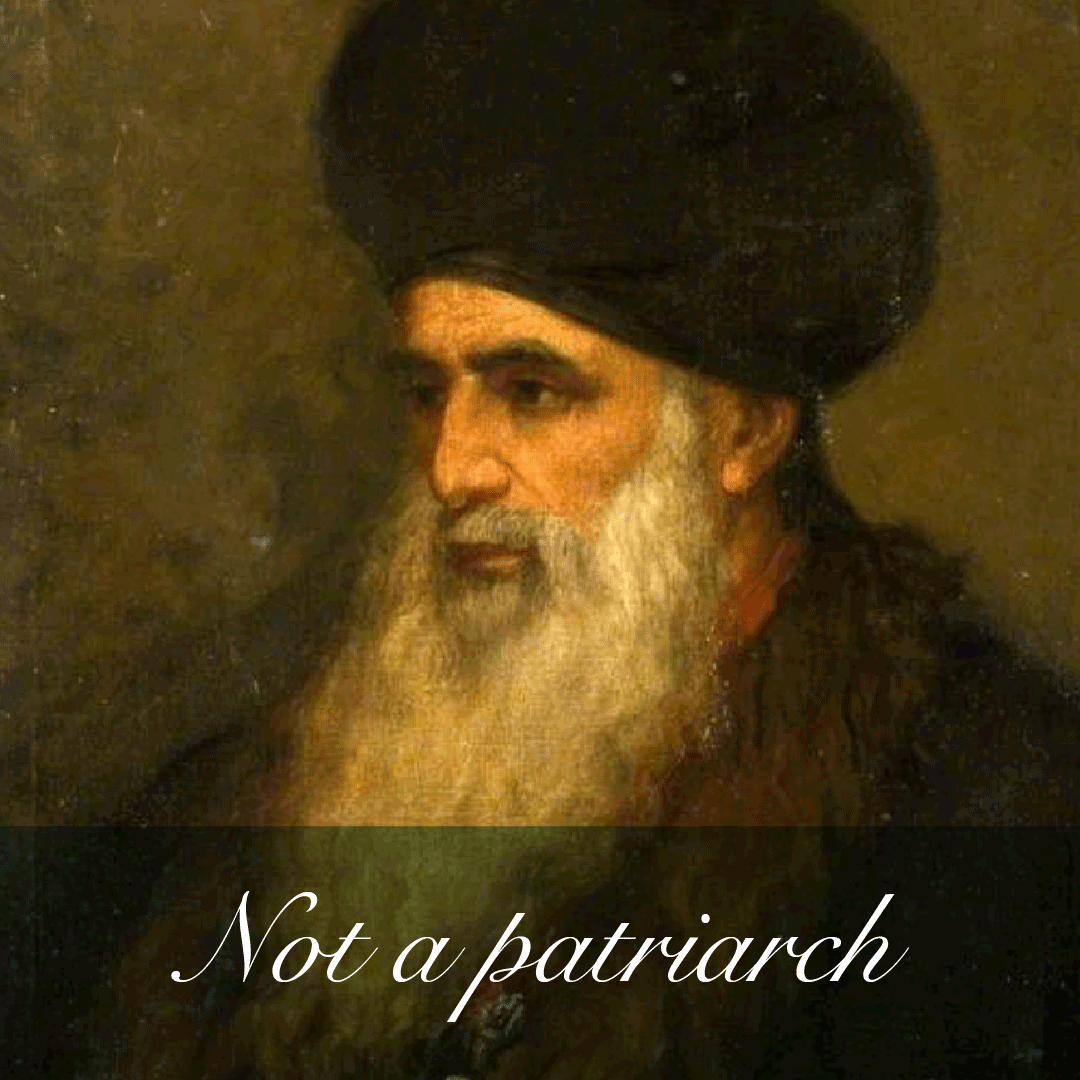
The Late Patriarch of Syria by Margaret Thomas (1842–1929) North Hertfordshire Museum. Source: ART UK.
Shoghi Effendi, as the Guardian, was holding the Covenant of Bahá'u'lláh, exactly as 'Abdu'l-Bahá, as the Center of the Covenant, had.
But he was not 'Abdu'l-Bahá, did not intend to imitate his Grandfather, and he made that very, very clear, from the beginning of his Guardianship.
The local authorities had always known an elderly 'Abdu'l-Bahá, or ‘Abbás Effendi, as they called Him, and they were now faced with, as his successor, His 24-year-old grandson.
The local authorities at first called him “the Boy,” but that would not last long.
Shoghi Effendi held to his vision.
He was beardless unlike his iconic Grandfather, with a trim, black mustache.
Unlike 'Abdu'l-Bahá, he refused to wear long oriental robes and a turban.
He was the first to break the habit of the three Central Figures, of attending Friday noon prayers at the mosque, something 'Abdu'l-Bahá had done until the Friday before He passed away.
Shoghi Effendi would not spend hours visiting the Muslim priests who had been used to spending their time with 'Abdu'l-Bahá.
Members of 'Abdu'l-Bahá’s doubtful and second-guessing family immediately began criticizing Shoghi Effendi for making these decisions, and breaking with a familiar past.
Shoghi Effendi would always reply that he intended to devote every last ounce of his energy to the work of the Faith.
His family and the Bahá'í community suffered from 'Abdu'l-Bahá’s loss and were not handling the change well. Some secretly suspected that Shoghi Effendi was overwhelmed and unclear about what he should do, and they expected the Universal House of Justice to be elected sooner rather than later.
But Shoghi Effendi had already read the situation of the Bahá'í Faith and he knew this was not the time. That is why he called a consultative group to the Holy Land in March 1922.
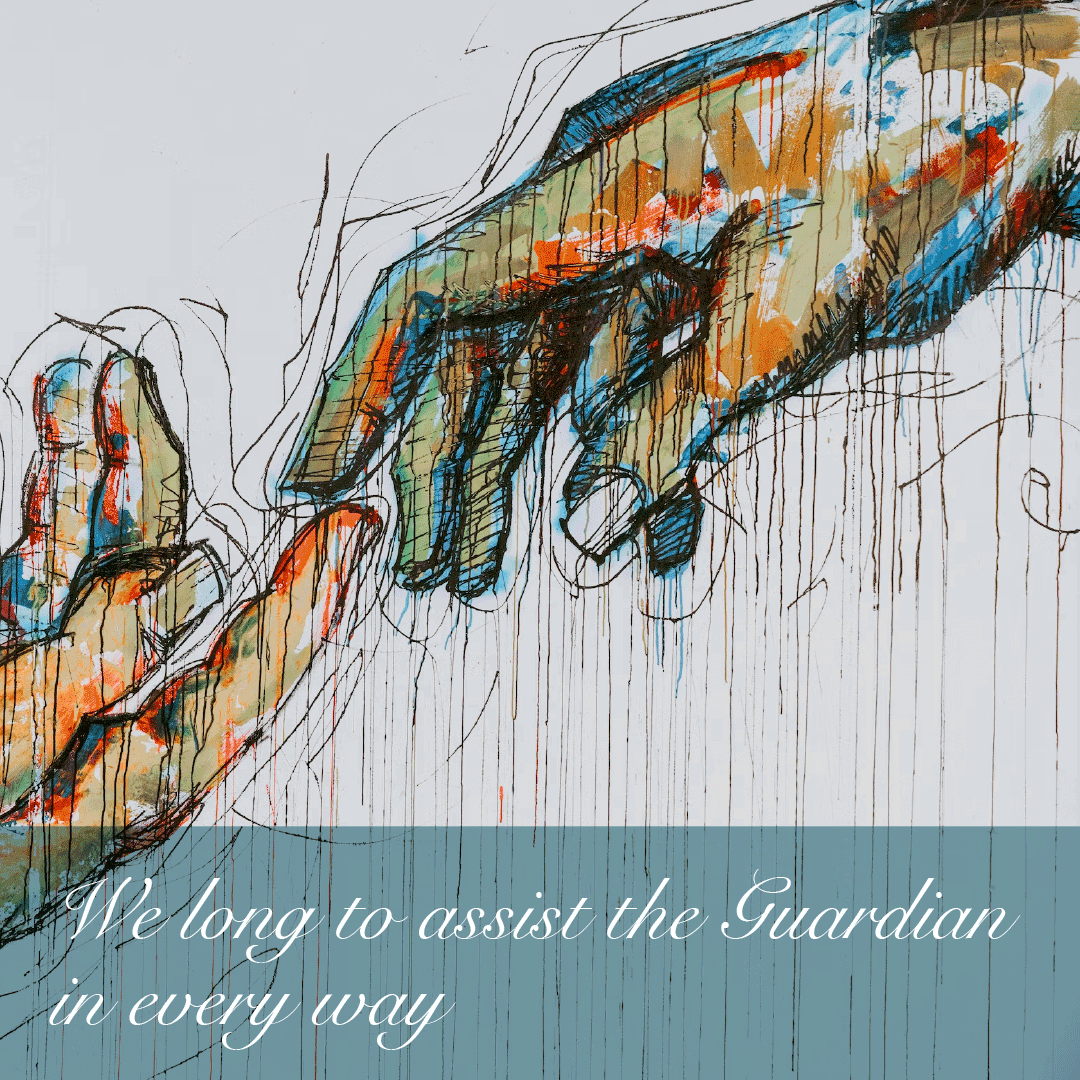
Background photo by Nils Stahl on Unsplash.
Simultaneously to the threat of Covenant-breaking by unfaithful Bahá'ís, enkindled, pure-hearted, and loyal believers poured out their love to the Guardian in the first weeks of his ministry with wonderful words of support, encouragement, and loyalty. Here is a compilation from separate letters and cables:
We long to assist the Guardian in every way and our hearts are responsive to the burdens upon his young shoulders…
Word has reached us here in Washington that our beloved Master has placed the guidance and protection of the Holy Cause in your hands and the He named you as the head of the House of Justice. I write you these few lines responding with all my heart to the sacred instructions of our Beloved Lord and assuring all the support and fidelity of which I am capable…
‘Beloved of our beloved’, how our hearts sang with joy at the news that the Master had not left us comfortless but made you, His beloved, the centre of the unity of His Cause, so that the hearts of all the friends may find peace and certainty.
Our lives have been in utter darkness until the blessed cablegram of the Greatest Holy Leaf arrived with the first ray of light, and that is your appointment by the Merciful Lord as our Guardian and our Head as well as the Guardian of the Cause of God and the Head of the House of Justice.
Whatever the Guardian of the Cause wishes or advises these servants to do, that is likewise our desire and intention.
The friends are greatly attached to Shoghi Effendi, and they desire naught but to follow our Lord's injunctions that we should all support the Guardian of this Holy Cause…
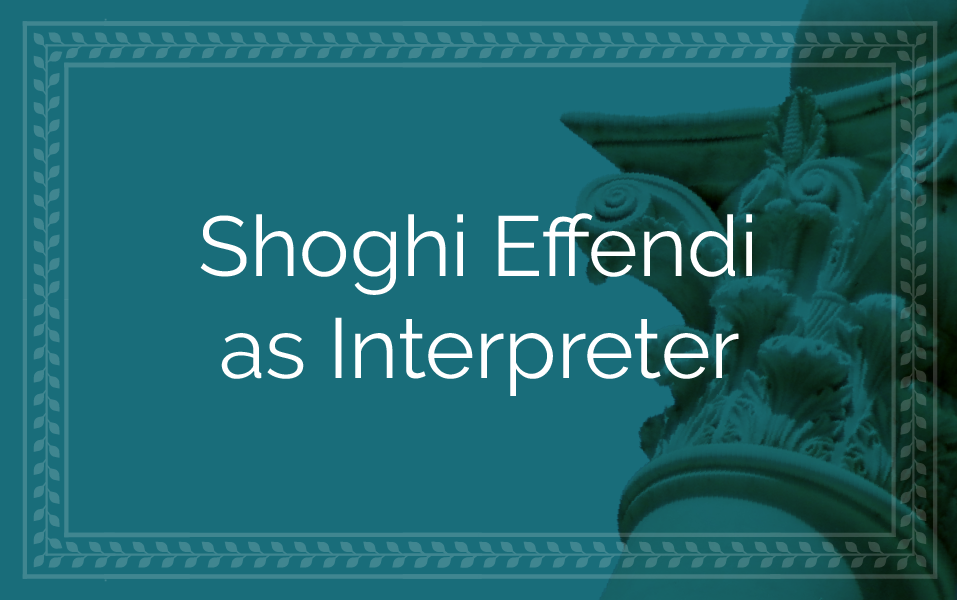

Background photo by Tahlia Doyle on Unsplash.
For 36 years, Shoghi Effendi had interpreted the Writings of Bahá'u'lláh and offered up these gems to the Bahá'í world in brilliant and beautiful language for all Bahá'ís.
Shoghi Effendi’s English translations were not just translations. They were interpretations, and they were not just revivifying for the English speakers of the world, they offered his interpretations to the Persian and Arabic-speaking friends, who could see the writings through new eyes, thanks to him.
This is how Rúḥíyyih Khánum describes Shoghi Effendi’s painstaking work of translation and interpretation:
Patiently, as a master jeweller works at his designs, picking out from his stock of gems some kingly stone, setting it amidst smaller but equally precious ones, so would Shoghi Effendi choose a theme from the Teachings, pluck it out, study it, polish its facets and set it amidst his brilliant commentaries, where it would flash and catch our eye as never before when it had lain buried beneath a heap of other jewels.
It would be no exaggeration to say that we Bahá'ís now live in a room entirely surrounded by these glorious, blazing motifs Shoghi Effendi created.
It is as if he had caught the sunlight of this Revelation in a prism and enabled us to appreciate the number of colours and rays that make up the blinding light of Bahá'u'lláh's words.

Background photo by Mohamed Nohassi on Unsplash.
This act of translating Bahá'u'lláh’s peerless Arabic and Persian into elevated, life-giving, English that never read like a translation was a divinely-bestowed gift that the Guardian cast on every one of the great achievements of his ministry.
He was able to challenge, stimulate, encourage and enkindle the worldwide Bahá'í community by presenting them with concepts, ideas that had been familiar to them, but majestically laid out by the Guardian, these familiar themes were endowed with precious new significance. They became something far beyond what the Bahá'ís could have imagined.
The worldwide community of believers found themselves unable to resist rising up to serve the Faith, they arose to serve, to pioneer, to sacrifice, and in doing so, grew into the Faith that the Guardian was constantly unveiling to them. Over the course of the Guardian’s 36-year ministry, the Bahá'í community itself grew to a constantly renewed and ceaselessly increased understanding of the Faith, of the Administrative Order, and of their role in it, all thanks to the Guardian’s translations of Bahá'u'lláh’s Holy Writings into English.
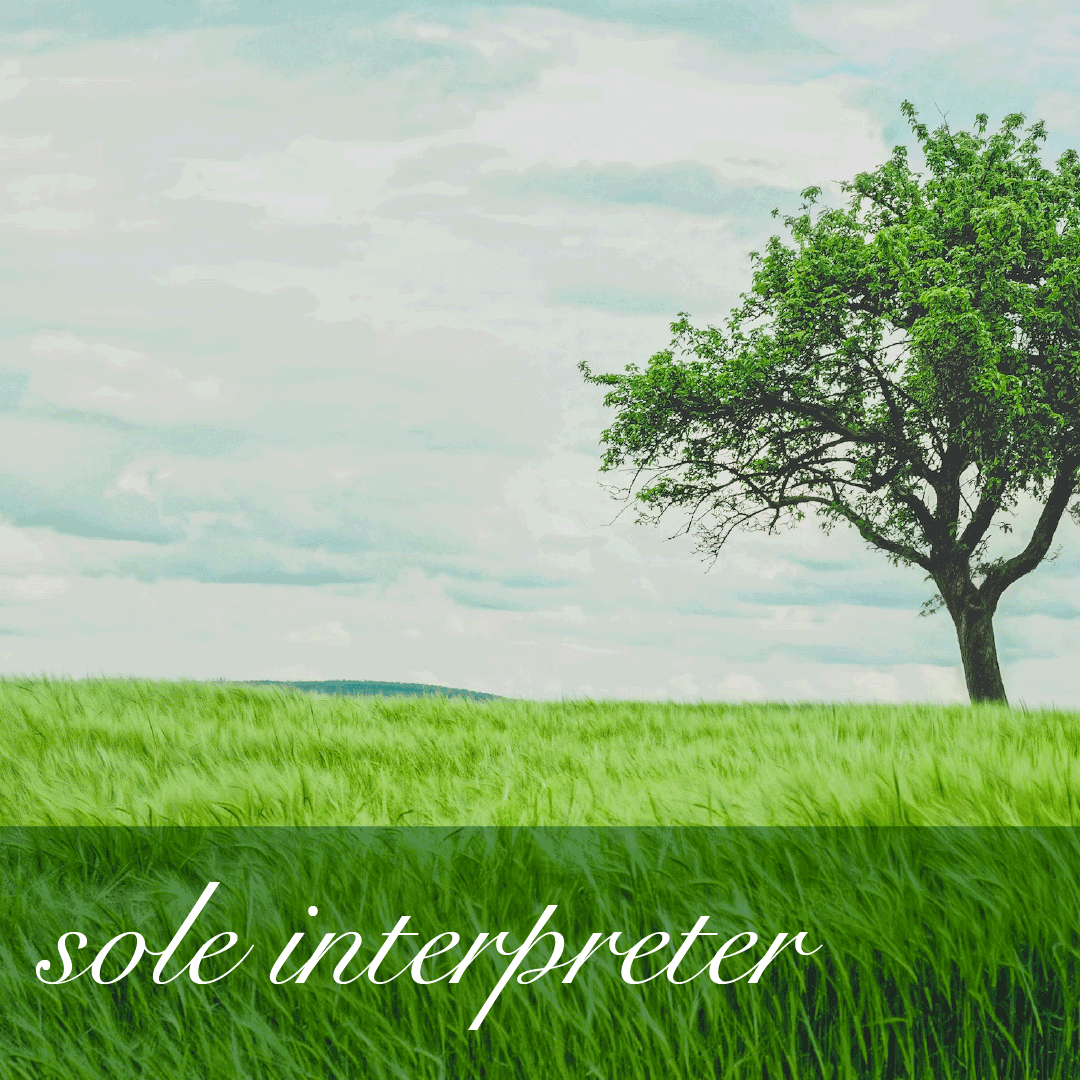
Background photo by Johann Siemens on Unsplash.
The Guardian had a very precious and very thick looseleaf book in which he kept the most important passages he came across in the Writings of Bahá'u'lláh.
This book was his source for quotations for his long letters and God Passes By.
In 1963, after the interregnum of the Ministry of the Custodians, this priceless book of Shoghi Effendi’s was immediately handed over to the Universal House of Justice.
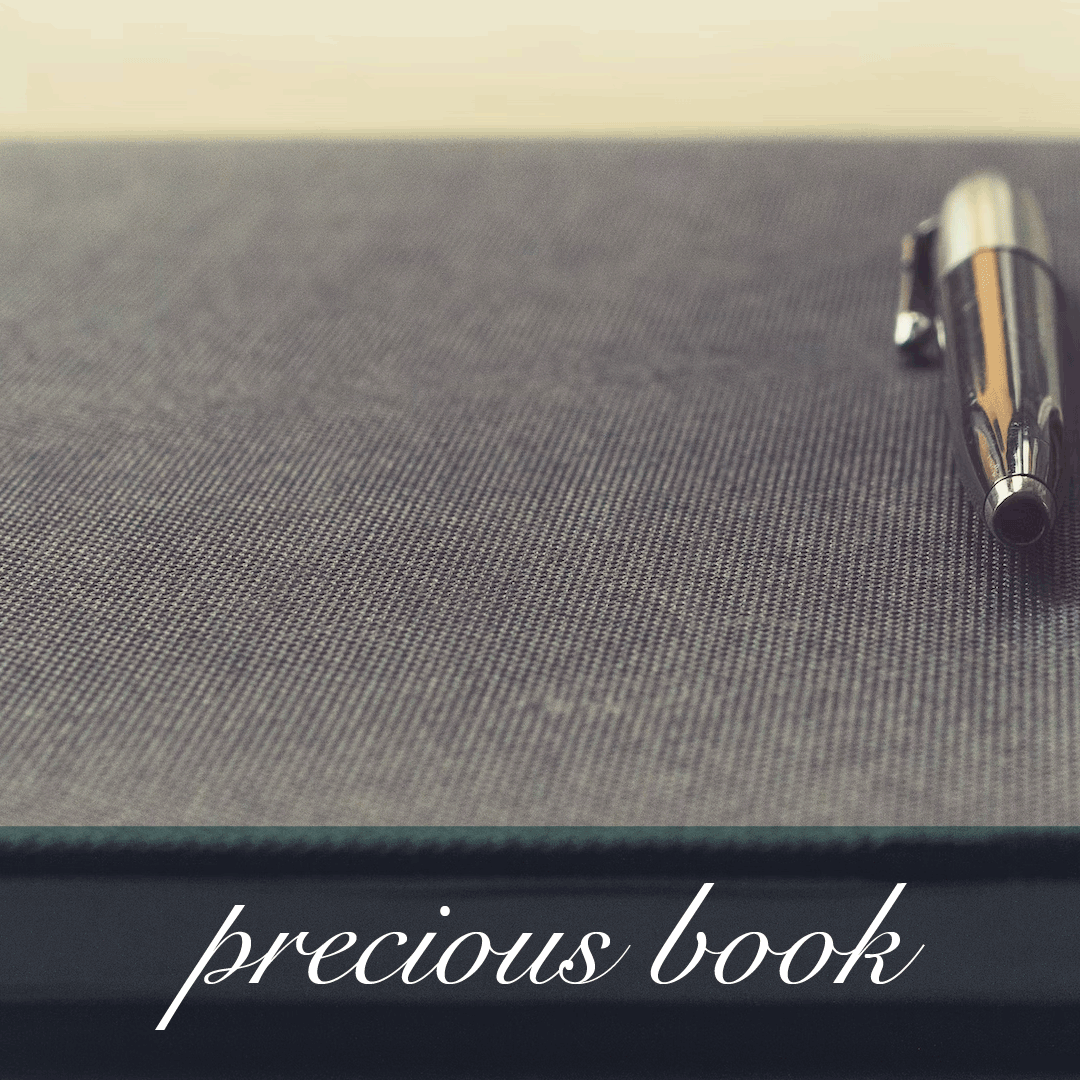
Background photo by Thomas Martinsen on Unsplash.
In Bahá'u'lláh’s Tafsir-i-Va'sh-Shams (Commentary on the Súrih of the Sun), He expounds on the role of Interpreter of the Writings, a role which He bestowed on 'Abdu'l-Bahá, who, in turn, bestowed it on Shoghi Effendi:
Know assuredly that just as thou firmly believest that the Word of God, exalted be His glory, endureth forever, thou must, likewise, believe with undoubting faith that its meaning can never be exhausted. They who are its appointed interpreters, they whose hearts are the repositories of its secrets, are, however, the only ones who can comprehend its manifold wisdom.
For 36 years of his Guardianship, from 1921 to 1957, Shoghi Effendi was the sole interpreter of the Bahá'í Holy Writings. He worked ceaselessly at this divinely-appointed task, producing a wealth of interpretive literature which carried with it implications for the present and the very distant future of human civilization, single-handedly bringing into existence an entirely new literary form.
Shoghi Effendi’s interpretive powers are nowhere more evident than in his diamond-like phrases, carefully and majestically crafted to describe the station of Bahá'u'lláh. To demonstrate the Guardian’s superlative range and power of description, Rúḥíyyih Khánum selected specific phrases Shoghi Effendi used when speaking about Bahá'u'lláh’s station from his books and letters:
The Everlasting Father, the Lord of Hosts, the Most Great Name, and Preserved Treasure, the Most Great Light, the Most Great Ocean, the Supreme Heaven, the Pre-existent Root, the Day Star of the Universe, the Judge, the Law-giver, the Redeemer of all mankind, the organizer of the entire planet, the Unifier of the children of men, the Inaugurator of the long-awaited millennium, the Creator of a new World Order, the Establisher of the Most Great Peace, the fountain of the Most Great Justice, the Proclaimer of the coming of age of the entire human race, the Inspirer and Founder of a world civilization.
In the World Order of Bahá'u'lláh, written in 1929, Shoghi Effendi explains the Guardian’s power of interpretation:
“the Guardian has been specifically endowed with such power as he may need to reveal the purport and disclose the implications of the utterances of Bahá'u'lláh and of Abdu'l- Baha.”
One perfect example of the interpretive power of the Guardian is his luminous explanation of the central purpose of Bahá'u'lláh’s Revelation, also from the World Order of Bahá'u'lláh:
…for Bahá'u'lláh we should readily recognize, has not only imbued mankind with a new and regenerating spirit, he has not merely enunciated certain universal principles, or propounded a particular philosophy, however potent, sound and universal these may be. In addition to these, he as well as Abdu'l-Bahá after Him has unlike the dispensations of the past, clearly and specifically laid down a set of laws, established definite institutions, and provided for the essentials of a divine economy. These are destined to be a pattern for future society, a supreme instrument for the establishment of the Most Great Peace, and the one agency for the unification of the world, and the proclamation of the reign of righteousness and justice upon the earth.
As the Guardian of the Bahá'í Faith, Shoghi Effendi’s role as Interpreter was closely linked to his other divinely-appointed duties, such as protecting and preserving the integrity of the Faith and its teachings, directing and guiding the propagation of the Cause by prosecuting teaching plans, forging and nurturing a worldwide Bahá'í community, and developing the Administrative Order by establishing and consolidating its institutions.
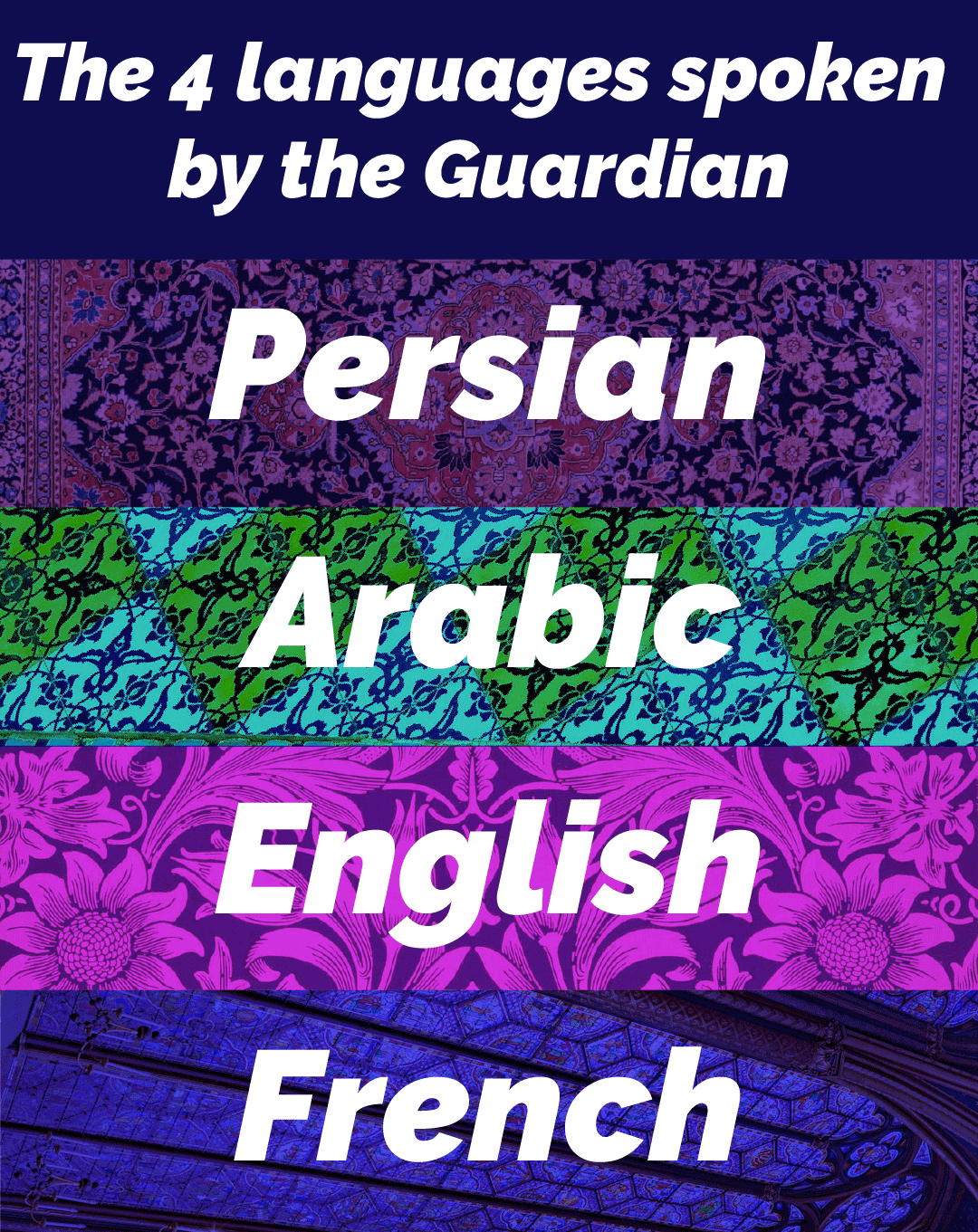
The Guardian had totally mastered the Arabic, Persian, and English languages. But he was fluent in French as well.
When things were ambiguous in the Arabic or Persian Writings of Bahá'u'lláh—and in the Writings of Bahá'u'lláh revealed in a mixture of Persian and Arabic—the Guardian’s translation into English was clear and unambiguous, because he was the authorized Interpreter.
In turn, native Persian and Arabic-speaking Bahá'ís could read the Guardian’s English translations and for the first time understood which of the meanings of a certain word Bahá'u'lláh had intended in the original text. The Guardian’s Interpretation of Bahá'u'lláh’s Holy Writings in English clarified Holy Scripture for everyone not just English-speakers.
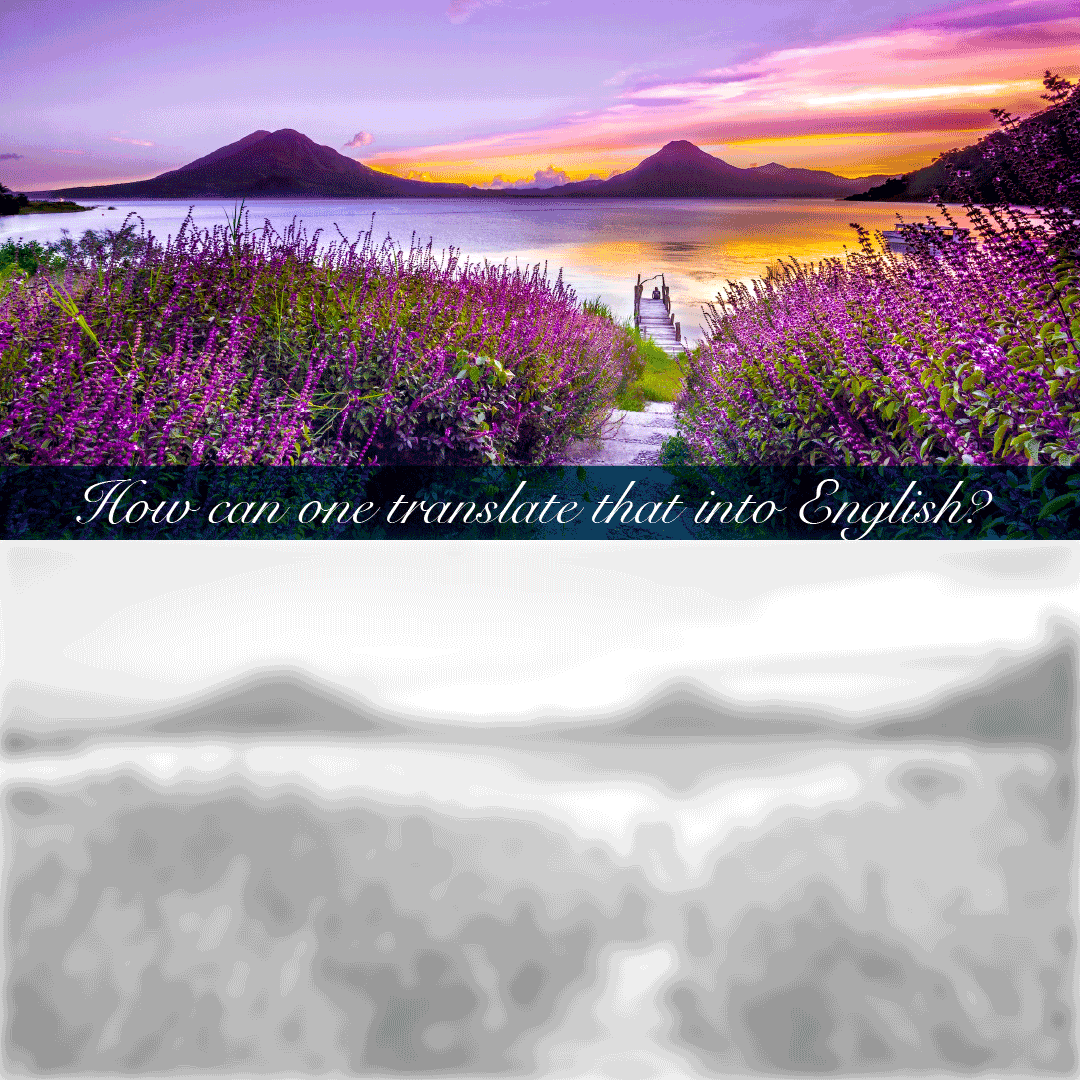
Background photo by Mark Harpur on Unsplash.
One of Shoghi Effendi’s biggest challenges as sole and authoritative interpreter of the Sacred Writings, appointed as such by 'Abdu'l-Bahá in His Will were the untranslatable aspects of the Persian and Arabic language into English.
Persian sentence construction is notoriously loose compared to English, and the inherent ambiguity could give rise to confusion in the mind of the reader. Careful and correct English, on the other hand, was not as ambiguous, and when such a naturally clear language was coupled with the Guardian’s brilliant mind and his power as Interpreter, his translations somehow crystallized Bahá'u'lláh’s teachings.
Shoghi Effendi’s interpretive translations into English were so sumptuous, so powerfully clear, so strong, that Persian and Arabic readers could use them, side by side with the originals and understand them better. With Shoghi Effendi’s translations, the Writings of the Báb, Bahá'u'lláh, and 'Abdu'l-Bahá are clear forever, and because they are clear, they are safe from misinterpretation, for all time.
The Guardian was very meticulous in his translation. He always made absolutely sure that the words he was using in English not only conveyed the meaning of the original Persian and Arabic word, but also that they never departed from the original thought.
Sometimes an Arabic word could be translated in three ways, as "power", "strength" and "might." Shoghi Effendi used this to his literary advantage, and would sometimes choose the nuance that fit best and avoid repetition in English, when the repetition in Arabic caused no issue.
One example of this is the Guardian’s translation of the Tablet of Visitation for 'Abdu'l-Bahá. In the original Arabic, the Arabic word for “selflessness”— الفناء“Fanaa”—is repeated three times. Because the word is short, and almost sounds like an exhaled breath, the repetition in Arabic produces a melodious rhyming rhythm. However, the perfect translation for this word in English is “selflessness,” a beautiful, but heavy three-syllable word. The Guardian could not have translated it three times, so he replaced it with the possessive determiner “its” and the rendering in English is exquisite. The under lined words in English replace the full Arabic word for “selflessness”:
Give me to drink from the chalice of selflessness; with its robe clothe me, and in its ocean immerse me.
Shoghi Effendi used to say that one difference between Arabic and English was that in Arabic, synonyms usually meant the same thing, whereas in English, each synonym had a shade of difference, which allowed him to be even more precise in rendering the translation.
According to the Guardian, some of Bahá'u'lláh’s most mystical and poetical writings would likely never be successfully translated into English because they would become so flowery that the original beauty and meaning would be lost and the resulting translation would be misleading
Rúḥíyyih Khánum only once had the great privilege of working side by side with Shoghi Effendi to translate a paragraph from one of Bahá'u'lláh’s Tablets in Persian, once her Persian had arrived a high enough level. The Guardian asked her:
How can one translate that into English?
Rúḥíyyih Khánum and Shoghi Effendi worked on the paragraph for two hours, and when Rúḥíyyih Khánum suggested a sentence that broadly conveyed the original meaning, Shoghi Effendi said:
Ah, but that is not translation! You cannot change and leave out words in the original and just put what you think it means in English.
Shoghi Effendi pointed to Rúḥíyyih Khánum that, because a translator’s duty was to be totally faithful to the original, translations sometimes came out ugly or worse, meaningless. With the Writings of Bahá'u'lláh, this could not happen, and, in the end, Shoghi Effendi said that paragraph simply could not be translated.
Rúḥíyyih Khánum only ever knew of Shoghi Effendi slightly modifying the original term in English in one, single instance, at the very beginning of his Guardianship, when he was translating the Will and Testament of 'Abdu'l-Bahá.
It was a sentence about him.
Shoghi Effendi’s English translation of the sentence reads:
By [the Universal House of Justice] all the difficult problems are to be resolved and the Guardian of the Cause of God is its sacred head and the distinguished member for life of that body.
The original word, which Shoghi Effendi translated as “member for life” was “irremovable.”
In Rúḥíyyih Khánum’s words:
Nothing could be more revealing of his profound humility than this toning down of his own relationship to the Universal House of Justice.
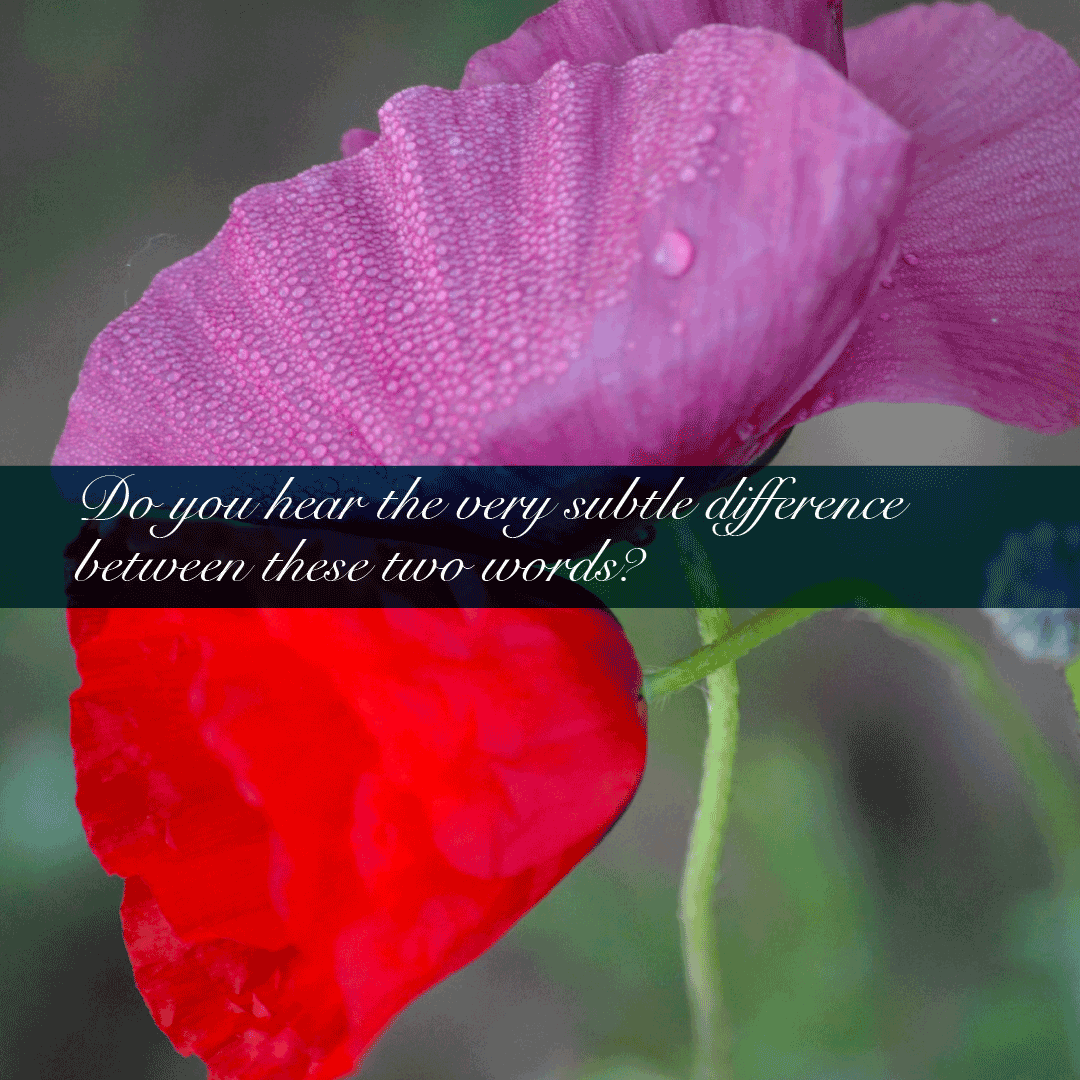
Background photo by Christophe Maertens on Unsplash.
One of the reasons the Guardian’s writings are so rich and vibrant is Shoghi Effendi’s love for synonyms.
When he was writing, he would often find synonyms for a word he wanted to use in either its Germanic or Latin root, then turn to Rúḥíyyih Khánum and say:
Do you see? Do you hear the very subtle difference between these two words? Now this is the word that is proper in this connection.
Rúḥíyyih Khánum stated that all the Guardian’s writings were perfect:
You can't in the writings of the Guardian remove a dot from an "i" without losing some meaning. He is so precise, so exquisite in his use of the English language.
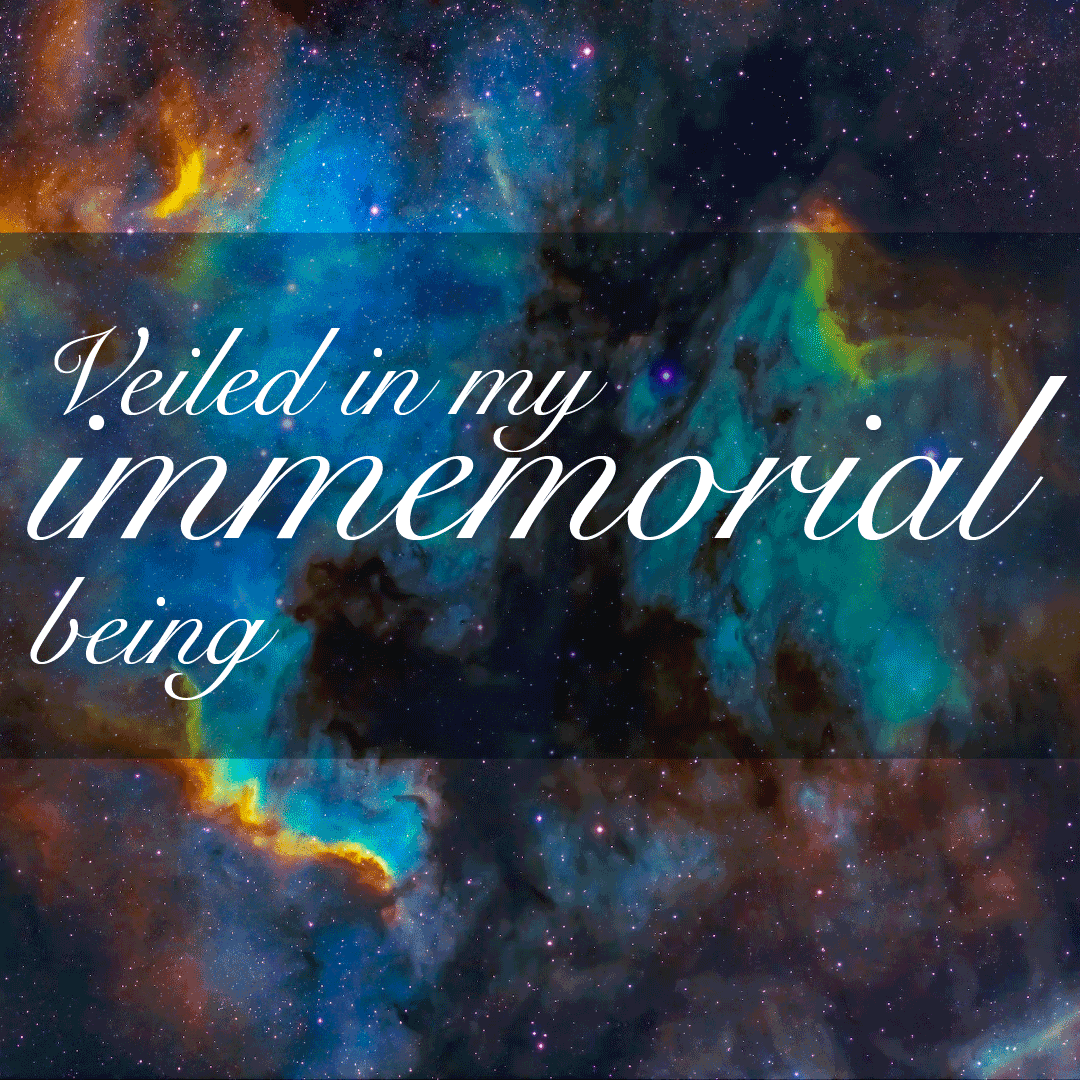
Background photo by Aldebaran S on Unsplash.
The Bahá'í Writings had been translated by eminent, brilliant, capable, eloquent Bahá'ís for decades when Shoghi Effendi became the Guardian.
However, unlike all the previous translations of the Bahá'í Holy Writings, when Shoghi Effendi was appointed Guardian, 'Abdu'l-Bahá also bestowed on him the station of Interpreter and Expounder of the Holy Writings.
The most important implication of this fact is that when Shoghi Effendi was not simply translating from Arabic and Persian into English, he was unveiling before our eyes the full and pure original intent of Bahá'u'lláh, the Báb, and 'Abdu'l-Bahá.
It is for this reason that Shoghi Effendi, throughout his entire ministry, invariably advised non-English speaking National Spiritual Assemblies to translate the Bahá'í Holy Writings from his English translations into their national language, and never to attempt to translate from the Persian and Arabic.
The reason for this is obvious: in his English translation, the Guardian had already interpreted the intent of Bahá'u'lláh, the Báb, and 'Abdu'l-Bahá. Any translator returning to the Persian and Arabic was deprived of the Guardian’s infallible, unerring interpretation of the original words.
In his peerless series of talks at Acuto, Italy in 2006, ‘Alí Nakhjávání highlights several striking examples of the Guardian’s interpretive genius.
In Persian and Arabic, short vowels are not included and words are basically written without them: they are written exclusively with consonants. A word with two consonants, “q” and “b” could therefore either be the words “uqáb”—meaning “eagle” or “iqáb”—meaning “retribution.” Before Shoghi Effendi interpreted the word in the Hidden Word from the Persian number 63, translators thought Bahá'u'lláh meant that a “dangerous eagle” was pursuing humanity. Shoghi Effendi set the record straight with his translation:
O YE PEOPLES OF THE WORLD! Know, verily, that an unforeseen calamity is following you, and that grievous retribution awaiteth you.
In the Kitáb-i-Aqdas a word-for-word translation of this well-known passage in Arabic literally reads:
Order has been upset by reason of this most great order, and arrangement of things has been changed because of this new way – a way that the people of the world have not yet seen.
Shoghi Effendi interpreted “order” as follows:
The world’s equilibrium hath been upset through the vibrating influence of this most great, this new World Order. Mankind’s ordered life hath be revolutionized through the agency of this unique, this wondrous System – the like of which mortal eyes have never witnessed.
One capital point made by ‘Alí Nakhjávání is that we should consider all instances of capitalization in Shoghi Effendi’s translations—such as those relating to God and His Manifestations—as carrying what he terms “the essential element of interpretation” because the Arabic and Persian languages do not have a system of capitalization.
In this instance, and because the English language is very partial to capitalization, Shoghi Effendi’s remarkable translations lie firmly in the tradition of the elevated English of the King James Bible he so loved.
Perhaps the exquisite translations of the Guardian and his unerring interpretation of Bahá'u'lláh’s original intent upon Revelation is only abundantly clear with the aid of the two examples below.
The Local Spiritual Assembly of Cairo translated the Hidden Words in 1921. Here is their rendition of the third Hidden Word from the Persian, accurate but mechanical and lacking in majesty:
O Son of Man! In my ancient and eternal Being, knew I my love in thee, therefore did I create thee, and laid on thee My Image, and revealed to thee My Beauty.
Compare this with Shoghi Effendi’s superior, elegant, flawless English:
O SON OF MAN! Veiled in My immemorial being and in the ancient eternity of My essence, I knew My love for thee; therefore I created thee, have engraved on thee Mine image and revealed to thee My beauty.
The British orientalist E.G. Browne—before he became ill-disposed to the Faith—translated the Lawḥ-i-Sulṭán, Bahá'u'lláh’s Tablet to Naṣiri'd-Dín Sháh. This is the work of a well-known scholar, well-versed in both Arabic and Persian, and yet notice the clumsiness of the English:
O King, verily I was as (any) one amongst mankind, slumbering upon my couch. The gales of the All-Glorious passed by me, and taught me the knowledge of what has been…This is a leaf which the breezes of the Will of thy Lord, the Mighty, the Extolled, have stirred. Can it be still when the rushing winds blow? No, by the Lord of the Names and Attributes! Rather do they move it as they list (for) Being belongeth not to Non-entity in presence of the Eternal…O King, look with the gaze of justice upon thy servant; then decide according to the right concerning what hath befallen him.
Shoghi Effendi’s translation, by contrast, is luminous:
O King! I was but a man like others, asleep upon My couch, when lo, the breezes of the All-Glorious were wafted over Me, and taught Me the knowledge of all that hath been…This is but a leaf which the winds of the will of thy Lord, the Almighty, the All-Praised, have stirred. Can it be still when the tempestuous winds are blowing? Nay, by Him Who is the Lord of all Names and Attributes! They move it as they list. The evanescent is as nothing before Him Who is the Ever-Abiding…Look upon this Youth, O King, with the eyes of justice; judge thou, then, with truth concerning what hath befallen Him.
Shoghi Effendi’s interpretation-translations have set the bar so high that we will be reaping the blessings of his pen for thousands of generations to come.
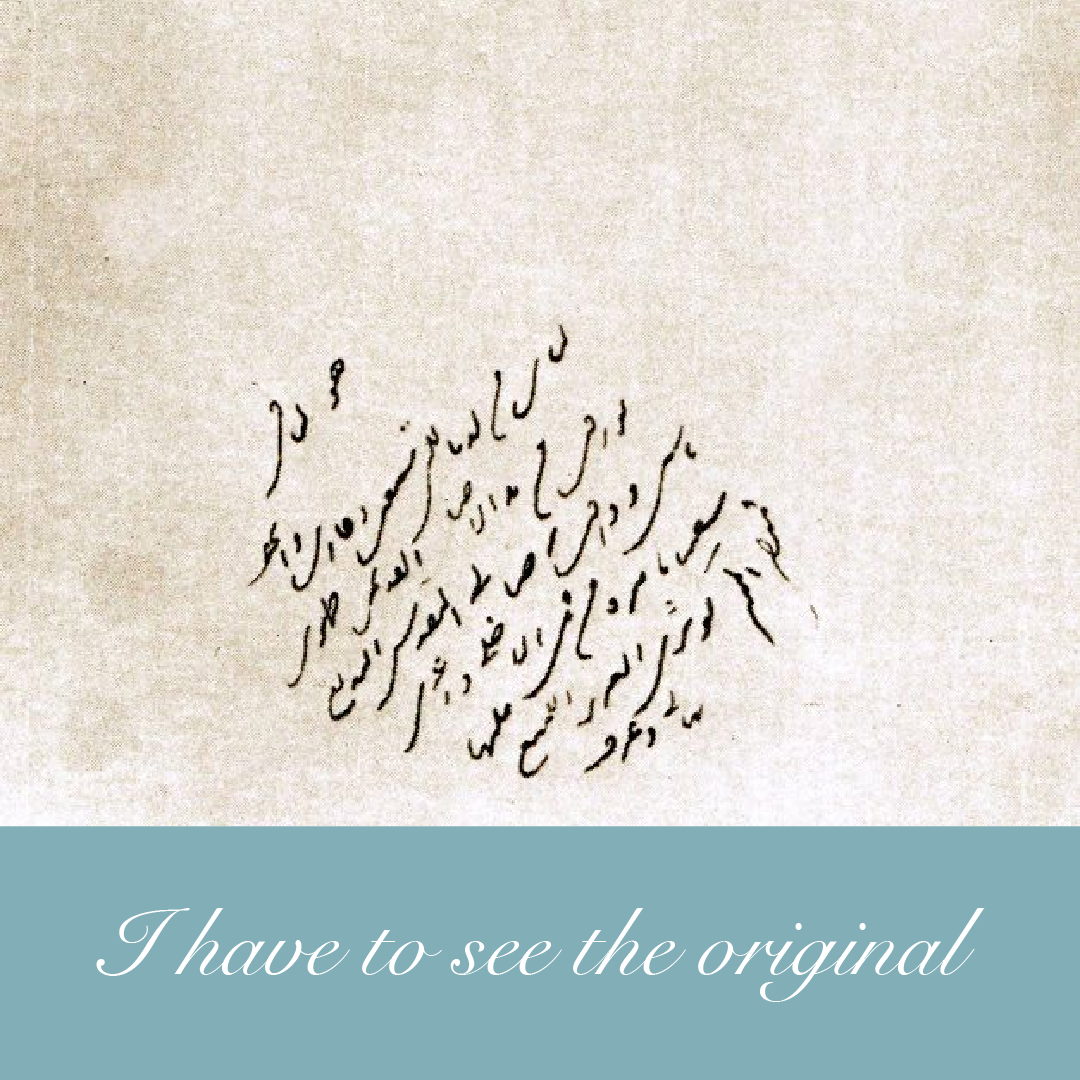
Bahá'u'lláh’s Tablet to the Greatest Holy Leaf. Source: Bahá'í Sacred Relics.
Nowhere was Shoghi Effendi more meticulous than in relation to the Holy Writings of the Bahá'í Faith.
When people came up to the Guardian with a question about the Writings, he would always ask:
Where did you get that from?
If he hadn’t translated the Writing a Bahá'í was asking about, Shoghi Effendi could not vouch for its authenticity and would make no comment, but rather, he would say:
I have to see the original.
The Guardian had such a tremendous respect for the original Holy Writings that it must have seemed baffling to Bahá'ís. The Guardian simply would not answer, he would refuse to commit himself until he read the verse or excerpt in Persian or Arabic for himself.
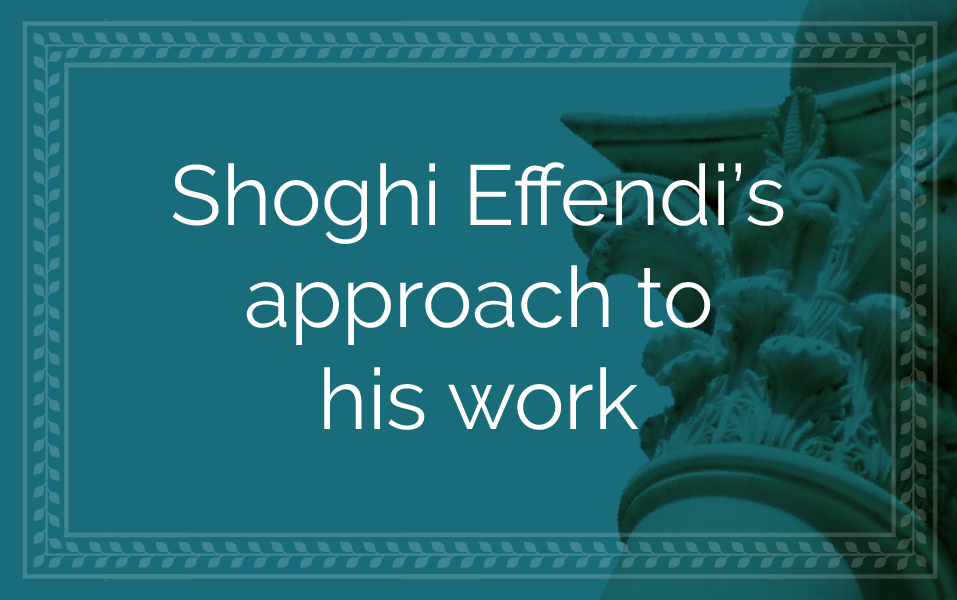

Photo by Federico Beccari on Unsplash
Many Bahá'ís mistakenly thought that Shoghi Effendi was a quiet person and they saw him as an immobile, unmoving, peaceful, silently spiritual. Nothing could have been further from the truth.
Hand of the Cause and Secretary-General of the International Bahá'í Council, Leroy Ioas was the Guardian’s right hand man for five years from 1952 to 1957, and he was the person closest to Shoghi Effendi aside from Rúḥíyyih Khánum. The Guardian loved Leroy Ioas so much he called him “my Hercules” for his unstoppable drive, for his ability to get anything the Guardian wanted done, and for his formidable capacity for sustained, strenuous work. Leroy Ioas described. Shoghi Effendi to be in constant motion, the heart of a centrifugal force that swept up all those associated with him. The Guardian was a man of action, first and foremost, it was one of his most distinguishing characteristics. He would tell Bahá'ís:
The secret of meditation and prayer is action; it is only through action that God can answer your prayer.
The Guardian’s power was not immobile or quiet, it constantly, continually radiated from him and was a driving spiritual energy which perpetually projected him forward, with his translations, his interpretations, his raising up of the Administrative Order, his building of the International Endowments of the Faith, his conception of world-embracing Teaching Plans.
Leroy Ioas said that to be so close to that amount of raw power, and to live near that irrepressible force was not an easy thing. No one could achieve even a drop of what the Guardian exuded in his sheer force of spirit, and Leroy Ioas often said that when the Guardian spoke, it was evident that it was not a mere man who was speaking. At times, when the Guardian spoke, the room he was in seemed to vibrate with spiritual force, and the spirit was speaking through him.
Through what Rúḥíyyih Khánum called his genius a “capacity for a tremendous amount of persevering work” the Guardian had achieved what Leroy Ioas considered the station of evanescence that he possessed.

Photo by Hal Gatewood on Unsplash
One day, while speaking about a matter which was troubling him, the Guardian said to May Maxwell, his beautiful face full of laughter:
You see I wish to know the motive behind these actions! I do not like to be put off and put off and have the matter delayed and when they are dealing with an impatient person like myself it becomes very difficult.
He was laughing at his own legendary impatience, his thirst for immediate action, he was profoundly restless for the growth, spread, and victory of the Cause, he had a deep, insatiable yearning for real unity in all the local Bahá'í communities of the world.
The highest praise for individual Bahá'ís that crossed the Guardian’s lips was always:
He is active.
She is an active Bahá'í.
The Guardian’s energy was inexhaustible. It was a deep well that was continually fed by divine assistance. How else could he sleep at 2 AM and get up at 6 AM to begin another day’s monumental, crushing workload?
The Guardian’s strength never flagged. Not under the constant stress of the work, not under the magnitude of the complex problems that were poured on him every day he arose, not under the mountains of mail that ‘Alí Aṣghar delivered to him daily.
He was joyful in his work for the Faith, restless, energetic, motivated, indefatigable, enthusiastic, absorbed, passionate.
The Guardian was so productive that even the word productive does not do him justice. He accomplished the work of ten people every day, alone, and often unaided. For two decades, until Rúḥíyyih Khánum became his assistant, he searched high and low for competent aides, in vain.
The Guardian wanted the Bahá'ís to have the same impatience in their work, the same zest and zeal, the same efficiency, the same dedication, the same sense of overwhelming urgency, and it frustrated him deeply that not more people saw their service to the Faith as vital to their very life as he did. And this was one of the Guardian’s greatest sufferings: the inefficiency of the Bahá'ís.
Bahá'ís would send the Guardian lengthy letters, filled expressions of devotion, love, servitude, respect, but they would never get to the point, and the Guardian was often forced to hand these letters to his Secretary, Leroy Ioas, and ask him what their exact question was so he could answer. In frustration, once, the Guardian told Leroy Ioas that the believers could be "oceans of love but mountains of inefficiency".

Vintage early 20th century desk image from Antiques Boutique. Background photo by Yousef Espanioly on Unsplash
Shoghi Effendi’s bed and desk were side by side so that he could go from his bed straight to his desk, work until he was utterly exhausted, then get up and walk to his bed—where he would continue working. In 20 years, Rúḥíyyih Khánum never managed to convince Shoghi Effendi to separate his bedroom from his office. It was the way he worked, and it worked for him until the day he died. He once told Rúḥíyyih Khánum:
I can't help it. It's all in one place and I can get into bed and get out of bed and do my work.

Photo by Nicolai Krämer on Unsplash
Amatu’l-Bahá Rúḥíyyih Khánum makes a very important point in separating Shoghi Effendi’s exclusive spiritual heritage as the descendent of both the Báb and Bahá'u'lláh, from his person.
Because Shoghi Effendi was the great-grandson of Bahá'u'lláh and the grandson of 'Abdu'l-Bahá, he received a unique heritage of spiritual power, divine guidance, and as the Guardian, he was protected by his divinely-bestowed infallibility.
Beyond these extraordinary facets of his being, the Guardian was also a person, and Rúḥíyyih Khánum repeatedly spoke on the fact that, as a person, the Guardian was, in her words, “a genius in his own right.”
Rúḥíyyih Khánum’s definition of genius is one for the ages, because it is so subtle and generous, while at the same time being out of reach for almost everyone on earth: she defines it as an almost-infinite capacity for work and concentration. For working harder than everyone has ever worked, for concentrating on something with so much intensity that it begins to happen, for single-handedly accomplishing the work of ten people. This is how she explains it, at a talk she gave on 21 June 1970:
I think one of the definitions of genius is a person who has the capacity for a tremendous amount of persevering work. You know in science, in art, in music, in literature, if you study those people that get to the very top and are outstanding so often it has been done by a very, very simple process of just hard work.
The kind of work Rúḥíyyih Khánum describes is how Michelangelo painted the timeless frescoes inside the Sistine Chapel. The Guardian accomplished more. That was the kind of worker the Guardian was. Rúḥíyyih Khánum described his powers of concentration:
I have never in my life seen anybody with a power of work and concentration that the Guardian had. And it was really an example to all of us. He just kept at it until he did it. He drove through until he had succeeded. Whatever it was, didn't matter what the nature of the thing was. Whether it was having a wall built, or having the side of the mountain demolished and carted away, or something that he was writing or something he was going to write and he was doing a tremendous amount of reading and making notes, he did it all the slow, thorough way. And that's why you have so much that he is accomplished and it's of such high caliber in every single field.
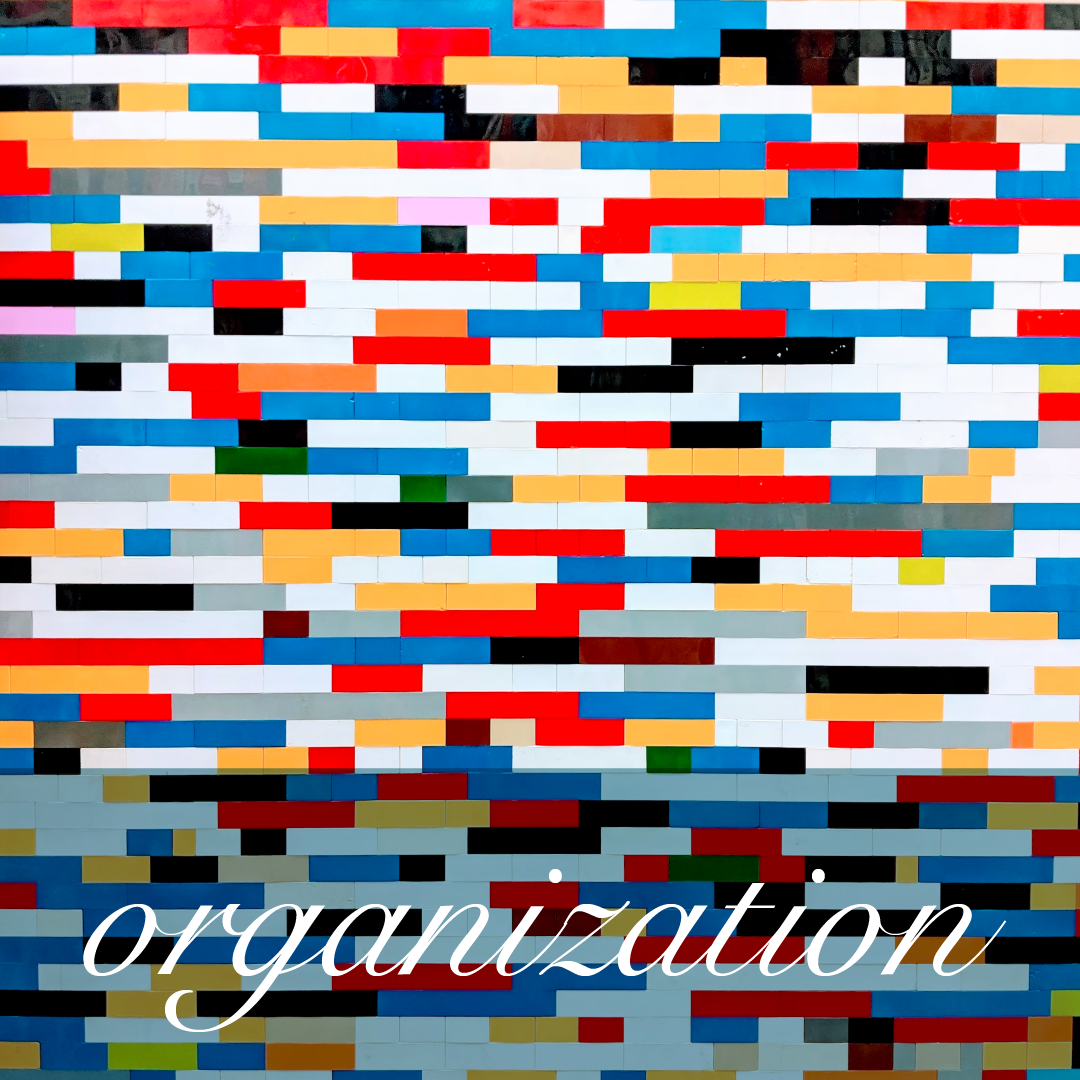
Photo by Omar Flores on Unsplash
‘Abdu’l-Bahá and Shoghi Effendi were practical in the extreme. Shoghi Effendi was a brilliant, dynamic administrator and executor who planned very carefully and kept track of everything, the details and the big picture. He was careful, exact, and methodical. He picked objectives, was thorough in carrying out his plans, big or small, and followed through to reach his goal. As Rúḥíyyih Khánum said:
But this was typical of this executive capacity of Shoghi Effendi. His attention as I said to detail, his thoroughness, his carrying out plans, his foreseeing what would happen, making a plan, making an objective, following through to reach that objective.

The relation between the Earth, Sun, and stars at the March equinox. From Earth's perspective, the Sun appears to move along the ecliptic (red), which is tilted compared to the celestial equator (white). Source: Wikimedia Commons.
Shoghi Effendi did not rely on anyone’s judgement but his own, and he was exceedingly exact in all things, even small details that would only end up being one line in a larger book he was writing. Here are some examples of how precise his brain was.
Some Holy Days in the Bahá'í calendar are celebrated according to the lunar calendar, and because this calendar depends on variables like the hour of the rising of the new moon, Shoghi Effendi always hunted down from unimpeachable sources the exact date for Naw-Rúz for example, which either falls on 20 or 21 March.
In 1923, Shoghi Effendi cabled his cousin in Beirut:
Ascertain and wire exact time vernal equinox.
Sometimes, Shoghi Effendi needed data that he could not obtain locally, and he trusted the library of the American University of Beirut, where his brother was studying. So, in 1932, Shoghi Effendi cabled him:
Ascertain approximate population Roman Empire during two first centuries after Christ...
Shoghi Effendi knew more so than most great writers, how important details were in bringing a story to life. In March 1932, Shoghi Effendi wrote a magnificent letter, The Golden Age of the Cause of Bahá'u'lláh, and though we have no way of knowing if the facts about the Roman Empire quoted in this letter were part of the researched he had requested from his brother, they bring the point that Shoghi Effendi is driving home to life:
Is it not a fact that no more than a twentieth part of the subjects of the Roman Empire had enlisted themselves under the standard of Christ before the conversion of Constantine?
One last example of Shoghi Effendi’s love for details and his deep understanding of their importance in storytelling to the collective Bahá'í psyche, combine with his love of cartography. Shoghi Effendi easily could have said that during the World Crusade, Bahá'í books had traveled as far as Antarctica in 1951, but he didn’t.
Instead, Shoghi Effendi added the latitude and the name of the sea in one of his messages to the Bahá'í World, and all of a sudden, a fact became an adventure story, taking the reader to the literal ends of the earth:
Of this widely disseminated literature seven books have been lately presented by an adherent of the Faith residing in Christchurch, New Zealand, to the officer in charge of the American Antarctic Expedition for its library, while others have been dispatched, beyond the Antarctic Circle, as far south as the Expedition's base, at McMurdo Sound, 77 degrees latitude, on the shores of the Ross Sea.
When the Guardian wrote, everything became thrilling!
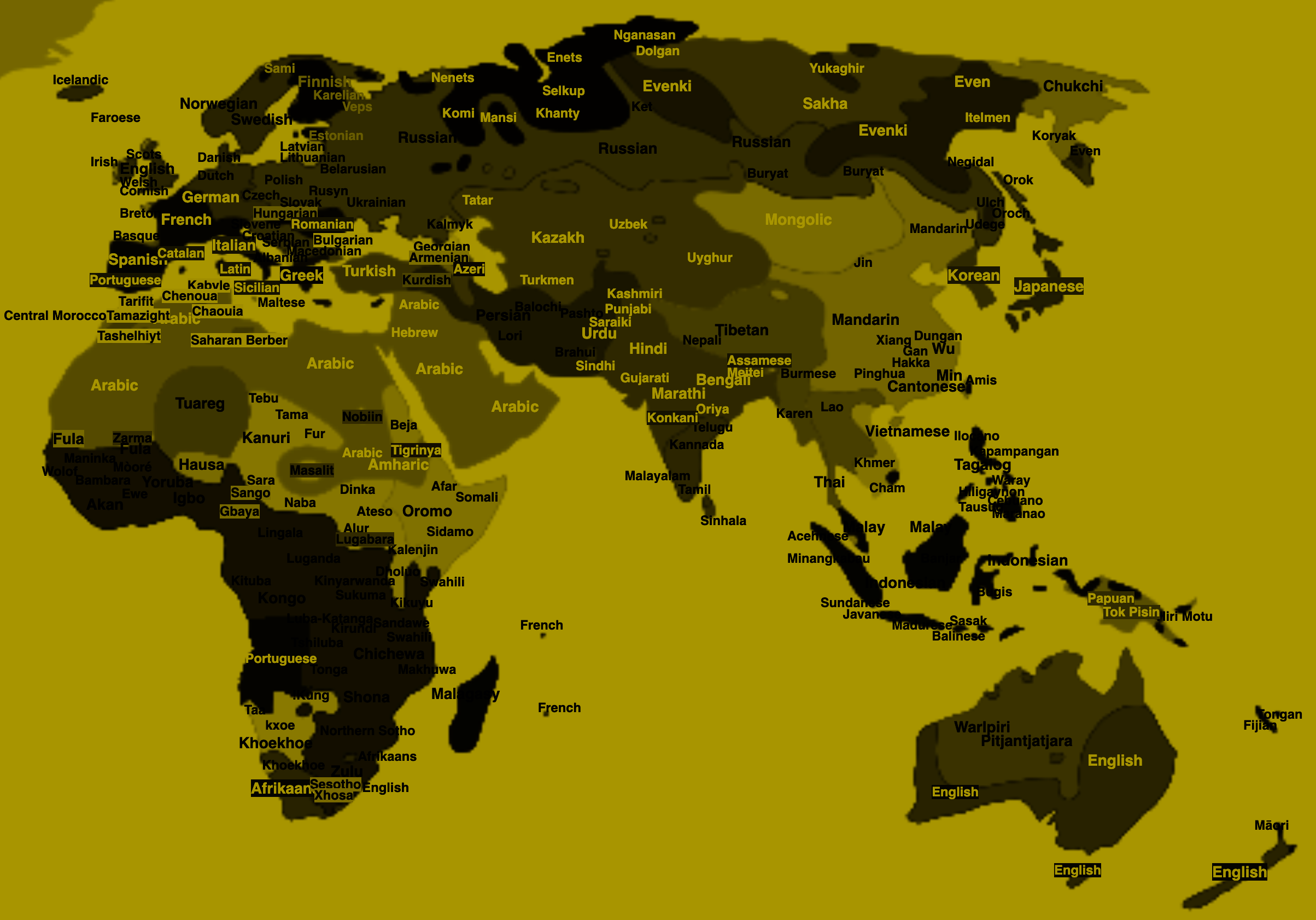
Distribution of languages in the world, a Wikimedia Commons map.
One of the Guardian’s major interests, from the beginning of his ministry in 1921 to his passing in 1957, was the translation and dissemination of Bahá'í literature in as many languages as possible.
This goal was so important to Shoghi Effendi that he assisted National Spiritual Assemblies financially to meet their objectives. In a single year, he contributed over £2,000 for translation and publication objectives.
Throughout his Guardianship, Shoghi Effendi sent cables urging National Spiritual Assemblies to publish and translate. Immediately after the end of the All-American International Teaching Conference in early May 1953, he cabled the National Spiritual Assembly of the United States:
Urge immediate steps publication pamphlets languages allocated America.
The Guardian sent the same message to the European Teaching Committee, and the National Spiritual Assemblies of the United Kingdom and India. The Guardian seized every opportunity to translate and publish, and encourage National Spiritual Assemblies to do the same.
Shoghi Effendi devoted a lot of attention in the early years of his Guardianship to encouraging the spread of Esperanto, and the publication of a Bahá'í Esperanto Gazette.
The Guardian also built an impressive collection of Bahá'í literature in all the world’s languages in the two Pilgrim House libraries, the Mansion of Bahjí, and the International Bahá'í Archives, all the books arranged in patterns of color, say five red books followed by two blue books, and so on, which added an esthetic charm to a bookcase which would otherwise have looked boring.
Shoghi Effendi was passionate about translating Dr. Esslemont’s wonderful book Bahá'u'lláh and the New Era. In 1931, the book was translated into 7 languages, in 1932, the number had more than doubled to 16. In 1935 there were 31 translations of Bahá'u'lláh and the New Era, and each year the number increased.
Shoghi Effendi actively encouraged Bahá'ís to write about the Faith. In 1926, he asked Horace Holley to send him 100 copies of the book he had written, Bahá'í Scriptures, and the next year, in 1927, Shoghi Effendi told an English Bahá'í, Miss Pinchon, that her book was admirable in presentation and exquisite in style, and urged her to publish it immediately.
Shoghi Effendi loved pioneers, and he encouraged them throughout his ministry, giving them instructions and sometimes intervening in much more direct ways.
There once was an American, a 17-year-old boy who wanted to pioneer to Latin America during the first Seven Year Plan (1937-1944). The young man’s plans were frustrated. The institutions in the United States told him he was too young, that he should wait to pioneer until he was older and had completed his studies.
The Guardian sent a cable to the National Spiritual Assembly of the Bahá'ís of the United States and Canada and asked them to reconsider their decision. Later, Shoghi Effendi would mention the young man’s name with pride, the 17-year-old boy who had risen up in response to the call and gone pioneering.
A woman once asked Shoghi Effendi if he could suggest a place for her and her husband to go pioneering. Shoghi Effendi immediately said:
Africa.
The woman asked, any particular place in Africa?
Shoghi Effendi replied:
South Africa.
The woman asked again, any particular city?
Shoghi Effendi responded:
Johannesburg.
That was it! In four words, the Guardian had written the destiny of an entire family!
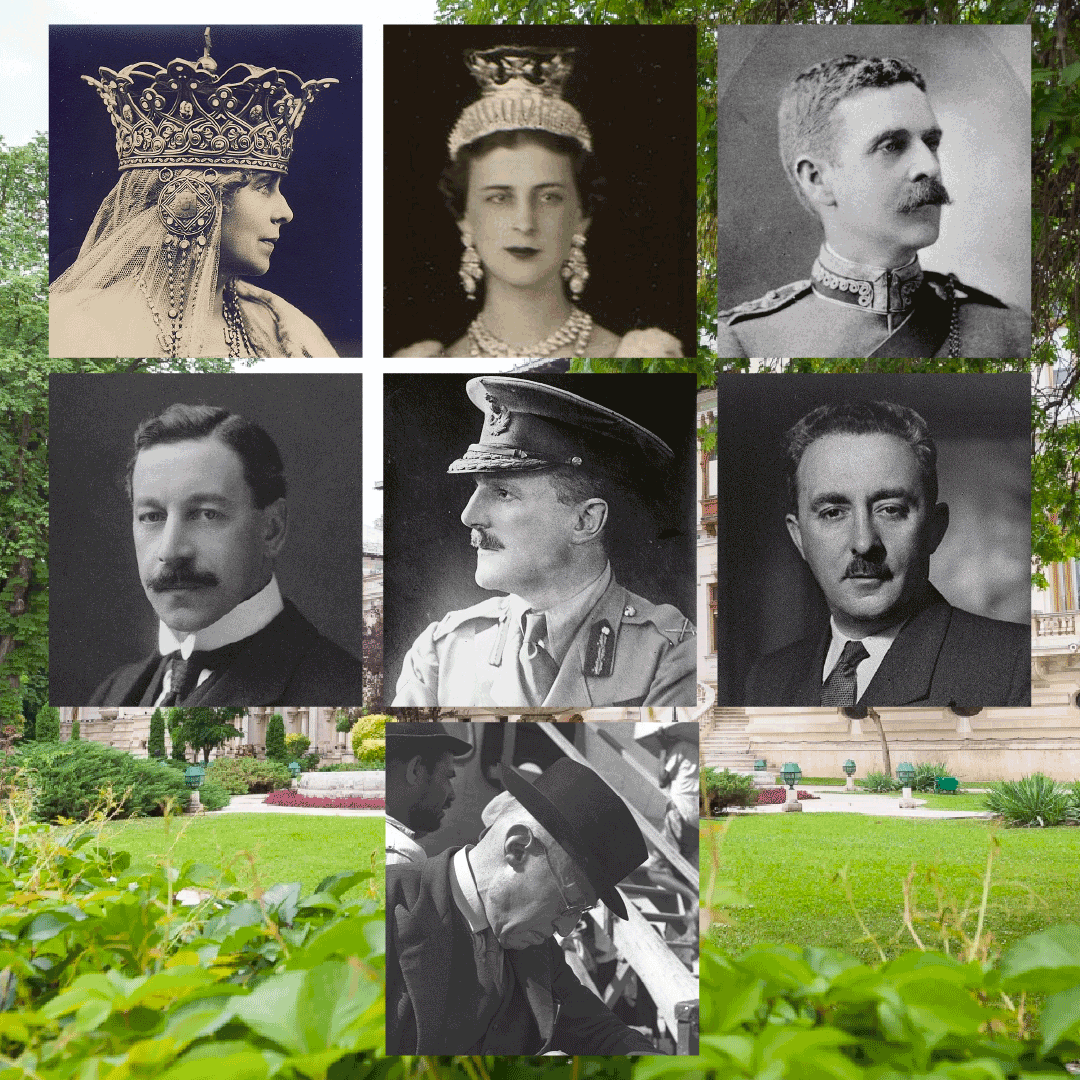
First row left to right: Queen Marie of Romania, Princess Marina of Greece and Lord Lamington. Second row: Lord Herbert Samuel, Sir Ronald Storrs, and Moshe Sharett. Third row: Professor Norman Bentwich. Background image: Cotroceni Palace, the palace of Queen Marie of Romania. Source: President of Romania.
Shoghi Effendi was also in touch with other members of European royalty, not only Queen Marie of Romania, but also Princess Marina of Greece who later became Duchess of Kent, and Princess Kadria of Egypt. His correspondence with them and many prominent personalities such as Lord Lamington, a number of former High Commissioners for Palestine, Orientalists, and university professors, was warm, and Shoghi Effendi often sent them his recently published translations or the latest volume of The Bahá'í World, and expressed his condolences when they lost a loved one, or congratulated them on their marriage or a promotion.
In Haifa, the Guardian also received distinguished guests: Lord and Lady Samuel, Sir Ronald Storrs, a friend of 'Abdu'l-Bahá, Moshe Sharett, a future Prime Minister of Israel, Professor Norman Bentwich, a British barrister and legal academic, and many writers, journalists and notables.

Photo by Timothée Duran on Unsplash.
Rúḥíyyih Khánum spoke beautifully about the Guardian’s sleep:
He wanted to sleep more than he did.
As Shoghi Effendi’s ministry advanced, the burden of his work increased, the problems he faced were greater, the work was more arduous, until he had to read three hours a day every day to keep abreast of what was happening in the Bahá'í world. Shoghi Effendi told Rúḥíyyih Khánum many times:
Oh, if I could just once more sleep the sleep of my youth, if I could once more sleep 10 hours.
SOURCES FOR PART V
Statements by ‘Abdu’l-Bahá referring to the end of His earthly life
Violetta Zein, The Extraordinary Life of ‘Abdu’l-Bahá Part IX: The Ascension of ‘Abdu’l-Bahá (28 November 1921).
A few weeks before His passing: “Cable Shoghi Effendi to return at once”
The Priceless Pearl, Rúḥíyyih Rabbání, Bahá’í Publishing Trust, London, 1969, page 45.
The week before the Ascension of ‘Abdu’l-Bahá
Violetta Zein, The Extraordinary Life of ‘Abdu’l-Bahá Part IX: The Ascension of ‘Abdu’l-Bahá (28 November 1921).
Monday 28 November 1921: The Ascension of ‘Abdu’l-Bahá
Violetta Zein, The Extraordinary Life of ‘Abdu’l-Bahá Part IX: The Ascension of ‘Abdu’l-Bahá (28 November 1921).
29 December 1921: The cablegram
Violetta Zein, The Extraordinary Life of ‘Abdu’l-Bahá Part IX: The Ascension of ‘Abdu’l-Bahá (28 November 1921).
Monday 28 November 1921: How ‘Abdu’l-Bahá’s burial spot was chosen
Violetta Zein, The Extraordinary Life of ‘Abdu’l-Bahá Part IX: The Ascension of ‘Abdu’l-Bahá (28 November 1921).
Condolence messages from around the world
Violetta Zein, The Extraordinary Life of ‘Abdu’l-Bahá Part IX: The Ascension of ‘Abdu’l-Bahá (28 November 1921).
Tuesday 29 November 1921: ‘Abdu’l-Bahá’s funeral
Violetta Zein, The Extraordinary Life of ‘Abdu’l-Bahá Part IX: The Ascension of ‘Abdu’l-Bahá (28 November 1921).
29 November 1921: Shoghi Effendi learns of ‘Abdu’l-Bahá’s passing
The Priceless Pearl, Rúḥíyyih Rabbání, Bahá’í Publishing Trust, London, 1969, page 39.
Riaz Khadem, Prelude to the Guardianship
Adib Taherzadeh, The Covenant of Bahá’u’lláh.
29 November 1921: A letter from Dr. Esslemont
The Priceless Pearl, Rúḥíyyih Rabbání, Bahá’í Publishing Trust, London, 1969, page 40.
1 December 1921: Shoghi Effendi’s state immediately after learning of ‘Abdu’l-Bahá’s Ascension
Prelude to the Guardianship. Riaz Khadem, George Ronald, Oxford, 2014, Kindle Edition, Location 4044.
2/7 December 1921: Shoghi Effendi’s words about the passing of ‘Abdu’l-Bahá
The Priceless Pearl, Rúḥíyyih Rabbání, Bahá’í Publishing Trust, London, 1969, pages 40-41.
5 December 1921: Edward Hall’s moving letter to Shoghi Effendi
Some Bahá’ís to Remember. O. Z. Whitehead, George Ronald, Oxford, 1983, page 65.
7 – 16 December 1921: In London prior to the journey
Prelude to the Guardianship. Riaz Khadem, George Ronald, Oxford, 2014, Kindle Edition, Location 4066.
Bahá’í Library Online chronology: The life of Shoghi Effendi.
16 December 1921: Shoghi Effendi sets sail for the Holy Land
The Priceless Pearl, Rúḥíyyih Rabbání, Bahá’í Publishing Trust, London, 1969, page 42.
29 December 1921: Shoghi Effendi arrives in Haifa
The Priceless Pearl, Rúḥíyyih Rabbání, Bahá’í Publishing Trust, London, 1969, pages 42 and 46.
Dawn Over Mount Hira. Marzieh Gail, George Ronald, 1976, pages 213-214.
Riaz Khadem, Prelude to the Guardianship.
Adib Taherzadeh, The Covenant of Bahá’u’lláh.
1 January 1922: Shoghi Effendi is read ‘Abdu’l-Bahá’s Will and Testament
The Priceless Pearl, Rúḥíyyih Rabbání, Bahá’í Publishing Trust, London, 1969, pages 42-44.
Hasan M. Balyúzí, The Will and Testament of ‘Abdu’l-Bahá.
3 January 1922: Shoghi Effendi struggles with the Will and Testament
Dawn Over Mount Hira. Marzieh Gail, George Ronald, 1976, page 214.
3 January 1922: First Reading of ‘Abdu’l-Bahá’s Will and Testament
The Priceless Pearl, Rúḥíyyih Rabbání, Bahá’í Publishing Trust, London, 1969, pages 46-47.
3 January 1921: After the first reading of the Will and Testament
Dawn Over Mount Hira. Marzieh Gail, George Ronald, 1976, page 214.
6 January 1922: Fortieth Day memorial feast
Shoghi Effendi and Lady Blomfield The Passing of ‘Abdu’l-Bahá (1922).
Shoghi Effendi, God Passes By,
The Priceless Pearl, Rúḥíyyih Rabbání, Bahá’í Publishing Trust, London, 1969, page 47.
Article printed in the Haifa newspaper Annafir (“The Bugle”).
Emogene Hoagg, Letter to Nelly French dated 2 January 1922, published in World Order Volume 6 Issue 2.
Jináb-i-Azíz’u’lláh Azízí, A Crown of Glory;
All sources available in full in David Merrick’s Passing of ‘Abdu’l-Bahá.
6 January 1922: Fortieth Day memorial speeches
The six speeches were published in Annafir (“The Bugle”), a Haifa newspaper, and you can read them in fully downloading the magnificent compilation created by David Merrick, titled Passing of ‘Abdu’l-Bahá.
6 January 1922: Second Reading of ‘Abdu’l-Bahá’s Will and Testament
The Priceless Pearl, Rúḥíyyih Rabbání, Bahá’í Publishing Trust, London, 1969, pages 46-47.
7 January 1922: Third Reading of ‘Abdu’l-Bahá’s Will and Testament
Violetta Zein, The Extraordinary Life of ‘Abdu’l-Bahá Part IX: The Ascension of ‘Abdu’l-Bahá: 7 January 1922: Third Reading of ‘Abdu’l-Bahá’s Will and Testament.
Bahá’í Library Online: Interview of Saichiro Fujita, Sylvia Ioas (1975).
7 January 1922: Provisions of the Will and Testament of ‘Abdu’l-Bahá announced to Persian Bahá’ís
The Priceless Pearl, Rúḥíyyih Rabbání, Bahá’í Publishing Trust, London, 1969, pages 47-48.
16 January 1922: Provisions of the Will and Testament of ‘Abdu’l-Bahá announced to American Bahá’ís
The Priceless Pearl, Rúḥíyyih Rabbání, Bahá’í Publishing Trust, London, 1969, pages 47-48.
The Priceless Pearl, Rúḥíyyih Rabbání, Bahá’í Publishing Trust, London, 1969, pages 33-37 and 48.
Shoghi Effendi: The Range and Power of His Pen, ‘Alí Nakhjávání, Acuto 2006, Casa Editrice Bahá’í, pages 33 and 36-37.
Bahá’í Administration, Part Two: Letters from Shoghi Effendi, Letter 19: 23 February 1924 to the American Bahá’ís.
The Priceless Pearl, Rúḥíyyih Rabbání, Bahá’í Publishing Trust, London, 1969, page 52.
19 January 1922: Shoghi Effendi writes The Passing of ‘Abdu’l-Bahá with Lady Blomfield
Shoghi Effendi and Lady Blomfield, An Account of the Passing of ‘Abdu’l-Bahá, Originally published in 1922 as a separate booklet, then published in The Bahá’í World, 15 (1968-1973), on the occasion of the 50th anniversary of the passing of Abdu’l-Bahá.
Shoghi Effendi: The Range and Power of His Pen, ‘Alí Nakhjávání, Acuto 2006, Casa Editrice Bahá’í, pages 37-41.
Sen McGlinn’s Blog: ‘Abdu’l-Bahá’s Last Tablet to America.
“The Charter of a future world civilization”
God Passes By, Shoghi Effendi.
An “infallible organ for the accomplishment of a Divine Purpose”
The Priceless Pearl, Rúḥíyyih Rabbání, Bahá’í Publishing Trust, London, 1969, pages 42-44.
Hasan M. Balyúzí, The Will and Testament of ‘Abdu’l-Bahá.
Three provisions for the protection of the Covenant in the Will and Testament of ‘Abdu’l-Bahá
Hasan M. Balyúzí, The Will and Testament of ‘Abdu’l-Bahá.
First mention of Shoghi Effendi: Twin Holy Trees and Twin surging seas
‘Abdu’l-Bahá, The Will and Testament of ‘Abdu’l-Bahá.
Analysis: Violetta Zein.
Second mention of Shoghi Effendi: The Sign of God and the Guardian
‘Abdu’l-Bahá, The Will and Testament of ‘Abdu’l-Bahá.
Analysis: Violetta Zein.
Third mention of Shoghi Effendi: Unerring guidance
‘Abdu’l-Bahá, The Will and Testament of ‘Abdu’l-Bahá.
Analysis: Violetta Zein.
Fourth through seventh mentions of Shoghi Effendi: The roles of the Guardian
Eighth mention of Shoghi Effendi: Take the greatest care of Shoghi Effendi
‘Abdu’l-Bahá, The Will and Testament of ‘Abdu’l-Bahá.
Analysis: Violetta Zein.
Ninth mention of Shoghi Effendi: The Center of the Cause
‘Abdu’l-Bahá, The Will and Testament of ‘Abdu’l-Bahá.
Analysis: Violetta Zein.
Covenant-breaking: The principle of light and shadow
The Priceless Pearl, Rúḥíyyih Rabbání, Bahá’í Publishing Trust, London, 1969, page 118.
The Covenant of Bahá’u’lláh, Adib Taherzadeh, George Ronald, Oxford, 1992 Chapter 30: Rebellion in the East.
Four types of Covenant-breaking
The Covenant and Covenant-breaker, Moojan Momen, published in The Bahá’í Encyclopedia (1995).
‘Abdu’l-Bahá’s’ old enemies resurface
The Priceless Pearl, Rúḥíyyih Rabbání, Bahá’í Publishing Trust, London, 1969, page 118.
The Covenant of Bahá’u’lláh, Adib Taherzadeh, George Ronald, Oxford, 1992 Chapter 30: Rebellion in the East.
November 1921 – January 1922: Rumblings of Covenant-breaking
The Priceless Pearl, Rúḥíyyih Rabbání, Bahá’í Publishing Trust, London, 1969, pages 49-50 and 53.
30 January 1922: Covenant-breakers steal the keys to Bahá’u’lláh’s Shrine
The Priceless Pearl, Rúḥíyyih Rabbání, Bahá’í Publishing Trust, London, 1969, pages 53-54.
The Bábí and the Bahá’í Religions, 1844–1944, Some Contemporary western Accounts. Moojan Momen, George Ronald, Oxford, 1981, pages 456-457.
The alembic of the Guardian’s creative mind
The Priceless Pearl, Rúḥíyyih Rabbání, Bahá’í Publishing Trust, London, 1969, page 436.
The Priceless Pearl, Rúḥíyyih Rabbání, Bahá’í Publishing Trust, London, 1969, pages 76-77.
Leroy Ioas: Hand of the Cause of God. Anita Ioas Chapman, George Ronald, 1998, pages 285-287.
The Guardian’s mysterious relationship to God
The Priceless Pearl, Rúḥíyyih Rabbání, Bahá’í Publishing Trust, London, 1969, page 81.
The Guardian as Head of a World Religion
The Priceless Pearl, Rúḥíyyih Rabbání, Bahá’í Publishing Trust, London, 1969, pages 274-275.
The Guardian was not a patriarch
The Priceless Pearl, Rúḥíyyih Rabbání, Bahá’í Publishing Trust, London, 1969, pages 54-55.
The Priceless Pearl, Rúḥíyyih Rabbání, Bahá’í Publishing Trust, London, 1969, pages 50-51.
The Guardian’s interpretation of Bahá’u’lláh’s Writings
The Priceless Pearl, Rúḥíyyih Rabbání, Bahá’í Publishing Trust, London, 1969, page 437.
Shoghi Effendi inspirational translations
The Priceless Pearl, Rúḥíyyih Rabbání, Bahá’í Publishing Trust, London, 1969, page 437.
The Guardian’s precious book of quotations
Transcript of: Amatul’Bahá Rúḥíyyih Khánum’s Address to the Sixth Annual Association for Bahá’í Studies Conference, Canada, 1981, Timestamp: 01:04:31.
Shoghi Effendi as Sole Interpreter of the Bahá’í Holy Writings
The Priceless Pearl, Rúḥíyyih Rabbání, Bahá’í Publishing Trust, London, 1969, page 200.
Remembering Shoghi Effendi as Interpreter, transcript of a talk given by Glenford Mitchell, member of the Universal House of Justice on 27 July 1997, and distributed on a series of two cassette tapes.
Gleanings from the Writings of Bahá’u’lláh, Bahá’u’lláh, Selection LXXXIX.
Shoghi Effendi’s mastery of four languages
Transcript: The Guardian of the Bahá’í Faith, 21 June 1970, Amatul’Bahá Rúḥíyyih Khánum, transcript from a cassette tape published by the Bahá’í Publishing Trust, Timestamp: 00:08:44.
Wikipedia: Shoghi Effendi.
Shoghi Effendi: Translation as interpretation
The Priceless Pearl, Rúḥíyyih Rabbání, Bahá’í Publishing Trust, London, 1969, pages 202-204.
The Will and Testament of ‘Abdu’l-Bahá, ‘Abdu’l-Bahá.
Transcript: The Guardian of the Bahá’í Faith, 21 June 1970, Amatul’Bahá Rúḥíyyih Khánum, transcript from a cassette tape published by the Bahá’í Publishing Trust, Timestamp: 00:08:44.
Shoghi Effendi as Expounder of the Writings
Shoghi Effendi: The Range and Power of His Pen, ‘Alí Nakhjávání, Acuto 2006, Casa Editrice Bahá’í, pages 69-74.
Shoghi Effendi’s meticulousness with the original text
Transcript of: Talk with pioneers in Petionville, Haiti, 3 November 1981, Timestamp: 00:21:17.
Shoghi Effendi’s six unique concepts
Shoghi Effendi: The Range and Power of His Pen, ‘Alí Nakhjávání, Acuto 2006, Casa Editrice Bahá’í, pages 295-296.
Pilgrim notes recorded after the nightly dinner-table talks of the beloved Guardian, Shoghi Effendi 19–28 April 1957, Isobel Sabri.
Bahá’í Library Online: Pilgrims Notes, Marguerite R. Sears (1953).
The vision of Shoghi Effendi : proceedings of the Association for Bahá’í Studies, Ninth Annual Conference, November 2-4, 1984, Ottawa, Canada, Pages 173-174.
Shoghi Effendi’s centrifugal force
Leroy Ioas: Hand of the Cause of God. Anita Ioas Chapman, George Ronald, 1998, page 286.
Transcript of: On Shoghi Effendi: Guardian of the Bahá’í Faith, 21 June 1970, Rúḥíyyih Khánum, Timestamp: 23:22.
Shoghi Effendi’s adamantine energy and efficiency
Conversations with Shoghi Effendi, (1924), May Maxwell, pages 3-4.
Leroy Ioas: Hand of the Cause of God, Anita Ioas Chapman, George Ronald, 1998, page 287-288.
Shoghi Effendi’s bedroom office
Transcript of: Amatul’Bahá Rúḥíyyih Khánum’s concluding address at the First Bahá’í World Congress in London, 1963, Timestamp: 01:28:44.
Transcript: The Guardian of the Bahá’í Faith, 21 June 1970, Amatul’Bahá Rúḥíyyih Khánum, transcript from a cassette tape published by the Bahá’í Publishing Trust, Timestamp: 23:22.
Transcript of: Talk with pioneers in Petionville, Haiti, 3 November 1981, Timestamp: 00:12:35.
Transcript of: Talk with pioneers in Petionville, Haiti, 3 November 1981, Timestamp: 00:04:05.
Shoghi Effendi’s perfectionism and exactitude in all things
The Priceless Pearl, Rúḥíyyih Rabbání, Bahá’í Publishing Trust, London, 1969, pages 87. 88, and 90.
Shoghi Effendi, The Golden Age of the Cause of Bahá’u’lláh, 21 March 1932.
Messages to the Bahá’í World: 1950–1957, Shoghi Effendi, Bahá’í Publishing Trust, Wilmette, Illinois, 1971: Achievements of World Crusade, pages 106-107.
Shoghi Effendi’s lifelong interest in translation and publication of Bahá’í literature
The Priceless Pearl, Rúḥíyyih Rabbání, Bahá’í Publishing Trust, London, 1969, pages 206-209.
Some Bahá’ís to Remember. O. Z. Whitehead, George Ronald, Oxford, 1983, page 214.
Shoghi Effendi’s encouragement to pioneers
The Priceless Pearl, Rúḥíyyih Rabbání, Bahá’í Publishing Trust, London, 1969, page 126.
Personal friendships with royalty and eminent personalities
The Priceless Pearl, Rúḥíyyih Rabbání, Bahá’í Publishing Trust, London, 1969, pages 271-273
Wikipedia: Moshe Sharett.
Wikipedia: Norman Bentwich.
Shoghi Effendi’s (lack of) sleep
Transcript of: Talk with pioneers in Petionville, Haiti, 3 November 1981, Timestamp: 00:14:54.
![]()
 A few weeks before His passing: "Cable Shoghi Effendi to return at once"
A few weeks before His passing: "Cable Shoghi Effendi to return at once"
